How To Get A Cuban Tourist Card or Visa (2024 Update)
Americans traveling to Cuba today are required to get a Cuba Tourist Card—also called a Tourist Visa—in almost all cases. The Cuba Tourist Card is not part of the US travel rules for Cuba, which require you to pick a legal travel category . Instead, it’s a requirement of the Cuban government for all travelers arriving on the island.
It’s an easy formality to take care of, but it is essential. During your trip, be sure to treat your Cuban Tourist Card as you would your passport, you'll need it when you leave to return home.
The Cuba Tourist Card is required by the Cuban government and applies to almost anyone visiting Cuba from abroad. But how do you know which one you need? Where can you get it and how much will it cost?
Read on for up-to-date information on how to get a Cuban Tourist Card in 2024.
Want help planning your Cuba adventure? Get the help of a Cuban local to design an unforgettable itinerary for your trip.

Table of Contents: How To Get A Cuban Tourist Card
Who needs a cuban tourist card, the difference between pink and green tourist cards, where to get the cuba tourist visa, flying from the united states, flying from mexico, canada, and other countries.
- Contacting Your Embassy
- Replacing Your Tourist Card
Other Requirements for Cuba Travel
Locals make planning a trip to cuba easy, more tips for cuba travel in 2024.
Travelers from every country, including the United States, need a Cuban Tourist Card to visit the island. The Cuba Tourist Card allows travelers to remain in Cuba for 30 days , and after arrival can be renewed for an additional 30 days.
The only exceptions are for citizens of Antigua and Barbuda, Barbados, Belarus, Benin, Bosnia, China, Dominica, Grenada, Macedonia, Malaysia, Montenegro, Mongolia, Namibia, Saint Kitts, Saint Lucia, Saint Vincent, Serbia, Singapore, and Vietnam. Travelers from these countries can visit Cuba without a Tourist Card.
Travel to Cuba under the Support for the Cuban People category still requires a Cuba Tourist Card, in addition to compliance with U.S. travel regulations.
Travelers visiting Cuba with a specific purpose, like business activities, family visits, or journalism may need to apply for a specific visa and should contact the closest Cuban embassy or consulate.
There are two different types of Tourist Cards and it’s important to purchase the correct one. Which card a traveler needs depends on the country they are flying to Cuba from (the last airport you stopped at).
The pink Tourist Card is for travelers arriving from the United States, and the green card is for travelers arriving from any other country. The green cards are less expensive than pink cards, which range from $50-$100 USD.
It doesn't matter what country your passport is from or what country you were originally traveling from. Your card color depends on the last place you depart from before arriving in Cuba. You will not be able to board a flight from the US to Cuba with a green Tourist Card .
Confused? Consider messaging a local travel planner for answers to all of your questions.
Travelers can purchase the Cuba Tourist Visa online, or they can get it through their airline, travel agent, tour company, or the Cuban embassy nearest to them.
Buying your Tourist Card online allows you to skip the lines for Tourist Cards at the airport (especially important if you have a connecting flight to Cuba).
Several U.S. airlines now offer direct flights from Miami, Fort Lauderdale, Houston, and New York to Cuba. Travelers flying from the United States to Cuba have several options for where to purchase their Cuba Tourist Visa.
Purchase Online : Travelers can buy the Cuba Visa online and have it conveniently shipped to them ahead of their trip. Some travelers prefer to purchase the visa ahead of time online to avoid any hassles or last-minute issues on departure day.
For travelers arriving from the U.S. who need the pink card, we recommend using Online Tourist Card for the best rates. Online Tourist Card ships cards anywhere in the contiguous US via UPS, and there are many shipping options to choose from.
Purchase Through Your Airline : Most U.S. airlines provide a way for travelers to purchase the Cuba Tourist Card at the airport on the day of departure, during the check-in process, or at the departure gate.
Pricing varies depending on the airline, but typically the cost is less than ordering it online because there are no shipping fees. It’s important to check with your airline to confirm that this option is available.
Through Travel Agents and Tour Operators : If you are using a travel agent or joining an organized tour, your agent or tour operator will often include the Cuba Tourist Visa in the total price. We recommend checking before departure to ensure you have everything you need.
If your final airport before arriving in Cuba is Mexico, Canada, or any other country, you will need to purchase the green Cuba Tourist Card.
Even if you are a U.S. citizen, if your final stop before arriving in Cuba is outside of the United States, you will need the green Tourist Card.
You can purchase the green tourist card online in advance. We recommend using Easy Tourist Card , which ships anywhere in the world via DHL. (There is only one shipping option.)
From Mexico : If you’re flying from Mexico to Cuba then you can buy the green Cuban Tourist Card in Cancun or Mexico City. You can do this near check-in or at the boarding gate. They are typically around $25.
From Canada : If you’re traveling from Canada , your airline may provide the green Tourist Card with your ticket. But make sure to double-check beforehand.
From Panama : The Cuba Tourist Card is available on-site at the Panama City Airport. Copa Airlines, which runs flights from Panama City to Cuba, does not sell Cuba Tourist Cards online. However, it’s easy to purchase online and have it shipped to you in advance using a service like Easy Tourist Card .
By Cruise Ship: Due to the June 2019 Cuba travel restrictions , American cruise ships are no longer allowed to sail to Cuba.
Contacting your Embassy
You can also purchase Cuban Tourist Cards through Cuban Embassies, but many travelers complain about slow response times for email and phone messages. Prices vary by country and embassy, and it’s often more of a hassle than using an online service, purchasing through your airline, or picking up a card at the airport.
Replacing your Tourist Card
If you lose your Cuban Tourist Card, you must replace it before you will be allowed to depart Cuba. When you go to the airport, explain that you have lost your card. You may have to pay for a replacement. Give yourself some extra time, and expect to have to answer questions.
It’s not the end of the world, but you’ll end up wasting a little time dealing with Cuba’s bureaucracy instead of enjoying a day exploring and experiencing Cuba's awesome things to do . To avoid a huge hassle, keep your Tourist Card tucked into your U.S. passport . Also, be sure to carry your passport with you at all times, a Cuba travel safety best practice.
Yes, as an American, you should make sure that when planning a trip to Cuba, you have all of the necessary documents. Here’s what you will need to do:
Pick Your Travel Category - You’ll need to choose a travel category that fits with your planned activities for the trip. Learn about the different categories Americans can use for their travel to Cuba.
Make an Itinerary - Your itinerary serves as proof upon return that you’ve complied with the guidelines of the travel category you chose.
Health Insurance - You are required to purchase Cuban health insurance before entering Cuba, but if you're flying from the U.S., check with your airline to see if the insurance is included in your ticket purchase. If not, you can purchase it beforehand or at the airport when you land, before passing customs.
Health Declaration Form - This form is required to monitor and prevent the spread of COVID-19.
Planning a trip to Cuba can be complicated. At the end of the day, no one knows a place like the people who live there . Local knowledge can always enrich a trip, but it’s especially helpful when there are legal restrictions involved.
Rules for Americans are complicated — and ever-changing — and require extra research. That’s why we set up travelers with Cuban locals — so that they could help travelers through the process.
Plus, travelers then get tons of local advice about what to do, see, eat, and explore once they arrive.
All of this information can be difficult to find online. But when you talk to a local who actually lives in Cuba, they can help guide you through current travel restrictions. Plus, they can answer your questions so you know what your options are, and can make the best decisions for what works for you.
Not only can our Cuban trip planners design a trip that fits your travel style, but they’ll also design one that matches your budget and interests. Plus, they have inside expertise will make navigating travel much easier than if you go it alone.
Ready to have a local plan your trip to Cuba? Connect with a local today to learn more.
Start Planning Now : Don’t dally! Things in Cuba book up fast. As a limited number of businesses advertise online, everyone is looking at the same resources. It is best to have one of our local travel experts arrange your trip. They will use their connections to secure accommodations, restaurants, tours, transportation, and more. You won’t have to worry about the headache of everything filling up before you arrive.
Decide When To Go : Do you want to see a certain festival? Avoid hot temperatures? Miss the rain? Plan your timeline wisely !
Book Your Flight : Spend time researching your flights before booking anything. If you are traveling from the United States, many airlines are now fly directly into Cuba. But there are some benefits to flying in from another country, like Mexico .
Find a Casa Particular : Forget about hotels in Cuba — they are overpriced and dingy. Staying with a local family in a casa particular will provide the most comfortable and immersive trip.
Decide Where You're Going : Havana is intoxicating, but there are plenty of other parts of the island to see. Consider traveling to cities like Trinidad or Viñales. Our Heroes can suggest cities that are worthwhile to visit during your trip.
Start Practicing Spanish : If you don’t speak any Spanish, you may find it difficult to navigate during your trip. If you have time, start brushing up on some basic phrases. It will be much appreciated by locals you meet.
Figure Out Your Money Situation : Cash is king in Cuba. ATMs are difficult to find, and they do not take US cards. Plan on bringing enough cash to last your entire trip — yes, your entire trip. Be safe about where you store it. Don’t keep it in one place, and never carry all of it on you at once.
Get your Tourist Card / Visa : The Cuban government requires you to buy a Cuban Tourist Card to enter Cuba (not actually a visa , though the two words are sometimes used interchangeably). The easiest way to get your Cuban Tourist Card is online in advance through sites like Online Tourist Card , but you can also buy one from your airline (contact your air carrier to find out where an how to purchase).
Prepare to Disconnect : The internet is basically nonexistent in Cuba…and it is better that way! Consider this your digital detox. Let your work and family know you will be mostly out of reach.
Check out our articles on getting a Cuba General License and how you can still travel to Cuba . Then, start preparing for your Cuba adventure .
- Connect With a Local to Plan Your Trip
- You Can Still Travel to Cuba: 2024 Update
- New Cuba Travel Policy Updates
- Independent Havana Tours
Looking for more info?

Cuba Tourist Card: 5 Ways to Get the Cuba Tourist Visa in 2023
If you go to Cuba for tourism, you almost certainly need a Cuba Tourist Card or Tourist Visa. But there is the green and the pink Tourist Visa, which one should you get? What if you are flying from the US?
This article will cover everything you need to know about the Cuba Tourist Visa, including how to apply for the right one, depending on where you are flying from.
What Is the Cuba Tourist Card?
The Cuba Tourist Card (“ Tarjeta del Turista “), also known as Cuba Tourist Visa, temporarily permits foreign nationals to visit Cuba for leisure.
If you travel to Cuba for non-tourism purposes, you will need a regular visa .
Who Needs a Cuba Tourist Card?
Almost everyone traveling to Cuba for tourism needs a Cuba Tourist Card (“Tarjeta del Turista”). The only countries exempt from the Cuba Tourist Card are Antigua and Barbuda, Barbados, Belarus, Benin, Bosnia, China, Dominica, Grenada, Macedonia, Malaysia, Montenegro, Mongolia, Namibia, Saint Kitts, Saint Lucia, Saint Vincent, Serbia, Singapore, and Vietnam.
How Long Can You Stay in Cuba With the Tourist Card?
The Cuba Tourist Card grants visitors a maximum stay of 90 days in Cuba. However, travelers can extend it to 180 days while on the island.
How Long Is the Cuba Tourist Card Valid For?
The Cuba Tourist Card does not expire before entering the country. Therefore, you can travel at any time after getting the visa.
Is the Cuba Tourist Card a Single-Entry or Multiple-Entry Visa?
The Cuba Tourist Card is a single-entry visa.
Pink or Green: What Cuba Tourist Visa Should You Get?
An interesting fact about Cuba is that Cuban Tourist Cards come in pink and green colors. The color depends on the country of origin you’re traveling from.
If you travel directly from the U.S. to Cuba, you’ll need a pink Cuban Tourist Card.
Travelers who fly to the island from a non-U.S. airport must bring a green Cuba Tourist Card. For example, if you are a Canadian flying to Cuba from the Toronto Pearson Airport, you need the green version.
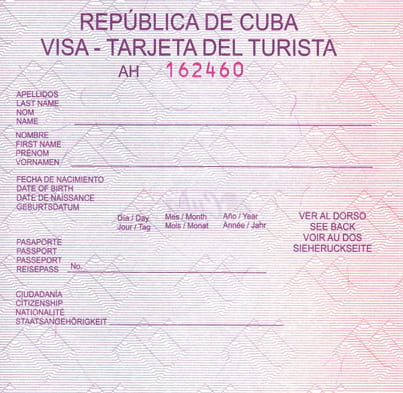
Knowing the distinction between the two colors is easy, but knowing which one to buy can be trickier, especially if taking a multi-leg flight.
Before buying your card online, look at your itinerary and check the last airport you depart from: this airport determines which color card you need.
FYI: pink cards are pricier than green cards because of the rocky relationship between the U.S. and Cuba.
What Cuba Tourist Card Do You Need if Traveling From the U.S.?
If you fly to Cuba from the US, you’ll need a pink version of the Cuba Tourist Visa.
If you fly from a third country, you’ll need the green Tourist Card, even if you’re an American citizen!
Remember that the U.S. government has a few other stipulations for American travelers. For example, before you head to Cuba, you must declare a travel category, like Support for the Cuban People . It sounds tricky, but we promise that our article for Americans traveling to Cuba makes it easy.
What Are the Cuba Tourist Card Requirements?
The application process is easy, and you only need to fulfill a few requirements . Here’s what you need to get a Cuba Tourist Visa:
- Valid passport
- Application form
- Travel itinerary
- Travel health insurance (we recommend Insubuy for comprehensive travel medical insurance for Cuba )
If you only have the first two, you can still get started with your application. You’ll only need your itinerary and travel insurance when you arrive at the airport in Cuba.
How Much Does the Cuba Tourist Card Cost?
You can expect the Cuba Tourist Card to cost anywhere between $35 and $100 U.S. dollars, depending on where you get it. While the card’s price isn’t high, you may have to pay additional airline or shipping fees if you order it online.
Look at the section below for a more detailed price breakdown for each option.
How to Get a Cuba Tourist Card?
You can get the Cuba Tourist Visa online, from your airline or travel agency, or at the Cuban embassy in your country. There’s no right or wrong way, but you’ll probably find that some methods are easier or less expensive than others.
Here are the four ways to get a Cuba Tourist Card for your upcoming trip:
1. Buy it Online
This is by far the easiest way to get your Cuba Tourist Card. Sites like EasyTouristCard make ordering quick and convenient from the comfort of your home.
You can purchase it well ahead of time and have it mailed to your address within a week, so you don’t need to worry about picking it up at the last minute.
You’ll also be able to skip the Tourist Card line at the airport, so you have to stand in one less line before arriving in sunny Cuba.
2. Buy it From Your Airline
Some airlines allow you to purchase the Cuba Tourist Card directly from them. Every airline handles the Tourist Card process differently, so we recommend checking in with your airline of choice to ensure you’re on the same page.
Some airlines have you pick up your tourist card at the gate before boarding your flight, while others hand out the card mid-flight. If you need to pick up your card in person, pad in some extra time if there’s a line.
The cost of the Cuba Tourist Visa is usually bundled in with your flight, but the price itself (shown in USD) varies from airline to airline.
- American Airlines : $85.00 ($50.00 visa price + $35.00 processing fee). Buy your card online or at the gate in Miami before departure.
- Southwest : $75.00 ($50.00 visa price: + $25.00 processing fee). Order online or via phone and pick up your card at the Ft. Lauderdale (FLL) or Tampa (TPA) airport at the check-in or departure gate.
- Delta : $50.00. Purchased at the gate.
- Jet Blue : $50.00. Purchased from JetBlue at gateway airport.
- Air Canada : Passed out during the flight.
- United Airlines : $75.00 ($50 Visa price + $25 processing fee).
3. Buy it From Your Country’s Cuban Embassy or Consulate
This is the hardest way to buy the Cuba Tourist Visa since you have to go in person with the necessary paperwork . Price varies depending on the embassy, but you can expect to pay between $35 and $75 for the card.
4. Buy it from your travel agency
Traveling through an agency or tour company can be extremely helpful since they’ll take care of most of the details for you – as long as they’re reputable. Most travel agencies will bundle the Cuba Tourist Card into their existing Cuba travel packages.
5. Get it upon arrival
Technically, you can get the Cuba Tourist Visa at Havana Airport , or any other Cuban airport, for about $25 (you can’t purchase it in Cuban currency or U.S. dollars). However, you can’t even board your flight in most cases if you don’t have a Cuba Tourist Card.
If somehow you manage to get to Cuba without a card, prepare yourself for the experience of navigating the Cuban infrastructure, which could entail long lines, empty booths, and slow service. This will be a true test of your patience since you won’t be able to leave the airport until your Tourist Card is in hand.
Not Too Complicated, Right?
We hope this guide to getting the Cuba Tourist Card makes the process as smooth and stress-free as possible. Bottom line: if your airline or travel agency didn’t include the Tourist Visa, it’s better to purchase it online. If you are flying from the US, get the pink one; if not, apply for the green one.
Have you recently traveled to Cuba with a Tourist Visa? Tell us about your experience in the comments below!
Essential Travel Logistics For Cuba
Cuban Tourist Card – If your Cuban Tourist Card (a.k.a Cuban Tourist Visa) isn’t bundled into your airline ticket or travel package, buy it only through EasyTouristCard .
Travel Health Insurance – Travel medical insurance is an entry requirement for Cuba, so you can’t skip it. Travelers can get travel health insurance for Cuba via Insubuy . Travel protection benefits such as trip interruption and cancellation, baggage delay insurance, etc., are not required.
Essential Items to Pack – Bring the essential travel necessities that you may not be able to get in Cuba:
- First aid kit
- Hand sanitizer
- Water bottle with filter
- Mosquito repellent
- Pin adapter (for Europeans)
- Travel guide
- Spanish-English phrasebook
- Suggested Reading: The Cubans: Ordinary Lives in Extraordinary Times
Read our complete packing list for Cuba .
Find Accommodations – Find hotels or casas particulares (private accommodations) on Skyscanner , which lists thousands of accommodations available in Cuba.
Book Your Flight – Book cheap flights to Cuba on Skyscanner , our favorite flight search engine to find deals on flights to Cuba.
Share Article:
About the Author
Tour republic.
Tour Republic is a marketplace where you can discover, book, and review the very best experiences Cuba has to offer. We are a team of tourism professionals and journalists who have partnered with Cuban entrepreneurs to provide travel experiences that can transform your trip into a life-changing adventure. We also share our profound love for Cuba through in-depth travel guides, myth-busting articles, and captivating narratives. Whether you want to explore Cuba's wonders or understand its intricacies, our blog posts are your gateway to the heart of this extraordinary country.
Leave a Reply Cancel reply
15 comments.
I want to go to the country
I am burundi citizen residing in saudi arabia, am willing to visit cuba but i can not buy online the cuba tourist card because they show me that the shipment is not possible. can you help me
Hello, About how long does it take for the online green visa to be approved?
i am citizen of Azerbaijan can I travel from US to Cuba or from Cuba to US?
Travelling to Cuba from Ontario, Canada with Air Transat. What is our process for the travel card? January 8, 2022
I am Singaporean. Flying to Havana via Paris. Do I need the tourist card?! Is it true that Singaporean exempted?
Watet bottle with filter ????
Can we not buy bottled water in Cuba??
yes you can, and some of your accommodations will arrange for it in advance. So, you just tell them how many bottles, and you pay your host
If I’m a citizen of the Philippines but traveling from the US, do I need to get a visa of Cuba?
Unfortunately, if you are traveling from the US, you will have to abide by the same rules as US citizens. So, you may consider a different route of travel.
Thank you – such a clear explanation, and the only one that answered every question for me!
I successfully made it to Cuba from Miami after years of doubts.
Can I use either the pink or green card ? I’m entering through jamaica and returning straight to the us
Hi, I have gone to the Cuba embassy in Mexico but surprisingly the visa they gave me is the same with the visa tourist after checking the one on your website here. Please are you sure they will allow me entry and will I still need to buy a cuba tourist card again. Your answer is greatly appreciated
Am a Nigerian tourist in Mexico, will I need a visa or just tourist card to go to Cuba from mexico, please kindly inform
Hi Adebisi, You will probably need a visa to Cuba. I would advise you to contact the Cuban embassy in Mexico to get a more accurate answer.
You might also like

Cuban Currency: The Ultimate Guide for Travelers (2024 Update)
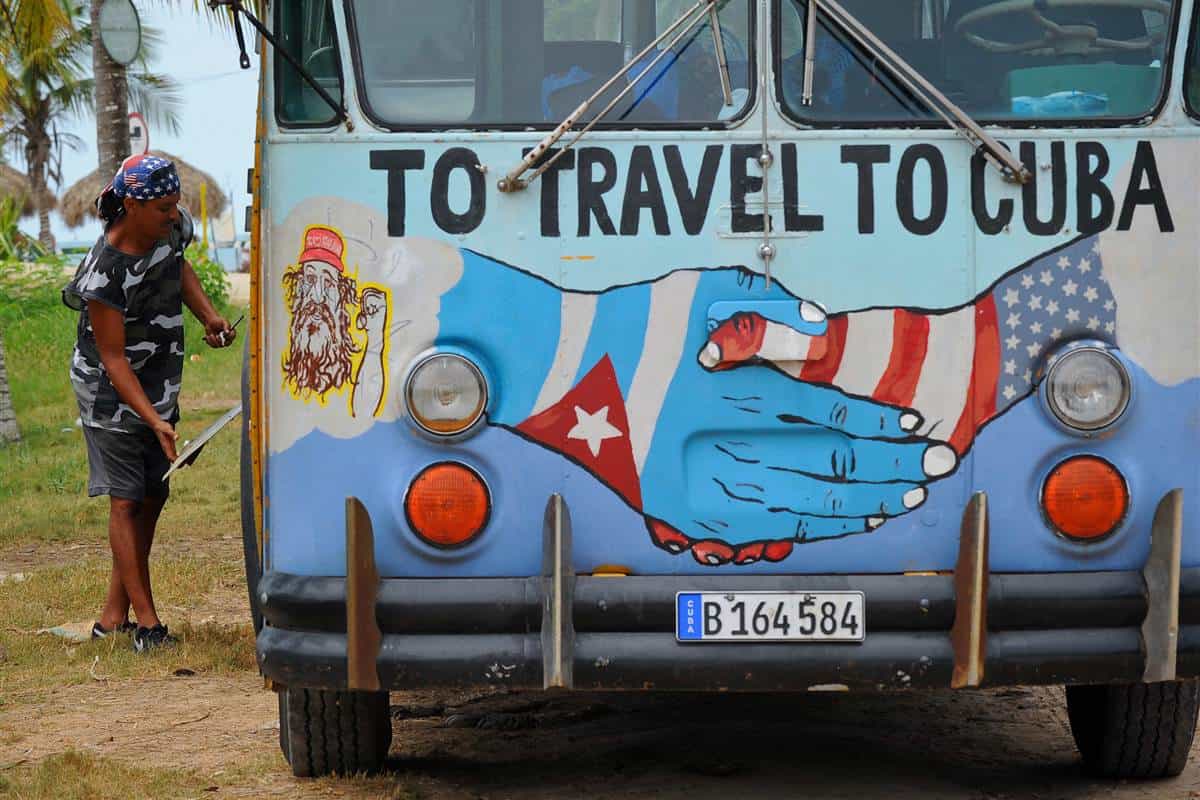
Beyond the Ban: A Guide to Americans Visiting Cuba in 2024.

Sand Fleas and Mosquitoes in Cuba: The Survival Guide (2024)
Other stories, is cuba safe don’t underestimate these 8 safety risks (2024), support for the cuban people: the complete guide for us travelers (2023).

Cuba Visas: Cuba Tourist Visa Guide, From A Pro [2024]
Planning on traveling to Cuba? It’s important to know that almost every visitor to Cuba needs a Cuba tourist visa or a Cuban tourist card , which must be obtained prior to arrival on the island. But how to get it?
As a long-time Cuba visitor turned expat, I’ve navigated the Cuban visa process many times – certainly, more times than I would have liked to! Read on for all the details on the easiest (and cheapest) ways to get your Cuban tourist visa – plus the travelers who need an even more specialized visa to Cuba.
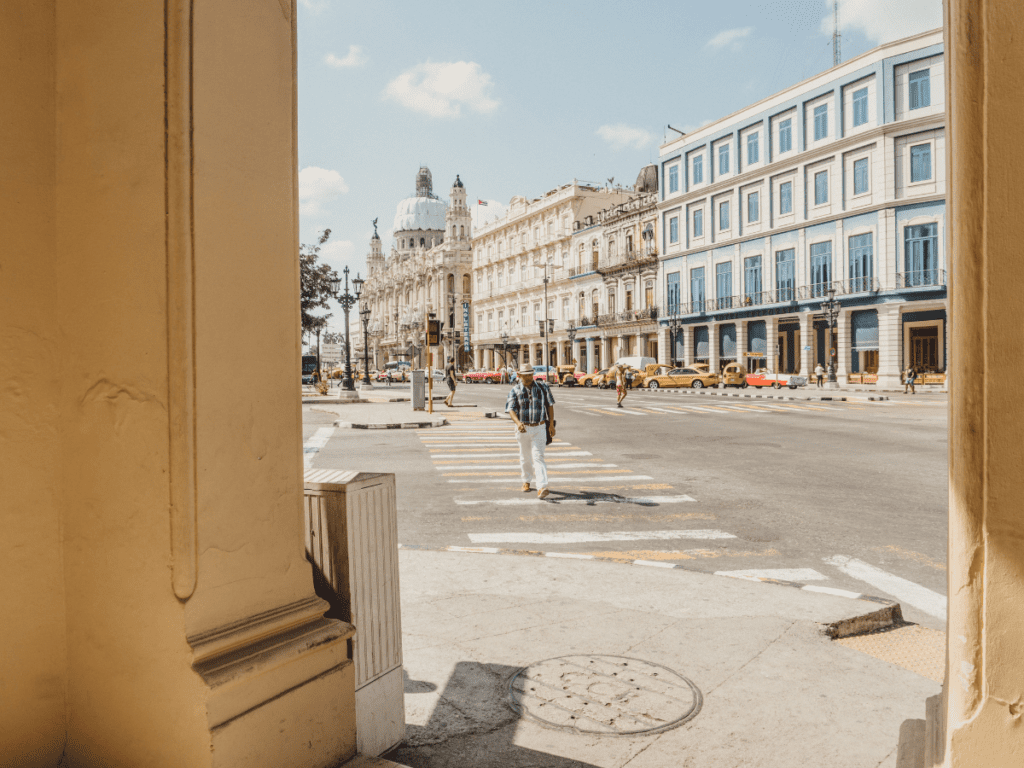
This post contains affiliate links that may reward me monetarily or otherwise when you use them to make qualifying purchases – at no cost to you. As an Amazon Associate, I earn from qualifying purchases. For more information, please read our disclosure policy .
Almost every traveler to Cuba will need to have a Cuban tourist visa when they arrive in the country. Also known as a Cuban tourist card or Cuba travel card , the Cuba tourist visa is something that every non-Cuban traveler will need to present this tourist visa at immigration when entering and exiting Cuba. This is one of the most crucial entry requirements for Cuba .
Only Cuban citizens and travelers with other types of Cuban visas (like student visas, business visas, or permanent residency) will not need to present a Cuban tourist visa upon arrival in Cuba.
Get Your Cuba Visa Online: EasyTouristVisa
Cuba Entry Requirements
A tourist visa to Cuba is one of the entry requirements for visiting the country, but only a very limited few will need to apply for a Cuban visa with their Cuban embassy in advance . Most travelers simply need to purchase their Cuban tourist visas before arriving in Cuba.
Those who must apply for a tourist visa in advance are from a select few Asian and African countries – that list can be found here . Check out this account from an Indian blogger about special requirements and procedures for the Cuba visa requirements for Indian citizens .
Most travelers to Cuba simply need to book their arline tickets to Cuba and purchase their Cuban tourist visa before arriving in Cuba, whether from an online visa service (we have used and recommend EasyTouristVisa !) or directly from their airline.
Guide to Entry Requirements to Cuba
- Entry Requirements to Cuba: The Ultimate Guide
- Cuba’s D’Viajeros Travel Form: A Guide for Travelers
- Travel Insurance to Cuba: Policy Requirements for Entry
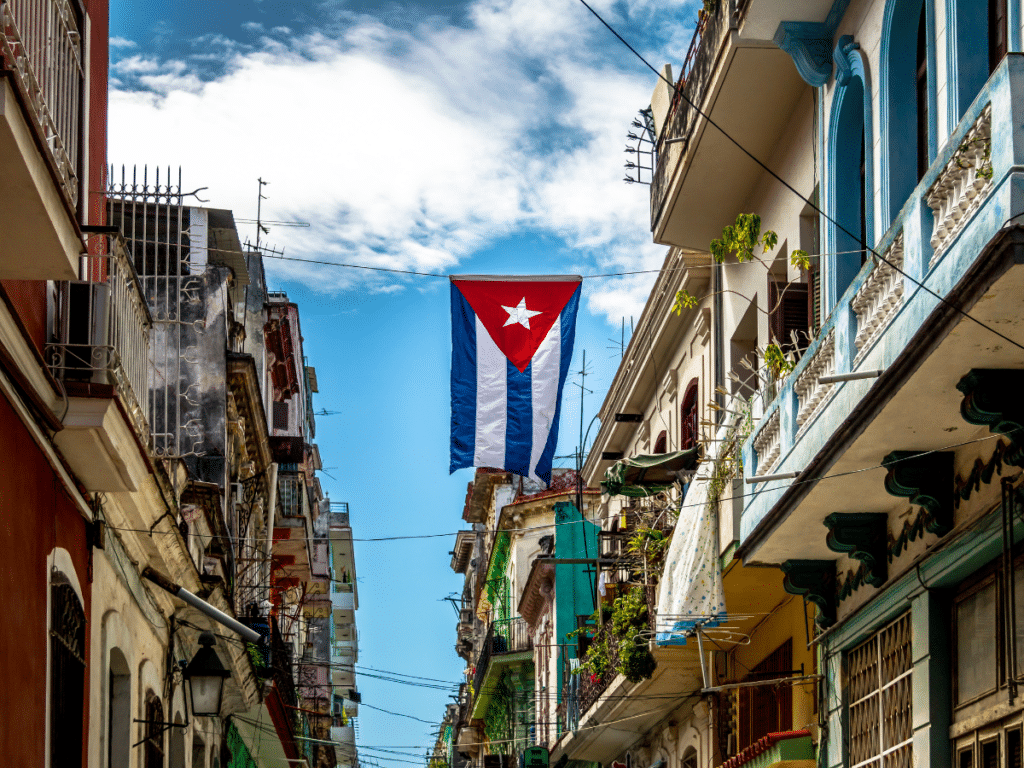
Cuban Tourist Visa
Cuban tourist visas are required for most travelers to Cuba who are not Cuban citizens or don’t have another visa status in Cuba (a student visa, permanent residency, etc). Thankfully, visas to travel to Cuba are very easy to get . Most travelers to Cuba get their Cuba visa before they travel, either online through the EasyTouristVisa website or from their airline, if possible.
Since there is no option for a Cuba visa on arrival, you’ll have to get your visa before you land in the country.
Types of Cuban Tourist Visas
Pink tourist visas.
Pink tourist visas are required for travelers arriving in Cuba on a flight from the United States (regardless of whether the traveler is a citizen of the United States or another country). Pink tourist visas generally cost between $50-110 .
Green Tourist Visas
Green tourist visas are for travelers arriving in Cuba from any country other than the United States. These green tourist visas generally cost between $20-50.
How Much Does a Cuba Tourist Visa Cost
The Cuban tourist visa does not have one fixed price – it varies depending on how and where you get it. The cost of a Cuban tourist visa also varies based on which type of tourist visa for Cuban you’ll need – either a pink tourist visa or a green tourist visa.
If ordering your visa online from EasyTouristVisa , make sure you select the correct visa type – either pink or green – depending on where you’ll be traveling from. Prompts on the website will guide you to make the right choice if you have any questions.
If you will be purchasing your tourist visa from your airline prior to departure, they’ll be prepared to offer you the visa color you’ll need.
Cuba Travel 101
- Currency in Cuba: A Local’s Guide for Travelers
- How to Get Wifi in Cuba [Updated!]
- Is Cuba Safe? Updated Cuba Safety Guide
- Ultimate Cuba Travel Guide – A Local’s Advice for Travelers
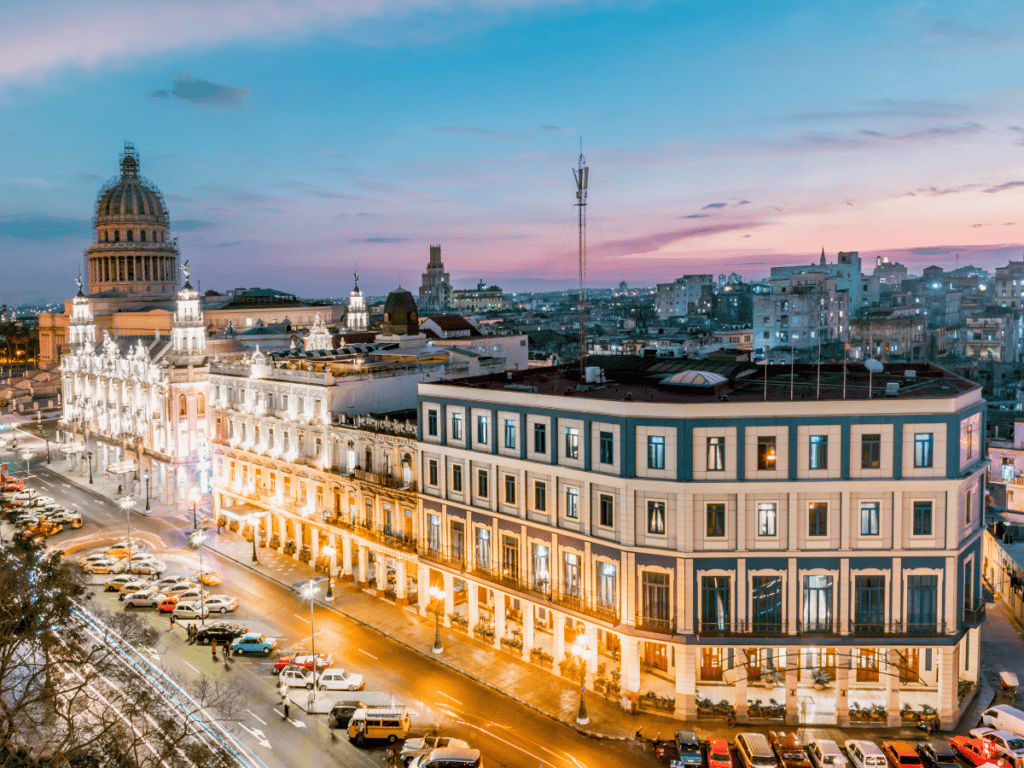
How To Get a Cuban Visa
There are several ways to get the Cuban tourist visa card required before you arrive in Cuba – some more challenging than others. You can get yours one of three ways:
- Get your Cuba visa online from the EasyTouristVisa website
- Get your Cuban visa from your airline
- Get a Cuban embassy visa
Cuba Visa Online
Cuba does not currently offer an online “e-visa” version of the tourist visa. You must have an official, physical tourist visa that you will present in immigration when arriving in the country.
However, you can obtain the Cuban visa online before your trip and have it sent to your home before you travel. I recommend looking into EasyTouristVisa as the most convenient way to get your tourist visa!
Cuba Visa from Airlines
Another way to get a Cuban tourist visa card is directly from the airline that will take you to Cuba. Each airline is responsible for making sure its travelers have a tourist visa before boarding a flight to Cuba, so they’ll generally offer the Cuban tourist visa for sale.
Most airlines offer these tourist visas for sale through their website after booking, and others may offer them prior to boarding the plane.
- American Airlines: The Cuban tourist visa from American Airlines costs $85 if purchased online through the airline prior to your flight or $125 if purchased at the airport during check-in or at your departure gate.
- Delta : The Cuban tourist visa from Delta costs $85 and can be purchased during check-in or at your departure gate.
- Copa Airlines: The Cuban tourist visa from Copa Airlines costs either $20 or $30, depending on your departure airport.
- Air Canada: Air Canada is an airline that includes the cost of the Cuba visa in the price of its ticket. Tourist cards are distributed to passengers in-flight, along with the customs and immigration forms you’ll need when you arrive in Cuba.
Cuba Visa From A Cuban Embassy
A final way to secure your Cuban tourist visa prior to traveling to Cuba is through your nearest Cuban embassy. Visit the website of the Cuban embassy in your country of origin to determine how to apply for a Cuban tourist visa from your embassy.
Generally, I don’t recommend this method of obtaining a Cuban tourist visa. This tends to be a more challenging and time-consuming way to go about what is a straightforward and simple process with EasyTouristVisa or through your airline.
Remember, it’s only required that you pre-apply for a Cuban tourist visa through an embassy if you’re from a small list of Asian and African countries . If you aren’t from one of these countries you’re free to purchase your tourist visa card online or through your airline.
What to Pack for Cuba
Check out our Ultimate Cuba Packing List to help you pack for your trip – we’re sharing exactly what to bring to Cuba and what we never travel without.
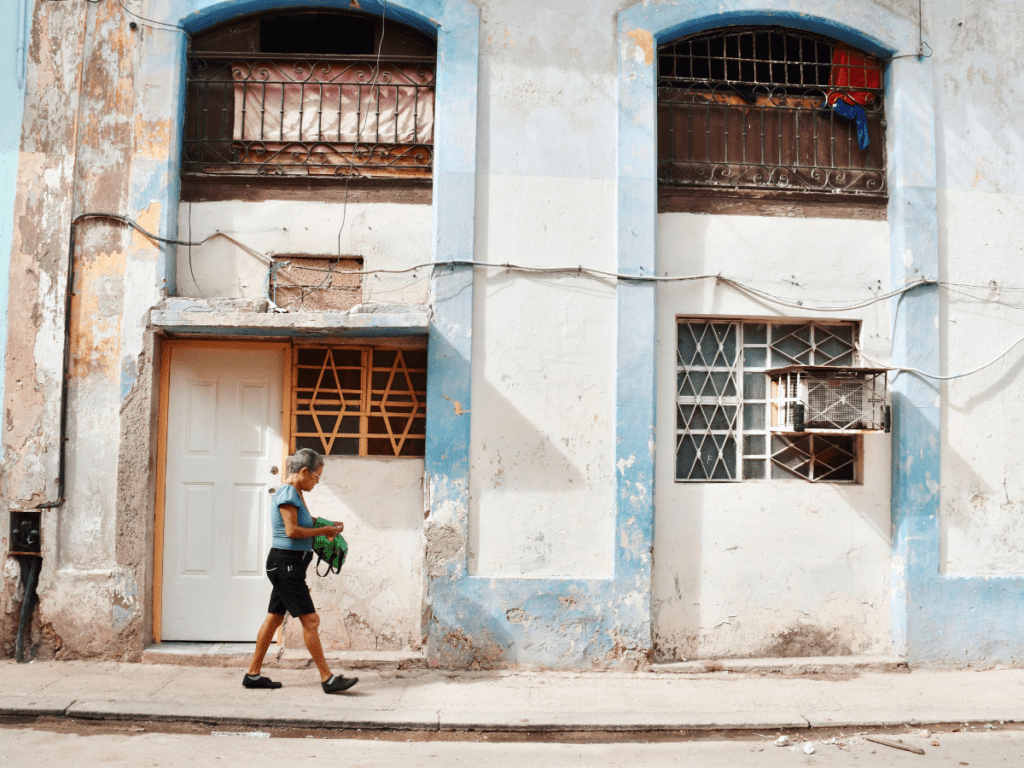
Cuba Visas – FAQ
Do americans need a visa for cuba.
Yes! Citizens of the United States need a tourist visa for Cuba. The government of Cuba requires that ALL non-Cuban visitors to the island have a tourist visa – also known as a tourist card – before arriving. There is no special Cuba visa for Americans; everyone needs the same tourist visa!
Special regulations restricting the travel of citizens of the United States to Cuba come from the government of the United States, not the government of Cuba. In the eyes of the government of Cuba, travelers from the United States are the same as travelers from any other country.
Guides for American Travelers to Cuba
- Can Americans Travel to Cuba?
- Support for the Cuban People Travel: Legal Cuba Travel for Americans
- Best Activ ities for Legal Travel to Cuba
What is the Difference Between a Tourist Visa and a Tourist Card?
What is the difference between the Cuban tourist visa and the Cuban tourist card? There is none – many people refer to the Cuban tourist visa as the Cuban tourist card , or even the Cuban travel card. Confusingly, these different phrases all refer to the same document.
The tourist visa to Cuba and the “Cuban tourist card” are the same thing – no need to worry about the use of multiple different names to describe the same document. One will suffice.
Read More: What is A Tourist Card for Cuba?

Carley Rojas Avila
Carley Rojas Avila is a bilingual travel writer, editor, content marketer, and the founder of the digital travel publications Home to Havana and Explorers Away. She is a serial expat and traveler, having visited 40+ countries and counting. Carley has written for publications like Travel + Leisure, MSN, Associated Press, Weather Channel, Wealth of Geeks, and more. Find her front row at a Bad Bunny concert, befriending street cats, and taste-testing every pizza in Havana.
Choose your language

Getting Around
Entry to Cuba: Visas & Travel Requirements
Traffic by the Capitol building, Havana
Photo: Shutterstock
Stay updated with the latest travel information for your trip to Cuba!
Embarking on a journey to Cuba? Here's your guide to the latest visa requirements and travel protocols. Whether you're coming from North America, Europe, or elsewhere, we've got you covered.
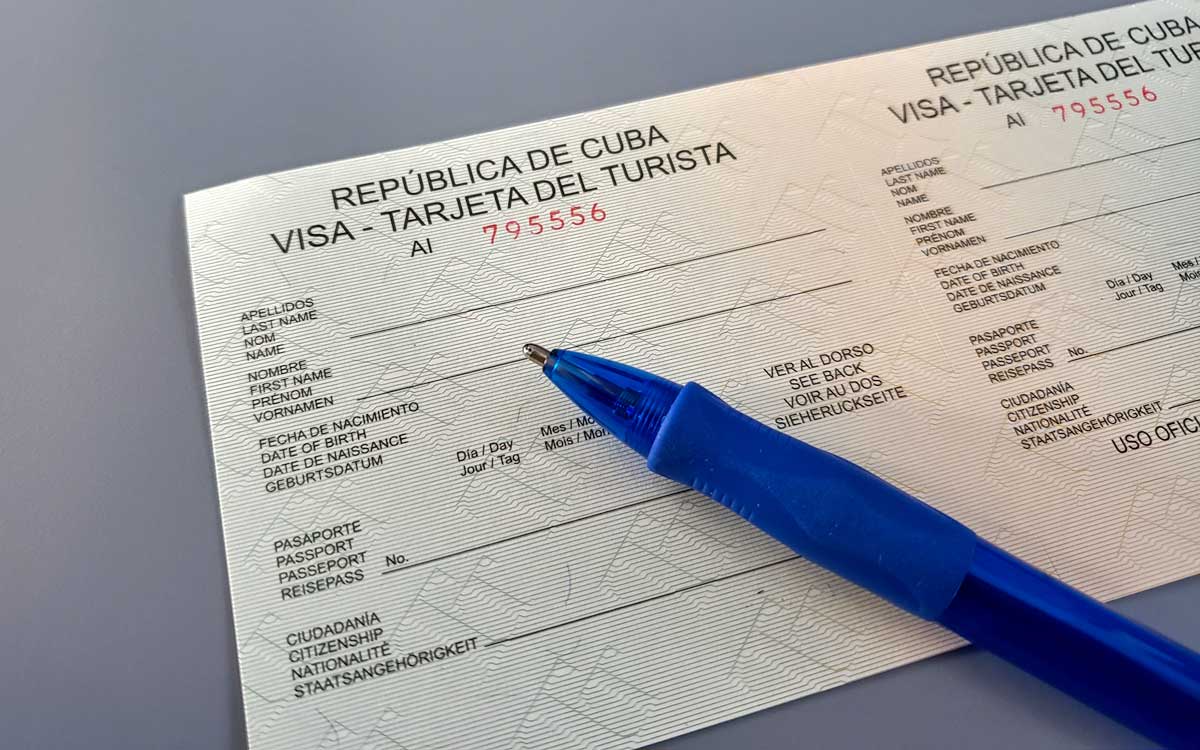
Cuba visa application form
What are the visa and entry requirements to Cuba?
US Citizens
Planning a trip to Cuba as a US citizen? There are special regulations you need to be aware of. While tourism trips to Cuba aren't yet authorized, general licenses have been issued for a variety of travel categories. If you meet the requirements of the general license under which they plan to travel, you won't need to apply for another permit from the OFAC (Office of Foreign Assets Control of the Treasury Department) for your trip.
However, it's important to note that the US Embassy in Havana and the State Department in Washington D.C do not process visa applications for trips to Cuba. If you need to apply for a visa or have any questions regarding your specific case, you should contact the Cuban Embassy in Washington D.C.
And remember, certain activities may not be allowed, so it's best to check with the US embassy for information on organizations or businesses in Cuba that U.S. citizens are not allowed to engage with due to economic sanctions or other legal restrictions.
Canadian Citizens
As a Canadian citizen, you'll need a valid passport for the duration of your stay in Cuba. Make sure your passport's expiration date isn't near to avoid any travel hiccups. Depending on your trip's purpose, you may need different types of visas. If you're traveling as a tourist, you'll need a tourist visa, which can be obtained from tour operators, airlines, or a Cuban government office in Canada.
European Citizens
If you're a European citizen planning to travel to Cuba, remember that visa protocols can vary depending on your country of residence. For most European citizens, a valid passport is required during your stay in Cuba. Some countries, like Spain, require the passport to be valid for at least 6 months.
It's also important to note that if you plan to travel to the United States after visiting Cuba, you'll need a visa. This is because the electronic system for travel authorization (ESTA) is not sufficient for those who have traveled to Cuba before. This visa must be obtained at the Consulate General of the US Embassy in your place of residence.
Given the varying requirements, it's a good idea to contact your tour operator or travel agency to understand the specific visa requirements for your travel.
Latin American Citizens
For Latin American citizens, a valid passport is required during your stay in Cuba. You'll also need to obtain a tourist visa or tourist card for your trip. This can be processed at tourism agencies or airlines, which usually handle its issuance.
The visa is generally issued for about 90 days and can then be extended. It's also important to note that you should have travel insurance with medical coverage.
Visa Costs: What to Expect
Visa costs can vary depending on where it's issued. Generally, prices range between $20 and $80. If you apply online, additional charges may apply, and prices can range from $110 to $150.
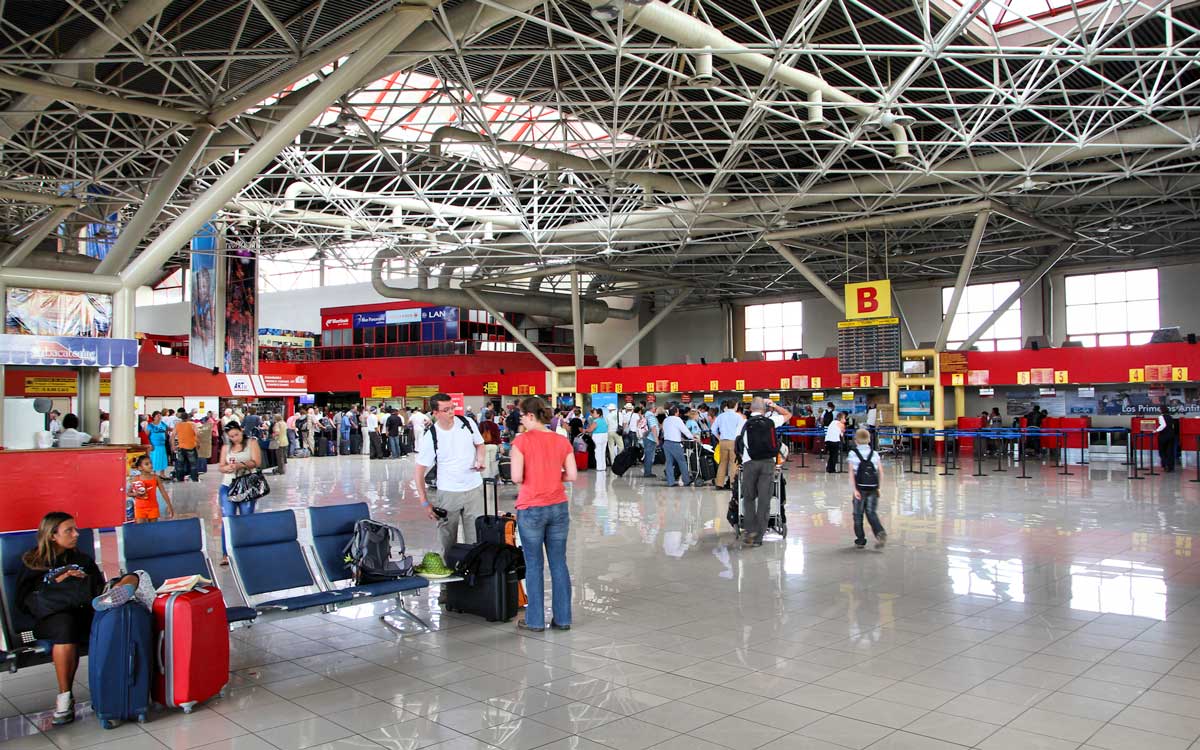
Jose Marti International Airport in Havana
What items can I bring to Cuba?
When packing for your trip to Cuba, you can bring personal effects, including personal phones and computers, free of charge. The range of objects you can bring to Cuba is quite wide, from musical instruments to televisions. However, some items may be subject to charges depending on Customs regulations.
Some items can be brought into the country without having to pay any import taxes. These include used personal objects, art and literature books, music discs, manufactured pharmaceutical products, and wheelchairs, among others.
However, it's crucial to be aware of prohibited items. While some of these, like explosives, drugs and narcotics, and blood derivatives, may seem obvious, others might surprise you. For instance, literature, articles or objects that are considered obscene, pornographic or that attack the general interests of the nation are also prohibited.
If you attempt to bring into the country articles that are not allowed for import, the General Customs of Cuba can exercise administrative sanctions. This means that Customs can seize those imported articles whose entry is prohibited in Cuba, as well as products that have been entered with a fraudulent declaration.
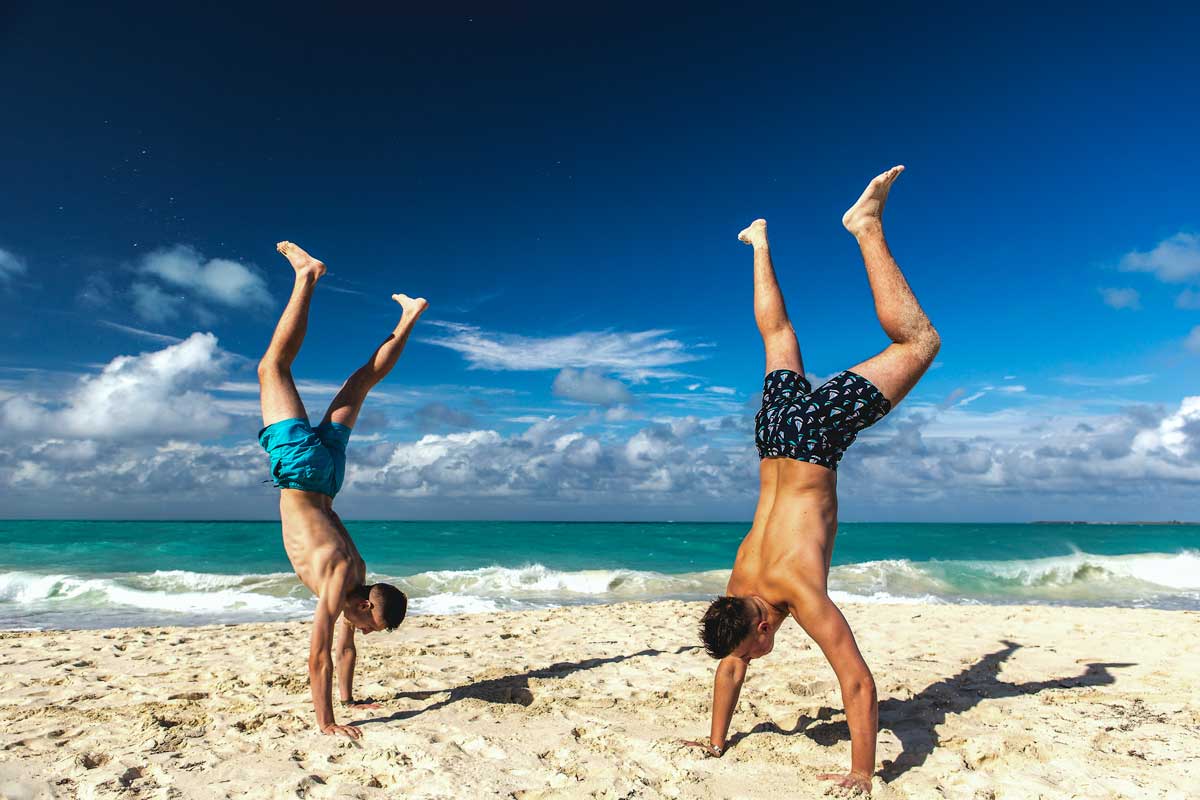
Travelers on a beach in Varadero
Photo: Unsplash
Health and Vaccinations
Before you embark on your journey to Cuba, it's important to ensure you're up to date with routine vaccines. This includes vaccines against chickenpox, tetanus, influenza, rubella, and polio. In the current climate, being vaccinated against COVID-19 is also essential.
Additionally, consider getting vaccinated against Hepatitis A and Hepatitis B. If your trip to Cuba includes exploring nature or venturing into rural areas away from the city center for activities such as outdoor camping, the rabies vaccine is also recommended. Travelers are also advised to consider the typhus vaccine.
Can I bring my pet to Cuba?
If you're planning to bring your pet to Cuba, there are a few requirements you need to meet. Make sure your pet has the necessary vaccines and an official health certificate. You'll also need to request a travel certificate for your pet from the Consulate or Embassy of Cuba in your country.
Written by Teresita Padrón .
Published July 2023.
Explore Top Destinations in Cuba
Explore varahicacos reserve in varadero.
Indulge in the landscape of Cuba at Varahicacos Ecological Reserve,
Five of the Most Instagrammable Cafes in Havana
Havana is full of gems to start your morning on
Castillo del Morro: A Historical Fortress in Havana
Learn about the History of Cuba in the bay of
Dance to Your Own Beat at Havana World Music 2022
Havana World Music: Are you ready to break beyond the
Where to Drink in Havana: Our Essential List of the Best Bars
Explore our essential list of the best bars in Cuba,
Six of Havana’s Coolest Independent Hotels
Explore the best hotels in Havana through our curated list,
See Cuban Nature Up-close at Sierra Del Rosario
Reconnect with nature at Cuba's Sierra del Rosario nature reserve.
Best Spots for Fishing Around Cuba
Largely untouched and diverse, Cuba is one of the most
The Cuban Cigar: Everything You’ll need to know
Learn about the curious and mysterious history of the Cuban
Marabana – Havana’s Annual Marathon
The Marabana, Havana’s annual marathon, is a unique opportunity to
Subscribe to our newsletter
Get more travel inspiration, tips and exclusive offers sent straight to your inbox
I would like to get Visit Cuba newsletters in my inbox
Paradise for Your Inbox

Update April 12, 2024
Information for u.s. citizens in the middle east.
- Travel Advisories |
- Contact Us |
- MyTravelGov |
Find U.S. Embassies & Consulates
Travel.state.gov, congressional liaison, special issuance agency, u.s. passports, international travel, intercountry adoption, international parental child abduction, records and authentications, popular links, travel advisories, mytravelgov, stay connected, legal resources, legal information, info for u.s. law enforcement, replace or certify documents.
Before You Go
Learn About Your Destination
While Abroad
Emergencies
Share this page:
Travel Advisory January 5, 2024
Cuba - level 2: exercise increased caution.
Reissued with updates to crime information.
Exercise increased caution in Cuba due to crime .
Country Summary: Petty crime is a threat for tourists in Cuba. Also, violent crime, including armed robbery and homicide, sometimes occurs in Cuba.
Travel outside of the Havana area for U.S. Embassy employees requires a special notification process which may affect the Embassy’s ability to provide emergency assistance to U.S. citizens in Cuba.
Read the country information page for additional information on travel to Cuba.
If you decide to travel to Cuba:
- Be aware of your surroundings.
- Do not physically resist any robbery attempt.
- Do not display signs of wealth, such as wearing expensive watches or jewelry.
- Enroll in the Smart Traveler Enrollment Program (STEP) to receive Alerts and make it easier to locate you in an emergency.
U.S. citizens should always exercise caution when traveling abroad:
- Follow the Department of State on Facebook and Twitter .
- Review the Country Security Report for Cuba.
- Prepare a contingency plan for emergency situations. Review the Traveler’s Checklist .
Embassy Messages
View Alerts and Messages Archive
Quick Facts
Must have six months validity at the time of entry.
Two pages are required for entry/exit stamps.
Yes. Travel to Cuba for tourist activities remains prohibited by statute. See 31 C.F.R 515.560 and OFAC's Frequently Asked Questions .
None. See CDC for recommendations.
U.S. credit and debit cards do not work in Cuba. You should bring U.S. dollars or Euros to Cuba and exchange them for Cuban Pesos (CUP) at authorized banks, CADECA offices, airports or hotels. Travelers should confirm alternative payment options before traveling, as policies concerning the use of U.S. dollars in Cuba are subject to change. The Cuban government requires that travelers declare cash amounts over the equivalent of 5,000 USD.
When departing Cuba, we advise U.S. travelers to spend or exchange CUP to a foreign currency well before reaching airport security checkpoints. Currency exchange houses in the departure area at airports are currently closed and Cuban pesos are not internationally convertible outside of Cuba.. International airlines flying to the United States include departure fees and taxes in the price of airline tickets. U.S. dollars are not accepted for payment of any additional products purchased at the airport. Under Cuban law, travelers may export up to the equivalent of 5,000 USD out of the country. Anyone wishing to depart Cuba with more than this amount of cash must demonstrate evidence that the currency was acquired legitimately from a Cuban bank.
Embassies and Consulates
U.S. Embassy Calzada between L and M Streets, Vedado, Havana, Cuba Telephone: + (53) (7) 839-4100 (Monday- Friday 0830-1630, except holidays) Emergency after-hours telephone: + (53) (7) 839-4100 and dial 1 to speak with the emergency operator Fax: + (53) (7) 839-4247 Website: https:cu.usembassy.gov
Email: [email protected] (for concerns with U.S. citizens)
Destination Description
Learn about the U.S. relationship to countries around the world.
Entry, Exit and Visa Requirements
Travel to Cuba from or transiting through the United States by persons under U.S. jurisdiction (defined as [BE1] U.S. citizens located anywhere, and anyone located in the United States regardless of citizenship and nationality) , is regulated by the Office of Foreign Assets Control (OFAC) of the U.S. Department of the Treasury. All travelers falling under U.S. jurisdiction must comply with these regulations. Individuals seeking to travel to Cuba are not required to obtain licenses from OFAC if their travel is covered under the 12 travel categories authorized by a general OFAC license. If travel is not covered by a general license, you must seek OFAC authorization in the form of a specific license . Travelers who fail to comply with regulations may face penalties and criminal prosecution. For travel-specific questions, please see 31 C.F.R. 515.560 and OFAC’s Frequently Asked Questions .
Visit the Embassy of Cuba website for the most current visa information.
Cuba requires visitors to have non-U.S. medical insurance, which is usually included in airline ticket prices on flights originating in the United States. If you do not have insurance, it can be purchased upon arrival to Cuba at an airport kiosk. Asistur Medical Insurance is the official company that airlines contract. Please confirm your coverage with your airline prior to arrival in Cuba and seek additional medical insurance if needed.
Cuba does not recognize the U.S. citizenship of Cuban-born U.S. citizens who maintain residency status in Cuba. The Cuban government requires Cuban dual nationals to enter and depart Cuba using Cuban passports. Cuban-born U.S. citizens who maintain their residency status in Cuba will be treated as Cuban citizens and may be subject to Cuban restrictions and legal obligations.
Some HIV/AIDS entry restrictions exist for visitors to and foreign residents of Cuba. Foreign students on scholarships are required to test for HIV/AIDS. Please verify this information with the Embassy of Cuba before you travel.
Information about dual nationality , the prevention of international child abduction , and customs regulations can be found on our websites.
Cuban Requirements for Authorized Travelers: Attempts to enter or exit Cuba illegally, or to aid the irregular exit of Cuban nationals or other persons, are prohibited. Entering Cuban territory, territorial waters, or airspace without prior authorization from the Cuban government may result in arrest. Immigration violators are subject to prison terms ranging from four to thirty years.
Temporary Sojourn License: Most aircraft and maritime vessels on temporary sojourn to Cuba are no longer eligible for an Aircraft, Vessels, and Spacecraft (AVS) License Exception. See 15 C.F.R. § 740.15. If you are planning to enter Cuba with a U.S. or foreign-registered aircraft or maritime vessel on temporary sojourn, you must meet the criteria set forth in 15 C.F.R. § 740.15. Please see the U.S. Department of Commerce’s Bureau of Industry and Security website for additional information.
In addition, a vessel of the United States, as defined in 33 C.F.R. §107.200, may not enter Cuban territorial waters without advance permission from the U.S. Coast Guard. The U.S. Coast Guard provides permission information at (305) 415-6920.
Safety and Security
The security environment in Cuba is relatively stable and characterized by a strong military and police presence. Demonstrations are infrequent but can draw violent responses from government forces. Even demonstrations intended to be peaceful can turn confrontational without warning. Avoid demonstrations and maintain security awareness at all times. Demonstration Alerts are posted on the Embassy’s website . Review the Cuba Travel Advisory .
The Cuban government has detained U.S. citizens suspected of engaging in activities perceived to undermine state security. The Cuban government may detain individuals for activities that would not be considered criminal or offensive in the United States.
Crime: With the recent influx of travelers, there has been an increase in the number of property crimes. Crimes of opportunity, such as pick pocketing, purse snatchings, and car break-ins, are on the rise. Exercise vigilance everywhere . Do not display large amounts of cash. Do not leave your valuables unattended. Carry money in your front pockets, hold your purse and cellular phone securely and be mindful of purses or bags when dining out.
- Do not leave a beverage unattended or accept beverages from persons unknown to you.
- Locations such as Habana Vieja, Playas del Este, Varadero, and other attractions tend to have a higher incidence of property crime than other parts of Cuba.
- Be wary of misdirection schemes where someone attempts to gain your attention while another comes from behind to steal your purse, wallet, or other valuable items.
- If confronted by criminals, do not resist, try to remain calm, clearly display your hands and do not make any sudden moves that could be interpreted as resistance.
- Carry a cell phone with Cuban cellular service for emergency communications and travel in groups if possible.
- Be aware of your surroundings, especially at night or when traveling in an unfamiliar area.
- While in your car, place valuables out of sight or in a locked trunk. When unattended, avoid leaving items in the car, especially on the seat or in plain view.
- Only use marked taxis.
- Carry a copy of your passport and secure the original.
- Beware of scam artists, who may speak English and appear friendly.
- When exchanging currency, use the state-run offices known as CADECAs or official banks.
International Financial Scams: See the Department of State and the FBI pages for information.
Victims of Crime: We strongly urge U.S. citizen victims of sexual assault to contact the U.S. Embassy for assistance. Report crimes to the local police by dialing 106 and contact the U.S. Embassy at +53 7839-4100. Remember that local authorities are responsible for investigating and prosecuting crimes.
See our webpage on help for U.S. victims of crime overseas .
We can:
- help you find medical care
- assist you in reporting a crime to the police
- contact relatives or friends with your written consent
- provide general information regarding the victim’s role during the local investigation and following its conclusion
- provide a list of local attorneys
- provide information on victim’s compensation programs in the U.S.
- provide an emergency loan for repatriation to the United States and/or limited medical support in cases of destitution
- help you find accommodation and arrange flights home
- replace a stolen or lost passport
Domestic Violence: U.S. citizen victims of domestic violence are strongly encouraged to contact the Embassy for assistance.
Tourism: The tourism industry is unevenly regulated, and safety inspections for equipment and facilities do not commonly occur. Hazardous areas/activities are not always identified with appropriate signage, and staff may not be trained or certified either by the host government or by recognized authorities in the field. In the event of an injury, even basic medical treatment is typically available only in/near major cities. First responders are generally unable to access areas outside of major cities and to provide urgent medical treatment. U.S. citizens should maintain health insurance in Cuba. If stays exceed 30 days, [CM1] U.S. citizens should purchase medical insurance when they process their visa extensions.
Local Laws & Special Circumstances
Criminal Penalties: You are subject to local laws. If you violate local laws, even unknowingly, you may be expelled, arrested, or imprisoned. Individuals establishing a business or practicing a profession that requires additional permits or licensing should seek information from the competent local authorities, prior to practicing or operating a business.
Furthermore, some laws are also prosecutable in the United States, regardless of local law. For examples, see our website on crimes against minors abroad and the Department of Justice website.
Arrest Notification: If you are arrested or detained, ask police or prison officials to notify the U.S. Embassy immediately. See our webpage for further information.
Cuban penalties for the following are particularly severe:
- Possession, use, or trafficking of illegal drugs.
- Suspicion of assisting Cubans to leave the country illegally.
- Drivers involved in accidents that result in injury or death, regardless of fault.
- Importing weapons or ammunition.
- Photographing military or police installations or personnel, or harbor, rail, or airport facilities.
- Crimes against minors.
The Government of Cuba does not recognize the U.S. citizenship of Cuban-born U.S. citizens who maintain residency in Cuba and may not allow U.S. consular access to Cuban-American prisoners.
Telecommunications: Many U.S. mobile service carriers provide roaming services in Cuba. Your U.S. mobile phone will work in Cuba if your mobile phone is capable of roaming in Cuba and your mobile service provider has an international roaming agreement with ETECSA, Cuba's state-owned telecommunications provider. Currently AT&T, Sprint, Verizon, and T-Mobile have roaming agreements with ETECSA. Wi-Fi is often slow and unreliable. Be sure to confirm your carrier’s coverage before traveling.
SIM cards with a data plan can be purchased at Havana-José Martí International Airport (HAV) and local ETESCA telecommunications offices. To ensure family and friends can reach you in Cuba, check with your mobile provider about roaming options and cost or purchase a Cuban SIM card. See the FCC Travel FAQs for more information.
Cuba-related Travel Transactions: Only persons whose travel falls into the 12 OFAC approved travel categories or who have received a specific license from OFAC are authorized by the U.S. Department of the Treasury to travel to, from, or within Cuba. Direct financial transactions with certain entities and sub-entities under the control of, or acting for or on behalf of, the Cuban military, intelligence, or security services are also generally prohibited. For more information see the Department of State’s Cuba Restricted List . Additionally, lodging, paying for lodging, or making reservations on behalf of others to lodge, at certain accommodations in Cuba are prohibited; for a full list of such accommodations, see the Cuba Prohibited Accommodations List . For more information about licenses, visit OFAC’s Cuba Sanctions website . Additionally, lodging, paying for lodging, or making reservations on behalf of others to lodge, at certain accommodations in Cuba are prohibited; for a full list of such accommodations, see the Cuba Prohibited Accommodations List . For more information about licenses, visit OFAC’s Cuba Sanctions website .
Licenses for Remittances: In June 2022, OFAC published updated Cuba-related regulations . The new regulations eliminated a cap on remittances to family members in Cuba, and authorized remittances to non-family recipients as well. Certain Prohibited Officials of the Government of Cuba , Prohibited Members of the Cuban Communist Party , and the close relatives of these two groups, are not eligible to receive remittances. For information on remittance authorizations, see OFAC’s Cuba Sanctions website .
What May Be Brought Back From Cuba: Importation of Cuban merchandise for commercial purposes is restricted, with very limited exceptions. Certain imports of goods produced by independent Cuban entrepreneurs are authorized, as set forth on the Department of State’s Section 515.582 List (see 31 C.F.R 515.582). There are no limits on the import or export of informational materials. For more information related to imports, including merchandise entering the United States for personal use as accompanied baggage, please see the CBP Public Notice .
Cuban law requires foreigners to obtain authorization to remove souvenir paintings and sculptures out of Cuba. Most authorized points of sale, such as galleries and art studios, should be familiar with this process and should provide the proper documentation at the time of purchase. You can also apply for an export permit via the Cuban Fund of Cultural Assets. Travelers without a valid export permit may have their items confiscated at the port of departure. The U.S. Embassy cannot assist in these cases. For more information, please contact the embassy of Cuba .
Travelers may purchase alcohol and tobacco products while in Cuba for personal consumption in Cuba, but may not enter the United States with alcohol and/or tobacco products acquired in Cuba. Persons subject to United States jurisdiction may purchase or acquire Cuban-origin merchandise for personal consumption, including alcohol and tobacco products, while in a third country, but may not import such products into the United States. For a complete description of what this general license authorizes and the restrictions that apply, see 31 CFR § 515.585(c) and (d).
Storm Season: Tropical storms and hurricanes between May and November can produce heavy winds and rain. See our page on disaster and crisis preparedness for more information.
Faith-Based Travelers: See the following webpages for details:
- Faith-Based Travel Information
- International Religious Freedom Report – see country reports
- Human Rights Report – see country reports
- Best Practices for Volunteering Abroad
LGBTI Travelers: There are no legal restrictions on same-sex sexual relations or the organization of LGBTI events in Cuba, and on September 26, 2022 Cubans passed the referendum legalizing same sex marriage.
See our LGBTI Travel Information page and section 6 of our Human Rights report for further details.
Travelers Who Require Accessibility Assistance . Individuals with mobility issues are likely to find accessibility difficult . Few facilities or services are available, and information is limited. Most roads and sidewalks are poorly maintained.
Students: See our Students Abroad page and FBI travel tips .
Women Travelers: See our travel tips for Women Travelers .
Currency Restrictions: Be advised that policies concerning the use and convertibility of U.S. dollars in Cuba are subject to change. Obtaining U.S. dollar cash is nearly impossible through official channels. The Cuban Central Bank prohibits certain U.S. dollar cash transactions, including conversion of U.S. dollars to Cuban pesos, the use of U.S. dollars for cash payments, including in government-run establishments such as hotels and restaurants, and the purchase of pre-paid debit cards.. U.S.-issued credit and debit cards do not work in Cuba. Travelers should bring sufficient cash for the duration of their trip, and consider bringing multiple currencies, such as Euros.
For emergency services in Cuba, dial:
- 104 for an ambulance or contact the nearest hospital directly
- 105 for fire
- 106 for police
Ambulance services are
- not present throughout the country or are unreliable in most areas
- not equipped with state-of-the-art medical equipment
- not staffed with trained paramedics and often have little or no medical equipment
Injured or seriously ill travelers may prefer to take a taxi or private vehicle to the nearest major hospital rather than wait for an ambulance.
We do not pay medical bills. Be aware that U.S. Medicare/Medicaid does not apply overseas. Hospitals and doctors in Cuba do not accept U.S. health insurance. Most hospitals require payment up front before services are rendered.
Medical Insurance: Ensure your airline ticket includes health insurance. Cuba requires all U.S. airlines departing the United States to pay for health insurance for each passenger. The health insurance from airlines is valid for 30 days upon your arrival in Cuba. If you are planning to stay in Cuba for more than 30 days, you will need to extend your coverage before you can extend your visa. It is important to keep a record of your arrival into Cuba, such as your airline ticket, so that the Asistur agency can coordinate with the hospital on payment MEDEVAC flights from Cuba are difficult to arrange, with costs starting at $15,000 U.S. dollars. Visit the U.S. Centers for Disease Control and Prevention for more information on type of insurance you should consider before you travel overseas.
We strongly recommend supplemental insurance to cover medical evacuation.
Ensure you have all medicine you require for your time in Cuba. Medicine (prescription and over the counter) is not readily available in Cuba. Always carry your prescription medication in original packaging, along with your doctor’s prescription. Check with the embassy of Cuba to ensure the medication is legal in Cuba. Note: This site is in Spanish only.
Diarrheal illness is common among travelers, even in luxury accommodations. Travelers should wash their hands, drink bottled water, and avoid street and undercooked food.
The following diseases are prevalent:
- Dengue Fever
- Hepatitis-A
- Traveler’s diarrhea
- Chikungunya
- Typhoid
- Rabies
- Zika Virus
Visit the U.S. Centers for Disease Control and Prevention website for more information about Resources for Travelers regarding specific medical issues in Cuba .
Vaccinations: Be up to date on all vaccinations recommended by the U.S. Centers for Disease Control and Prevention.
Further health information:
- World Health Organization
- U.S. Centers for Disease Control and Prevention (CDC)
The U.S. Embassy maintains a list of doctors and hospitals here . We do not endorse or recommend any specific medical provider or clinic.
Pharmaceuticals: Even the most common over the counter medications are unavailable in Cuba. Other medication, medical equipment or supplies are also unavailable on the island. If you are able to find medicine, exercise caution when purchasing medication overseas. Counterfeit medication may prove to be ineffective, the wrong strength, or contain dangerous ingredients. Medication should be purchased in consultation with a medical professional and from reputable establishments.
U.S. Customs and Border Protection and the Food and Drug Administration are responsible for rules governing the transport of medication back to the United States. Medication purchased abroad must meet their requirements to be legally brought back into the United States. Medication should be for personal use and must be approved for usage in the United States. Please visit the U.S. Customs and Border Protection and the Food and Drug Administration websites for more information.
Water Quality: Tap water is not potable. Bottled water is often unavailable for purchase and you should be aware that some restaurants and hotels serve tap water unless bottled water is specifically requested. Be aware that ice for drinks may be made using tap water.
General Health Issues
- There are severe shortages of food, potable water, medicine, medical supplies, etc. throughout Cuba.
- Visit the U.S. Centers for Disease Control and Prevention website for more information about Resources for Travelers regarding specific issues in Cuba.
Air Quality: Air pollution is a problem in several major cities in Cuba. Consider the impact seasonal smog and heavy particulate pollution may have on you and consult your doctor before traveling if necessary. Visit AirNow Department of State for information on air quality at U.S. Embassies and Consulates.
Travel and Transportation
Road Conditions and Safety: Road accidents, many involving pedestrians and bicyclists, are Cuba’s leading cause of death. Cuban authorities may prohibit drivers from leaving the country until claims associated with an accident are settled. Drivers found responsible for accidents resulting in serious injury or death may receive long prison sentences. U.S. citizen drivers are often found at fault for accidents they are involved in.
Drive with extreme care. Major streets are generally well-maintained, but secondary streets are not. Major potholes and obstacles are common on all roads. After heavy rains in 2022, several bridges collapsed. Damaged bridges may not be well marked.
Outside of major cities, avoid driving at night as many roads are unlit. Emergency lights or signals are rare, making it virtually impossible to detect hazards after dark. Street signage is insufficient and confusing. Many Cuban cars are old, in poor condition, and lack reliable safety equipment. Heed caution throughout the country as there are rolling blackouts which may leave streets dark and without traffic lights, even in major cities.
The principal Cuban east-west highway is in good condition but extends only part of the way from Havana to the eastern end of the island. Hazards – including unfenced livestock and farm vehicles – are common.
When traveling by road, you should carry a printed map of the area, as electronic (smartphone) maps frequently fail due to connectivity issues.
Traffic Laws: Speed limits are sometimes posted and passengers in automobiles are required to wear seatbelts, if available. All motorcyclists are required to wear helmets. Traffic from major roads generally does not stop when entering roundabouts. Use care at intersections: stop signs are often hard to see.
Public Transportation:
Buses designated for tourist travel, both between and within cities, generally meet international standards.
The public bus and rail system in Cuba is under-resourced and in poor condition. Public buses used by Cubans, known as "guaguas," are crowded, unreliable, and are sometimes preyed upon by petty criminals. There is a heightened threat of pickpocketing on crowded buses and trains. Embassy personnel are advised not to use public transportation.
Avoid using informal taxis or hailing private vehicles for rides as they are unregulated, the vehicles are often in disrepair, and usually do not have normal vehicle safety equipment such as seat belts and air bags. “Cocos,” smaller, yellow ball-shaped “tuk-tuk” style vehicles, are not safe, and the Embassy advises its personnel not to use them.
Rental car agencies provide roadside assistance to their clients as a condition of rental contracts. Travelers should not permit unauthorized persons to drive their rental vehicles.
See our Road Safety page for more information.
Aviation Safety Oversight: As there is no direct commercial air service to the United States by carriers registered in Cuba, the U.S. Federal Aviation Administration (FAA) has not assessed the government of Cuba’s Civil Aviation Authority under its International Aviation Safety Assessment program (IASA) for compliance with International Civil Aviation Organization (ICAO) aviation safety standards. Further information may be found on the FAA’s IASA website. The U.S. Embassy in Havana prohibits U.S. government personnel from using any commercial airline for domestic flights within Cuba due to safety concerns. The Embassy does not authorize government personnel to travel via Cubana Airlines.
Maritime Travel: Mariners planning travel to Cuba should also check for U.S. maritime advisories and alerts . Information may also be posted to the U.S. Coast Guard homeport website , and the NGA broadcast warn ings .
For additional travel information
- Enroll in the Smart Traveler Enrollment Program (STEP) to receive security messages and make it easier to locate you in an emergency.
- Call us in Washington, D.C. at 1-888-407-4747 (toll-free in the United States and Canada) or 1-202-501-4444 (from all other countries) from 8:00 a.m. to 8:00 p.m., Eastern Standard Time, Monday through Friday (except U.S. federal holidays).
- See the State Department’s travel website for the Worldwide Caution and Travel Advisories .
- Follow us on Twitter and Facebook .
- See traveling safely abroad for useful travel tips.
Review information about International Parental Child Abduction in Cuba . For additional IPCA-related information, please see the International Child Abduction Prevention and Return Act (ICAPRA) report.
Travel Advisory Levels
Assistance for u.s. citizens, learn about your destination, enroll in step.

Subscribe to get up-to-date safety and security information and help us reach you in an emergency abroad.
Recommended Web Browsers: Microsoft Edge or Google Chrome.
Check passport expiration dates carefully for all travelers! Children’s passports are issued for 5 years, adult passports for 10 years.
Afghanistan
Antigua and Barbuda
Bonaire, Sint Eustatius, and Saba
Bosnia and Herzegovina
British Virgin Islands
Burkina Faso
Burma (Myanmar)
Cayman Islands
Central African Republic
Cote d Ivoire
Curaçao
Czech Republic
Democratic Republic of the Congo
Dominican Republic
El Salvador
Equatorial Guinea
Eswatini (Swaziland)
Falkland Islands
France (includes Monaco)
French Guiana
French Polynesia
French West Indies
Guadeloupe, Martinique, Saint Martin, and Saint Barthélemy (French West Indies)
Guinea-Bissau
Isle of Man
Israel, The West Bank and Gaza
Liechtenstein
Marshall Islands
Netherlands
New Caledonia
New Zealand
North Korea (Democratic People's Republic of Korea)
Papua New Guinea
Philippines
Republic of North Macedonia
Republic of the Congo
Saint Kitts and Nevis
Saint Lucia
Saint Vincent and the Grenadines
Sao Tome and Principe
Saudi Arabia
Sierra Leone
Sint Maarten
Solomon Islands
South Africa
South Korea
South Sudan
Switzerland
The Bahamas
Timor-Leste
Trinidad and Tobago
Turkmenistan
Turks and Caicos Islands
United Arab Emirates
United Kingdom
Vatican City (Holy See)
External Link
You are about to leave travel.state.gov for an external website that is not maintained by the U.S. Department of State.
Links to external websites are provided as a convenience and should not be construed as an endorsement by the U.S. Department of State of the views or products contained therein. If you wish to remain on travel.state.gov, click the "cancel" message.
You are about to visit:
Enable JavaScript
Please enable JavaScript to fully experience this site. How to enable JavaScript
Travel to Cuba
U.s. to cuba travel policy.
Flying to Cuba from or through the U.S. for tourism is not allowed. There are 13 permitted reasons for travel:
- Family visits
- Official business of the U.S. government, foreign governments and certain intergovernmental organizations
- Journalistic activities
- Professional research or professional meetings
- Educational academic activities
- People-to-people exchanges (for travel related transactions purchased prior to June 5, 2019)
- Religious activities
- Public performance, clinics, workshops, athletic or other competitions and exhibitions
- Support for the Cuban people
- Humanitarian projects
- Activities of private foundations or research or educational institutes
- Exportation, importation, or transmission of information or informational materials
- Travel related to certain authorized export transactions
Federal regulations on travel to Cuba Opens another site in a new window that may not meet accessibility guidelines
If you aren't traveling for one of the 13 reasons, there are 2 other ways to enter Cuba:
- With a license issued by the U.S. Office of Foreign Assets Control (OFAC)
- As a Cuban National returning home
Apply for an OFAC license Opens another site in a new window that may not meet accessibility guidelines
If you don't qualify for one of the 13 permitted reasons, have an OFAC license or identify as a Cuban national returning home, you will not be permitted to travel to Cuba.
Additional travel requirements
Everyone entering Cuba must have a visa and health insurance with coverage in the area. For insurance, a $25 fee is added to your ticket price.
Special visa requirements apply to Cuban-born travelers, regardless of citizenship.
Preparing for travel
What to bring.
- Valid passport
- Valid visa, travel card or Cuban passport
You can buy a travel card online or at Miami (MIA) before departure.
Buy travel card Opens another site in a new window that may not meet accessibility guidelines
Few U.S.-issued cards are accepted in Cuba and service isn't guaranteed. Contact your bank before traveling.
Online check-in for flights to Cuba is unavailable. You must check in at the airport to provide reason for travel – allow up to 3 hours to complete the process. If you're flying from Miami (MIA), look for the 'Cuba Ready' booth by Checkpoints 1 and 2 to check your documents and get your boarding pass stamp.
Changes to bag limitations for checked bags have been updated as of March 14, 2023. Bag fees may apply for checked bags.
- Checked bag policy
- Bag limitations
Connections
When you get to the gate at your connecting airport, look for the 'Cuba Ready' booth to check your documents and get your boarding pass stamp.
Winter is here! Check out the winter wonderlands at these 5 amazing winter destinations in Montana
- Travel Destinations
How To Get A Cuba Tourist Card
Published: November 8, 2023
Modified: December 28, 2023
by Leona Huth
- Plan Your Trip
- Travel Tips
Introduction
Welcome to the beautiful island of Cuba, where vintage cars roam the colorful streets, salsa music fills the air, and pristine beaches await your arrival. As a popular destination for travelers from around the globe, Cuba offers a unique blend of history, culture, and natural beauty. Whether you’re planning a leisurely vacation, a cultural exploration, or an adventure-packed trip, a Cuba Tourist Card is essential to enter the country.
A Cuba Tourist Card, also known as a Cuban Tourist Visa, is an official document that grants visitors the legal permission to enter and stay in Cuba for a specified period. It is a mandatory requirement for most tourists, with a few exceptions based on nationality. This document allows travelers to explore the country’s vibrant cities, explore its rich history, and bask in the sun on its picturesque beaches.
In this comprehensive guide, we’ll walk you through everything you need to know about obtaining a Cuba Tourist Card. We’ll explain the various options available, the required documents, the step-by-step process, and provide useful tips and advice to make your journey as seamless as possible.
So, if you’re ready to embark on an unforgettable Cuban adventure, let’s dive into the world of Cuba Tourist Cards and discover all the information you need to make your dream trip to Cuba a reality!
What is a Cuba Tourist Card?
A Cuba Tourist Card is a crucial travel document required for most visitors planning to travel to Cuba for touristic purposes. It acts as a tourist visa and grants travelers entry and temporary stay in the country. It is a mandatory requirement for citizens of many countries, while others may be exempted based on their citizenship agreements with Cuba.
The purpose of the Cuba Tourist Card is to provide legal authorization to individuals who are visiting Cuba for tourism, leisure, or cultural exploration activities. It allows travelers to engage in various activities such as sightseeing, visiting historical sites, enjoying the vibrant local culture, and relaxing on the island’s stunning beaches.
It’s important to note that a Cuba Tourist Card is not the same as a Cuban passport or a visa. It is a separate document specifically designed for tourists and is usually valid for a particular duration, typically 30 days. However, extensions can be requested in certain cases.
The Cuba Tourist Card is typically a single-entry document, which means that once you leave Cuba, you will need a new Tourist Card if you plan to re-enter at a later date. It is crucial to keep your Tourist Card safe throughout your stay in Cuba and present it to immigration authorities when entering and exiting the country.
The Tourist Card also serves as a record of your stay in Cuba and may be asked for at hotels or other accommodations during the check-in process. Therefore, it is vital to keep it secure until you depart from the country.
Now that you have a better understanding of what a Cuba Tourist Card is and its purpose, let’s explore whether you need one for your visit to Cuba.
Do I need a Cuba Tourist Card?
Whether or not you need a Cuba Tourist Card depends on your nationality. Most visitors, regardless of their purpose of travel, are required to obtain a Tourist Card to enter Cuba. However, there are a few exceptions based on citizenship agreements and visa exemptions.
As of now, citizens from countries such as the United States, Canada, the European Union, Australia, and many Latin American nations need a Cuba Tourist Card to enter Cuba. These countries have specific agreements with Cuba regarding entry requirements for their citizens.
On the other hand, citizens from some countries, including Russia, Brazil, and a few Asian nations, may not require a Tourist Card to enter Cuba for tourism purposes. It’s important to check with the Cuban Embassy or Consulate in your home country or consult with a travel agency to determine if you need a Tourist Card based on your nationality.
If you are a dual citizen, it’s essential to use the passport that corresponds to your citizenship when applying for the Tourist Card. Using a different passport than the one associated with your nationality may lead to complications during your entry into Cuba.
It is worth noting that even if you are exempt from needing a Tourist Card, you may still be required to fulfill other entry requirements and obtain the necessary visas or permits before traveling to Cuba. Therefore, it is always advisable to research and confirm the entry requirements for your specific situation well in advance.
Now that you have an understanding of whether or not you need a Cuba Tourist Card, let’s explore the different options for obtaining one.
How to Obtain a Cuba Tourist Card
Obtaining a Cuba Tourist Card is a straightforward process, and there are several options available to suit your convenience. Here are the three main ways to obtain a Cuba Tourist Card:
- Option 1: Obtain a Cuba Tourist Card through an Embassy or Consulate: One of the most common methods of obtaining a Cuba Tourist Card is through the Cuban Embassy or Consulate in your home country. You will need to visit the Embassy or Consulate in person and provide the necessary documentation, including your passport, proof of travel arrangements, and payment for the Tourist Card fee. The process may vary depending on the specific Embassy or Consulate, so it is advisable to check their website or contact them in advance for exact requirements and procedures.
- Option 2: Obtain a Cuba Tourist Card through a Travel Agency: Another convenient option is to obtain a Cuba Tourist Card through a travel agency. Many agencies offer services to assist with visa applications and can provide you with a Tourist Card. You can either visit their office in person or apply online, depending on the agency’s procedure. They will guide you through the necessary steps and help you complete the application process.
- Option 3: Obtain a Cuba Tourist Card through an Online Service: With the advancement of technology, it is now possible to obtain a Cuba Tourist Card through online services. Several websites provide a streamlined process where you can submit your application, upload the required documents, and make the payment online. Once approved, the Tourist Card will be delivered to your preferred address. It offers convenience and saves time compared to other methods.
It is important to note that the availability of these options may vary depending on your country of residence. Therefore, it is recommended to explore all available options and choose the one that best suits your needs.
Now that you know the various ways to obtain a Cuba Tourist Card, let’s delve into the specific documents required for the application process.
Option 1: Obtain a Cuba Tourist Card through an Embassy or Consulate
If you prefer a traditional approach, one of the most common ways to obtain a Cuba Tourist Card is through the Cuban Embassy or Consulate in your home country. Here is a step-by-step guide on how to obtain a Cuba Tourist Card through an Embassy or Consulate:
- Research: Start by researching the nearest Cuban Embassy or Consulate in your country. Ensure you have their contact information, operating hours, and any specific requirements or procedures they might have for Tourist Card applications.
- Prepare the Required Documents: Gather all the necessary documents for the application process. These typically include a valid passport with at least six months of validity beyond your planned stay in Cuba, proof of travel arrangements (such as flight tickets), and payment for the Tourist Card fee. It is essential to check the specific requirements of your local Cuban Embassy or Consulate, as they may have additional requirements.
- Make an Appointment: Some Cuban Embassies or Consulates require you to make an appointment before visiting. Check their website or contact them directly to schedule an appointment if necessary.
- Visit the Embassy or Consulate: On the appointed date and time, visit the Cuban Embassy or Consulate in person. Bring all the required documents and payment for the Tourist Card fee. It is advisable to arrive well-prepared to avoid any delays or complications.
- Submit the Application: Submit your application along with the required documents to the designated personnel at the Embassy or Consulate. They will review your application and process the Tourist Card accordingly.
- Pay the Fee: Provide the necessary payment for the Tourist Card. The fee amount may vary depending on your country and the Cuban Embassy or Consulate’s policies. Ensure you have the correct amount in the appropriate currency.
- Receive the Tourist Card: Once your application is approved and the payment is processed, you will receive the Cuba Tourist Card. Make sure to keep it in a safe place, as you will need to present it upon entry to Cuba.
It is advisable to contact the Cuban Embassy or Consulate in advance for any specific requirements or additional information. The process and fees may vary depending on your country of residence. Planning and being well-prepared will help you obtain your Cuba Tourist Card smoothly through an Embassy or Consulate.
Now that you know how to obtain a Cuba Tourist Card through an Embassy or Consulate, let’s explore the next option: obtaining a Cuba Tourist Card through a travel agency.
Option 2: Obtain a Cuba Tourist Card through a Travel Agency
If you prefer convenience and assistance throughout the application process, obtaining a Cuba Tourist Card through a travel agency is a great option. Here is a step-by-step guide on how to obtain a Cuba Tourist Card through a travel agency:
- Research and Choose a Reputable Travel Agency: Start by researching reputable travel agencies that offer Cuba Tourist Card services. Look for agencies with good reviews, reliable customer service, and experience in handling visa applications for Cuba.
- Contact the Travel Agency: Get in touch with the travel agency either through their website, email, or phone. Inquire about their Tourist Card services and ask any questions you may have regarding the application process, requirements, and fees.
- Provide the Required Information: The travel agency will require certain information from you, such as your full name, passport details, travel dates, and any additional information they may need for the application process. Provide the requested information accurately.
- Submit the Required Documents: The travel agency will provide you with a list of required documents. Typically, you will need a valid passport with at least six months of validity beyond your planned stay in Cuba and proof of travel arrangements (such as flight tickets).
- Complete the Application Form: Fill out the application form provided by the travel agency. Double-check all the information for accuracy and completeness before submitting it.
- Make the Payment: Pay the required fee to the travel agency. The fee may vary depending on the agency and the services they offer. You may be asked to make the payment online or through other available payment methods, depending on the agency’s policies.
- Receive the Tourist Card: Once your application is processed and approved, the travel agency will provide you with the Cuba Tourist Card. It will either be delivered to your preferred address or made available for pick-up at their office. Make sure to keep the Tourist Card in a safe place, as you will need to present it upon entry to Cuba.
Obtaining a Cuba Tourist Card through a travel agency can save you time and effort as they handle the application process on your behalf. Make sure to choose a reputable agency and provide all the required information and documents accurately to ensure a smooth process.
Now that you know how to obtain a Cuba Tourist Card through a travel agency, let’s explore the final option: obtaining a Cuba Tourist Card through an online service.
Option 3: Obtain a Cuba Tourist Card through an Online Service
If you prefer a convenient and hassle-free way of obtaining a Cuba Tourist Card, using an online service is an excellent option. Here is a step-by-step guide on how to obtain a Cuba Tourist Card through an online service:
- Research and Choose a Reliable Online Service: Start by researching reputable online services that offer Cuba Tourist Cards. Look for platforms with positive customer reviews, secure payment options, and a straightforward application process.
- Visit the Online Service’s Website: Access the website of the chosen online service and navigate to the section specifically dedicated to Cuba Tourist Cards.
- Provide the Required Information: Fill out the necessary information requested by the online service. This typically includes your full name, passport details, travel dates, and any additional information required for the application.
- Upload the Required Documents: The online service will specify the required documents for the application. Typically, you will need a scanned copy of your valid passport with at least six months of validity beyond your planned stay in Cuba, and proof of travel arrangements (such as flight tickets).
- Complete the Application Form: Fill out the online application form provided by the service. Make sure to review the information for accuracy and completeness before submitting it.
- Make the Payment: Pay the required fee for the Tourist Card using the secure payment options provided by the online service. The fee may vary depending on the service you choose.
- Receive the Tourist Card: After the payment is processed and the application is approved, the online service will deliver the Cuba Tourist Card to you. It can be sent to your preferred address through mail or made available for download and printing, depending on the service’s policies. Ensure that you keep the Tourist Card in a safe place until your departure to Cuba.
Obtaining a Cuba Tourist Card through an online service offers convenience and ease. However, it is essential to choose a reliable and trustworthy service to ensure a smooth process. Make sure to provide accurate information and the required documents as specified by the online service.
Now that you know how to obtain a Cuba Tourist Card through an online service, let’s explore the documents required for the application process.
Documents Required to Obtain a Cuba Tourist Card
When applying for a Cuba Tourist Card, you will need to provide certain documents to ensure a successful application process. The exact documents required may vary depending on the method you choose to obtain the Tourist Card. However, here are the essential documents commonly required:
- Valid Passport: A valid passport is a fundamental requirement for obtaining a Cuba Tourist Card. Ensure that your passport has at least six months of validity beyond your planned stay in Cuba. The passport should be in good condition and have sufficient blank pages for stamps.
- Proof of Travel Arrangements: You will need to provide proof of your travel arrangements to Cuba, such as flight tickets or itinerary. This serves as evidence of your intended visit and duration of stay in the country.
- Application Form: You may be required to fill out an application form provided by the Cuban Embassy or Consulate, the travel agency, or the online service. The application form typically includes personal information such as your full name, date of birth, passport details, and travel dates.
- Payment: Depending on the method you choose, you will need to make the necessary payment for the Tourist Card. The fee amount may vary depending on the issuing authority or the service you opt for. Ensure that you have the correct amount in the preferred currency.
It is important to note that the requirements may vary slightly depending on the issuing authority or the service you choose. Some may have additional requirements or specific forms to be filled out. Therefore, it is advisable to check the specific requirements of your chosen method to obtain a Cuba Tourist Card.
Additionally, it is crucial to check if there are any additional requirements or restrictions based on your nationality or travel circumstances. Certain nationalities may be subject to specific visa requirements or additional documentation. It is advisable to consult with the Cuban Embassy or Consulate or seek guidance from a travel agency to ensure you have all the necessary documents for your specific situation.
Now that you know the required documents, let’s move on to the step-by-step process of obtaining a Cuba Tourist Card.
Step-by-Step Process to Obtain a Cuba Tourist Card
The process of obtaining a Cuba Tourist Card may vary depending on the method you choose. Whether you opt for an Embassy or Consulate, a travel agency, or an online service, here is a general step-by-step process to obtain a Cuba Tourist Card:
- Research: Start by researching the different methods available to obtain a Cuba Tourist Card. Determine which method is most suitable for your needs and verify the specific requirements for your chosen method.
- Gather the Required Documents: Collect all the necessary documents, which typically include a valid passport with at least six months of validity beyond your planned stay in Cuba, proof of travel arrangements, and any other documents specified by the issuing authority or service provider.
- Fill out the Application: Complete the required application form with accurate information. This may be an official form provided by the Cuban Embassy or Consulate, the travel agency, or an online service.
- Submit the Application: Submit your application along with the required documents to the relevant authority or service provider. This can be done in person at an Embassy or Consulate, through a travel agency, or online via an online service.
- Make the Payment: Pay the necessary fee for the Cuba Tourist Card. The fee amount may vary depending on the method you choose and the issuing authority or service provider. Ensure that you have the correct amount in the preferred currency.
- Wait for Processing: Allow for the required processing time, which may vary depending on the method and the issuing authority or service provider. Be patient, as the processing time can range from a few days to several weeks.
- Receive the Cuba Tourist Card: Once your application is approved, you will receive the Cuba Tourist Card. It may be delivered to your preferred address via mail or made available for pick-up, depending on the method you chose.
- Keep the Cuba Tourist Card Safe: Safeguard your Cuba Tourist Card and keep it secure throughout your travel. You will need to present it upon entry to Cuba and may be asked for it at various accommodations during your stay.
It is important to note that the specific steps and requirements may differ depending on the method you choose and the issuing authority or service provider. It is recommended to carefully follow the instructions provided by the respective authority or service to ensure a successful application process.
Now that you have a clear understanding of the step-by-step process, let’s discuss the cost of obtaining a Cuba Tourist Card.
How Much Does a Cuba Tourist Card Cost?
The cost of a Cuba Tourist Card can vary depending on several factors, including your country of residence, the method of application, and the issuing authority or service provider. The fees associated with obtaining a Cuba Tourist Card may include processing fees, service fees, and shipping fees (if applicable). Here are a few factors to consider regarding the cost:
- Country of Residence: The cost of a Cuba Tourist Card can vary based on your country of residence. Some countries have specific agreements with Cuba that may affect the fee charged for the Tourist Card.
- Method of Application: The method you choose to obtain your Tourist Card can impact the cost. Applying through an Embassy or Consulate, a travel agency, or an online service may have different pricing structures.
- Issuing Authority or Service Provider: The fee for a Cuba Tourist Card can also depend on the issuing authority or service provider. Different Cuban Embassies or Consulates may have varying fee structures, as can different travel agencies and online services.
It’s important to note that while the cost of a Cuba Tourist Card can vary, it is generally an affordable document. On average, the fee can range from $20 to $100 USD, depending on the factors mentioned above. Some online services may charge additional service fees for their assistance in processing the Tourist Card.
When selecting a method for obtaining your Cuba Tourist Card, be sure to consider the overall cost, including any applicable fees for processing, service, and shipping. It is always recommended to check the specific fees and payment options with the chosen authority or service provider.
Now that you have an understanding of the cost associated with obtaining a Cuba Tourist Card, let’s discuss the expected processing time for acquiring the document.
How Long Does it Take to Get a Cuba Tourist Card?
The time it takes to get a Cuba Tourist Card can vary depending on the method of application and the specific circumstances of your case. Here are some factors that can influence the processing time:
- Method of Application: The method you choose to obtain a Cuba Tourist Card can impact the processing time. Applying through an Embassy or Consulate, a travel agency, or an online service can have varying timelines.
- Issuing Authority or Service Provider: The processing time may differ depending on the issuing authority or service provider. Cuban Embassies or Consulates, travel agencies, and online services may have different processing capabilities.
- Current Workload: The workload and demand at the issuing authority or service provider can affect the processing time. During busier periods or peak travel seasons, there might be higher volumes of applications, which could delay processing times.
- Accuracy and Completeness of Application: Ensuring that all required information and documents are provided accurately and completely can help expedite the processing of your Cuba Tourist Card. Any errors or missing information may cause delays.
On average, the processing time for a Cuba Tourist Card can range from a few days to several weeks. Applying through an Embassy or Consulate usually requires scheduling an appointment and submitting the application in person, which may lengthen the processing time. Using a travel agency or an online service can sometimes provide faster processing times, especially if they have established systems in place.
If you have an urgent need for a Cuba Tourist Card or if your departure date is approaching, it is advisable to contact the relevant authority or service provider to inquire about expedited processing options, if available.
Understanding the processing time for acquiring a Cuba Tourist Card is essential for proper trip planning. Make sure to consider this timeline alongside other factors like travel arrangements and visa requirements to ensure a smooth and timely process.
Now that you have an idea of the processing time, let’s move on to some tips and advice for obtaining a Cuba Tourist Card.
Tips and Advice for Obtaining a Cuba Tourist Card
Obtaining a Cuba Tourist Card is a crucial step in planning your trip to Cuba. To ensure a smooth process and avoid any complications, here are some tips and advice to consider:
- Start the Process Early: It is advisable to start the process of obtaining your Cuba Tourist Card well in advance of your planned travel dates. This allows ample time for any unexpected delays or complications that may arise.
- Research the Requirements: Different issuing authorities or service providers may have varying requirements and procedures for obtaining a Cuba Tourist Card. Make sure to research and familiarize yourself with the specific requirements for your chosen method. This will help ensure that you have all the necessary documents and information ready for the application.
- Double-Check Your Application: Before submitting your application, double-check all the information you provide for accuracy and completeness. Any errors or missing information can result in delays or complications in the processing of your Tourist Card.
- Keep Copies of Documents: It is always a good practice to make copies of all the documents you submit for your Cuba Tourist Card application. This includes your passport, proof of travel arrangements, and any other supporting documents. Having copies on hand can be helpful in case of any unexpected situations or if you need to provide additional information during the process.
- Ensure Passport Validity: Check the validity of your passport and ensure that it has at least six months of validity beyond your intended departure date from Cuba. If your passport is nearing its expiration date, consider renewing it before applying for your Tourist Card.
- Keep Your Tourist Card Safe: Once you receive your Cuba Tourist Card, keep it in a secure place. It is essential to have the Tourist Card with you at all times during your travel to Cuba, as you may be asked to present it upon entry to the country and at various accommodations or checkpoints during your stay.
- Consult with Experts: If you have any questions or concerns regarding the application process or specific requirements, consider consulting with the Cuban Embassy or Consulate, a reputable travel agency, or other experts who can provide guidance and assistance.
Following these tips and advice will help streamline the process of obtaining your Cuba Tourist Card and ensure a stress-free start to your Cuban adventure.
Now that you are equipped with valuable tips, you are ready to embark on your journey to Cuba and enjoy all the wonders this remarkable country has to offer.
Safe travels!
Obtaining a Cuba Tourist Card is an essential step for anyone planning to visit Cuba for tourism purposes. It serves as the official document that grants you legal permission to enter and stay in the country for a specified period. Whether you choose to obtain it through an Embassy or Consulate, a travel agency, or an online service, the process is relatively straightforward.
In this comprehensive guide, we have covered everything you need to know about obtaining a Cuba Tourist Card. We explored the different options available, including obtaining it through an Embassy or Consulate, a travel agency, or an online service. We also discussed the required documents, the step-by-step process, the associated costs, the processing time, and provided helpful tips and advice.
It is important to remember that the specific requirements and procedures may vary depending on your country of residence and the issuing authority or service provider. Therefore, it is crucial to research and follow the guidelines provided by your chosen method of obtaining the Cuba Tourist Card.
As you embark on your journey to Cuba, don’t forget to start the process early, gather all the necessary documents, double-check your application, and keep your Tourist Card safe. Take advantage of the resources available, such as the Cuban Embassy or Consulate, reputable travel agencies, and online services, to ensure a smooth and enjoyable experience.
Now that you are equipped with the knowledge and guidance to obtain your Cuba Tourist Card, you are ready to explore the vibrant cities, immerse yourself in the rich culture, bask in the sun on pristine beaches, and create unforgettable memories in this beautiful Caribbean destination.
Safe travels and enjoy your adventure in Cuba!

- Privacy Overview
- Strictly Necessary Cookies
This website uses cookies so that we can provide you with the best user experience possible. Cookie information is stored in your browser and performs functions such as recognising you when you return to our website and helping our team to understand which sections of the website you find most interesting and useful.
Strictly Necessary Cookie should be enabled at all times so that we can save your preferences for cookie settings.
If you disable this cookie, we will not be able to save your preferences. This means that every time you visit this website you will need to enable or disable cookies again.
20 things to know before visiting Cuba

Jan 5, 2024 • 8 min read
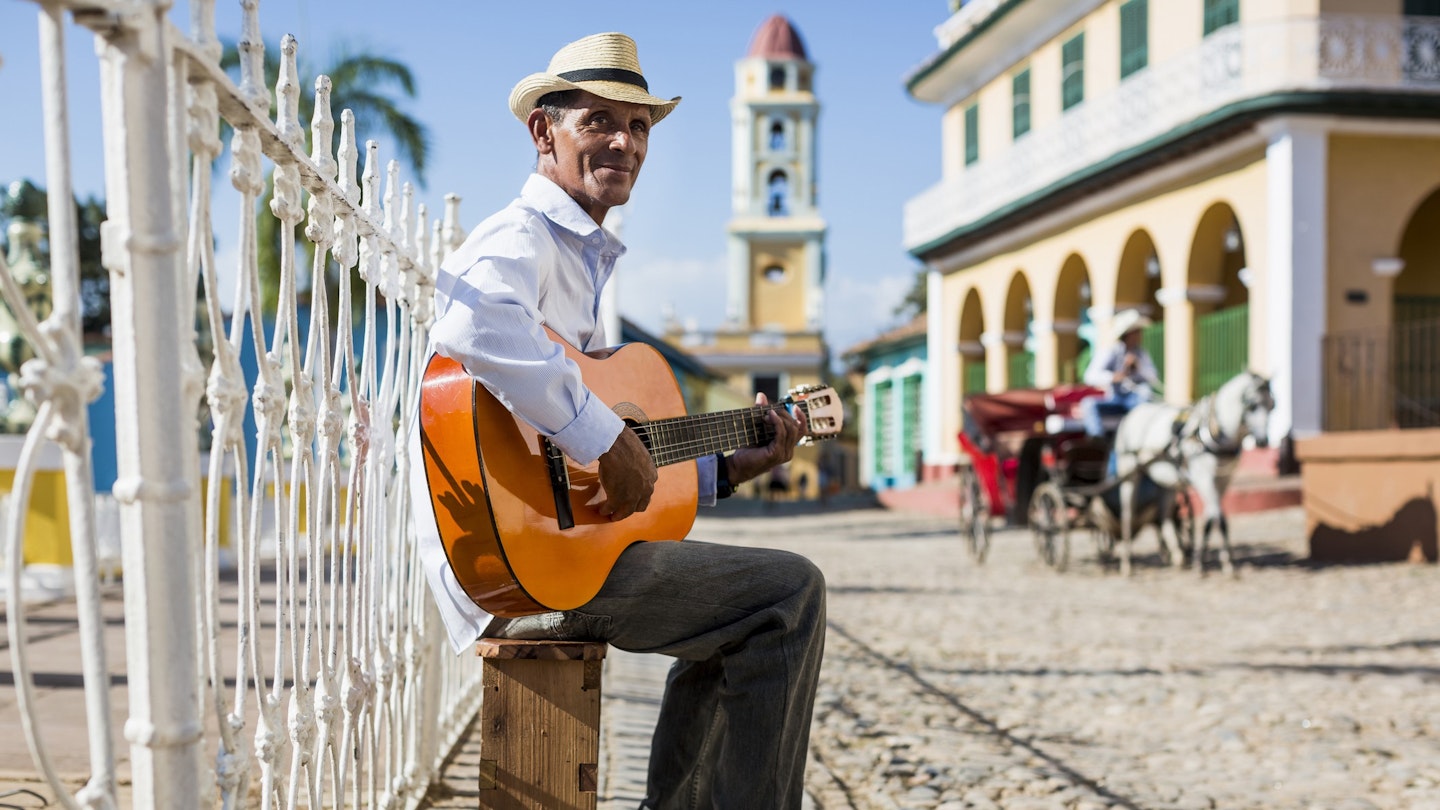
Be ready for your visit to Cuba with these top tips on what to expect © Westend61 / Getty Images
To a first-time traveler, Cuba can seem like a confusing jigsaw puzzle, particularly if you’re breaking free of the resorts and traveling around on your own.
The Spanish spoken here is fast and hard to decipher, many streets have two different names and the country’s fickle and highly complicated monetary situation could fill its own guidebook.
To help you be prepared, here is everything you need to know before planning a trip to Cuba.
1. Double-check your insurance
You are required to have medical insurance to visit Cuba and will need to bring digital or printed proof of your policy. Random checks are made at the airport. If you arrive without insurance, you’ll be asked to buy a Cuban policy at the airport for US$30.
2. Fill out your passenger information in advance
Cuba uses an online form called D’Viajeros to gather traveler information, including immigration and health data, in advance of travel. Fill out the form digitally up to 72 hours before your arrival in Cuba.
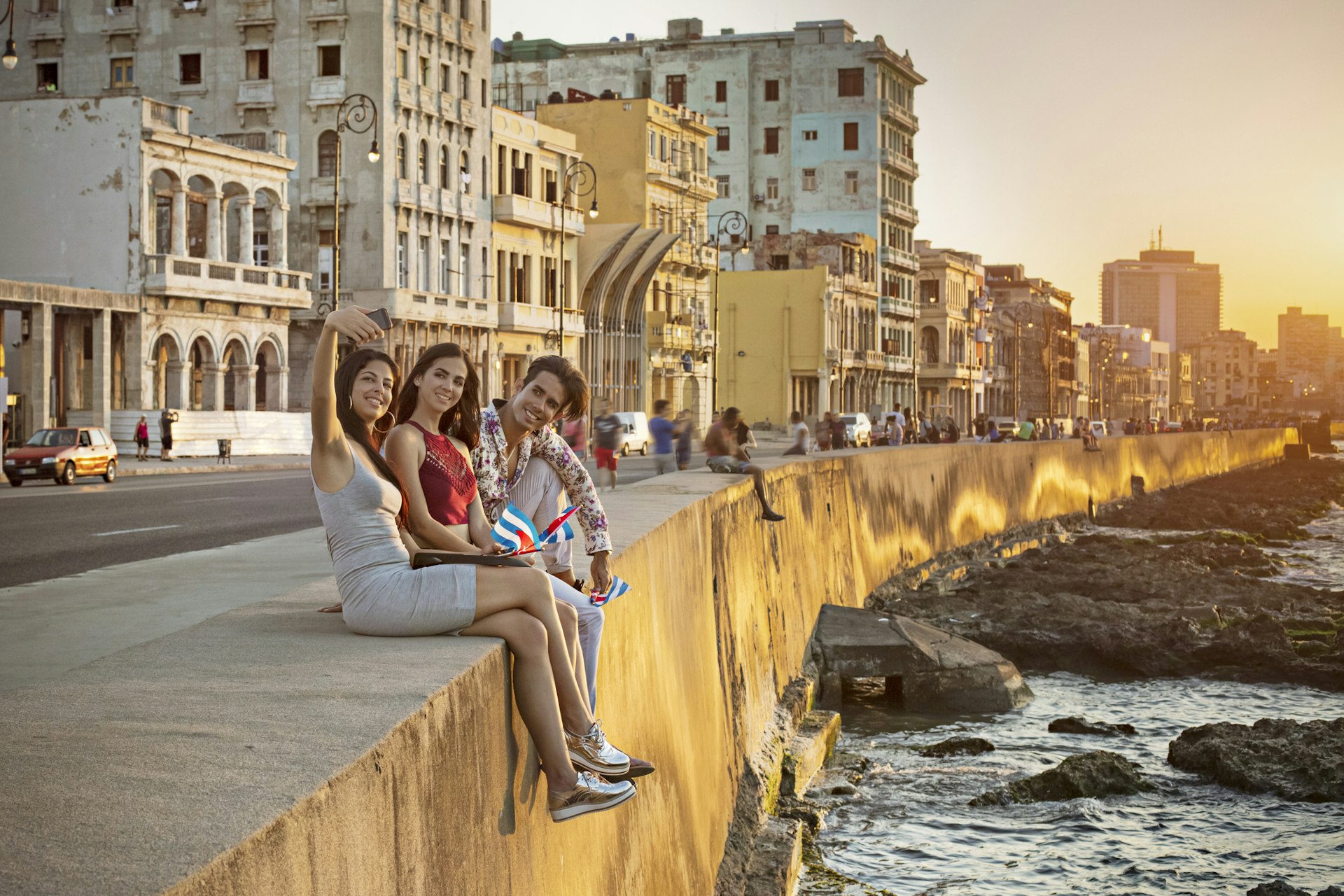
3. Every visitor needs a tourist card
To enter Cuba, all visitors need to present a completed tourist card . It’s usually available through your airline (ask when booking) and included in the price of your ticket.
If not, you can purchase one through a Cuban travel agency. Costs range from US$50 to US$85. Citizens of 20 African and Asian countries require a formal visa to enter Cuba. Check the situation for your country before booking.
4. Cash and currency: it’s complicated!
Money in Cuba is confusing, even to Cubans . Since the country abolished convertibles (CUC) in January 2021 and took the US dollar out of circulation in June 2021, there has been massive inflation and the emergence of a rampant black market. The knock-on effect is a bewildering dual economy.
The official currency of Cuba is the Cuban peso (CUP), but foreign currencies are also widely accepted, especially by private businesses who need hard cash to buy non-rationed goods in MLC (freely convertible currency) shops.
State-run enterprises and banks use official exchange rates. However, the prices of the superior services offered by private businesses generally reflect black market exchange rates.
Hence a main dish in a private restaurant in Havana will cost around CUP$500 (US$21). That’s an expensive meal if you’re paying in pesos bought from a Cuban bank.
However, most private restaurants will also accept payment in euros using a more favorable exchange rate. Some will even have a separate menu with prices printed in euros.
When buying something from a private business – be it a restaurant, casa particular (private accommodation) or taxi service – it’s usually best to pay in a foreign currency. Always ask upfront what currencies they accept and what exchange rate they use for their published peso prices.
Euros is the most interchangeable currency and the one preferred by Cubans. You can also use and exchange Canadian dollars and pound sterling.
US dollars still circulate on the black market, but we don’t recommend bringing them. The best bet, when you arrive, is to keep most of your money in a foreign currency and only change small amounts into pesos for incidentals like museum entry, concert tickets and tips.
5. MLC is a currency with no cash form
The Moneda Libremente Convertible (MLC) is a currency approved by the Cuban government in 2020 that can be used in certain shops to buy higher-end goods.
The currency doesn’t exist as cash and its value is pegged with the US dollar. It’s used mainly by Cubans with special magnetic cards.
Tourists needn’t worry too much about MLC$, although prices will sometimes be displayed in the currency in state-run enterprises such as cigar shops or airport souvenir stores where you can pay with a non-US credit card.
6. Only some credit cards will work
Credit cards are increasingly popular in Cuba and in many state-run businesses are the preferred (and sometimes only) method of payment.
Despite promises made in the Obama era, credit cards linked to US banks are not accepted. Private businesses almost never have credit card machines, meaning your only option is cash.

7. Pack your favorite casual clothes – and men need a shirt
Dress in Cuba is casual, so you can leave your high heels and tux behind. The only real dress code is in cinemas, theaters and nightclubs, where male patrons are required to wear long trousers and shirts with sleeves or half-sleeves.
8. Cuban Spanish is fast and often informal
If you speak Spanish, you’ll find that Cubans mostly use the informal tú form of address, rather than usted . In the plural, ustedes is used over vosotros .
If you don’t know someone, it’s best to address them as señor or señora , though you’ll hear Cubans use all kinds of substitutes such as socio , hermano , papa , chica/o and asere .
9. Cuban cities are where the streets have two names
In most Cuban cities, the streets have two names: a contemporary one that is noted on maps and marked on street signs, and a pre-revolutionary one that is still used widely by the locals.
This can become confusing, especially when locals, unaware of the new street names, start giving out directions or addresses using the colloquial nomenclature. Always double-check addresses and, if possible, get two potential names for the street you’re looking for.
10. Understand the local art of queueing
Cubans have to endure a lot of long waits in boring queues, so they’ve invented a way of doing it that doesn’t involve standing in line. In a Cuban queue, you simply roll up at the bakery/clinic/visa office and yell out to the assembled masses, "Quien es último?" (Who’s last?).
Hopefully, someone in a 400m vicinity will answer your polite entreaty with the word, "yo" (me). That person is your yardstick. As long as they’re still around, feel free to go for a walk, sit in the lotus position or buy ice cream. When they get called up, be on your toes, you’re next!
11. Ask questions more than once
Thanks to heavy bureaucracy, answers to simple requests aren’t always straightforward – or even correct. Probe politely and ask at least five different people before you make important decisions.
12. Bring something to keep you warm on a cold bus journey
Cuba has a countrywide state-run bus service called Víazul that connects all of the main cities and some of the smaller towns. Prices are charged in MLC$ (the same rate as the US$) and tickets must be paid for with a credit card either in person or online.
A second service called Conectando, run by Cubanacán, also puts on buses in peak season along some of the more popular routes. Bring a sweater/jacket for long bus rides – the air-conditioning is akin to a chilly day in Vancouver.

13. Cuba is considered a safe place to travel
Cuba is one of the safest countries in the Americas in terms of violent crime. Pick-pocketing is more common but not rampant, and is mostly avoidable if you follow a few basic precautions: Wear a money belt, use safe boxes in hotel rooms and don’t flash your cash in public.
14. Solo female travelers report receiving unwanted attention
Solo female travelers report experiencing a good deal of unwanted attention, but it didn't necessarily spoil their enjoyment of traveling in Cuba.
There is a fine line between being open and friendly and harassment, and some men can cross that line by being overly familiar or asking too many personal questions. Learn some key phrases in Spanish that make it clear when you're not interested.
15. Beware of forgeries
Never change money with unlicensed traders on the streets. You run the risk of receiving estafas (forged notes).
16. Bring your own medicines
On one level, Cuba has a good health system (it invented and quickly distributed three COVID-19 vaccines); on the other, it is perennially short of pharmaceuticals.
Bring all the prescription medications you think you’ll need, as well others you might like ibuprofen or paracetamol. If you’d like to donate some medicines to the people of Cuba, it is currently possible to bring in 10kg of medical supplies tax-free (pack them in a separate bag).
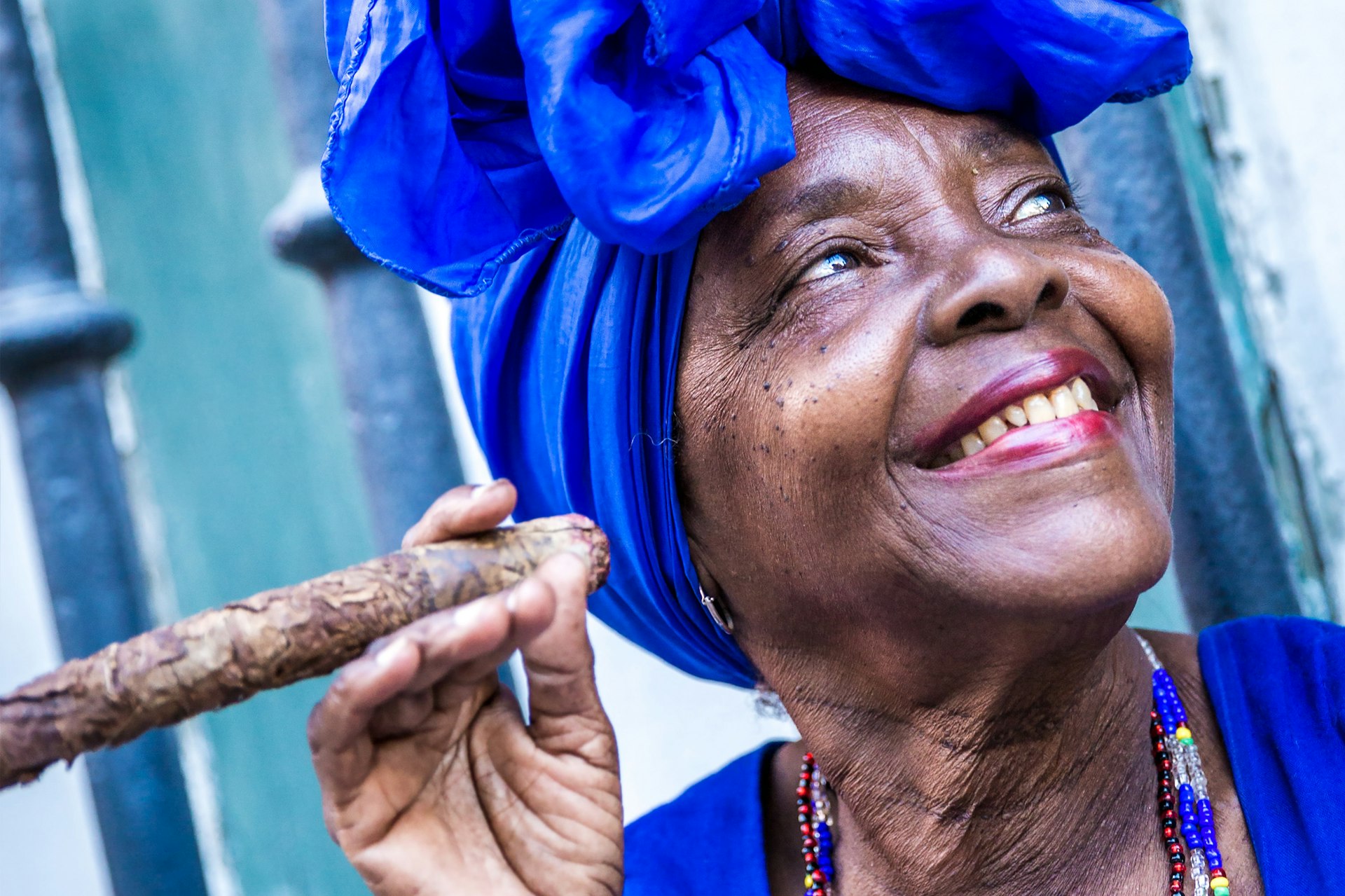
17. Avoid dodgy cigars
Cuba has its share of jineteros (touts) spinning elaborate stories about super-cheap, high-quality cigars procured by their brother/mother/cousin from the factory. Don’t believe them. Instead, buy your cigars in state-run shops such as the Casa del Habano chain. Cigars sold on the street are invariably factory cast-offs and not genuine.
18. Driving is not as easy as you think
With light traffic on the road, driving might seem like an easy proposition, but with elevated rental prices and cars often in short supply, it’s not always so.
Add in sporadic signposting, potholed roads and a wide array of hazards – goats, horses, bicycles, kids and slow-moving, fume-belching trucks – and you might want to consider getting the bus or, at least, employing the services of a chauffeur.
19. Bring toilet paper and sanitary products
The pandemic made the provision of antiseptic hand lotion more common, but the same can’t be said of toilet paper. Carry your own roll and/or gravitate to four- or five-star hotels when you’re caught short in the city.
Re-usable pads and silicon cups, or disposable pads and tampons are must-pack items if you're expecting your period while you're in Cuba. These are in high demand here.
20. Don’t drink the water
The water won’t kill you, but it might give you a little queasiness or an upset stomach. Fortunately, bottled water is abundant and cheap. An even better idea is to bring your own filter bottle or water purification tablets.
This article was first published February 2022 and updated January 2024
Explore related stories
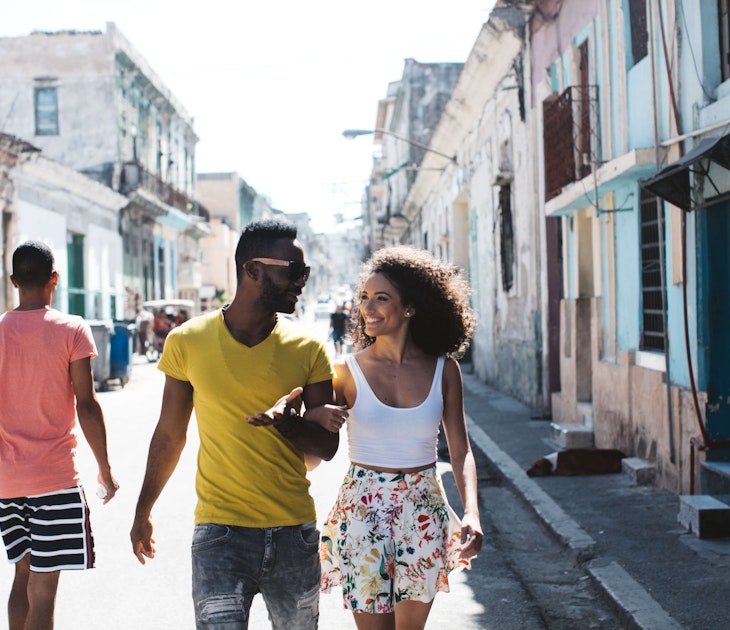
Tips & Advice
Jan 18, 2024 • 4 min read
Travelers often have questions about the visa process for Cuba and whether US citizens can even visit. Here’s our guide to Cuba’s visa requirements.

Jan 9, 2024 • 4 min read
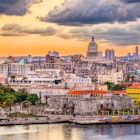
Jan 9, 2024 • 6 min read

Jan 7, 2024 • 10 min read

Jan 6, 2024 • 7 min read

Jan 5, 2024 • 4 min read

Nov 24, 2023 • 7 min read

May 6, 2023 • 9 min read

Jan 6, 2023 • 7 min read

Jan 5, 2023 • 8 min read

Cuba…the Caribbean gem renowned for its colorful history and captivating dance and dining culture, beckons travelers from around the world.
However, for U.S. citizens, embarking on a journey to Cuba can still be quite daunting, due to unique travel restrictions.
- U.S citizens can visit cuba under 12 categories of travel.
- There are different types of visit visas - the Green Visa and the Pink Visa - and which type you need will depend on certain factors.
- A green card is cheaper than a pink card. You will need to also factor in the delivery cost of the card.
- These cards allow 90 day stays in Cuba and one single entry.
- ― Can a U.S. Citizen Visit Cuba as a Tourist?
- ― Can a non-U.S. Citizen Visit Cuba as a Tourist?
- ― What are the Categories for Travel to Cuba and How do I Qualify?
- ― Knowing the Difference: Which Cuba Tourist Card Do I Need?
- ― The Nuts and Bolts: What is the Cost of a Cuba Tourist Card and When Will I Receive It?
- ― How Long Can I Stay in Cuba with a Cuba Tourist Card?
- ― Easy Tourist Card: Your One-Stop Shop for All Your Cuba Travel Needs
While traveling through Cuba can be a memorable adventure, just getting to this iconic Caribbean island can be quite the adventure as well.
But if you plan ahead and do the right research, your journey to this magnificent country will be one that you will never forget nor regret.
Can a U.S. Citizen Visit Cuba as a Tourist?
Visiting Cuba as a U.S. citizen has had a complex history, shaped by ever-evolving regulations and diplomatic relations.
Keeping abreast of the current situation at any given time in history can feel overwhelming and it’s always important to read the most up-to-date requirements before you begin your travel plans.
Sites like the U.S. State Department or reputable online Cuban visa websites can help you stay apprised of the current situation and aware of the most recent changes to any regulations.
Here is a brief historical timeline of recent governing restrictions and allowances for travel to Cuba for U.S. citizens:
- 1960: Diplomatic relations between the U.S. and the Cuban government begin to deteriorate.
- 1962: The U.S. imposes a full embargo on trade with Cuba.
- 1977: The U.S. allows travel to Cuba for academic, religious, and journalistic purposes.
- 1982: Travel for educational purposes expands.
- 2000: Travel for “people-to-people” exchanges increases.
- 2004: The Bush administration tightens travel restrictions for Cuban-Americans and Cuban citizens.
- 2009: President Obama eases restrictions on family travel and remittances to Cuba.
- 2014: Under President Obama, regulations are further relaxed, allowing for more general travel categories.
- 2017: The Trump administration reinstates some restrictions on travel to Cuba.
- 2020: New rules limit non-family travel to Cuba under the “Support for the Cuban People” category.
- 2021: The U.S. State Department returns Cuba to its list of state sponsors of terrorism, and travel restrictions and rules continue to evolve, with varying levels of enforcement.
- 2022: The White House lifts some restrictions on the island, including by expanding U.S. flights into the country, re-establishing a family reunification program, increasing visa processing, and lifting the remittance cap for families.
- 2023: Travel to and from Cuba continues to improve and more U.S. tourists visit the island than have in decades, though they must do so with the appropriate Cuban visa and other documents prepared beforehand.
Despite past challenges, it is now more possible than it has been for decades for U.S. citizens to visit Cuba, as long as all your documents are in order.
Can a non-U.S. Citizen Visit Cuba as a Tourist?
When it comes to traveling to Cuba, it’s not just U.S. citizens who have the opportunity to explore this vibrant destination. Non-U.S. citizens from around the world can also visit Cuba for tourism purposes.
Check Passport Validity: Ensure that your passport is valid for at least six months beyond your planned departure date from Cuba. Many countries require this for international travel.
Select a Travel Category: Determine the purpose of your trip to Cuba. While most non-U.S. citizens can visit for tourism, it’s essential to understand the specific category you fall under, such as tourism, family visits, cultural exchange, etc.
Obtain a Green Tourist Card: If you’re not a U.S. citizen and are traveling from a country outside the United States, you’ll typically need to obtain a Green Tourist Card, also known as a Cuban Tourist Card or Visa. You can acquire it online with us or through airlines, travel agencies, or the Cuban Embassy in your home country.
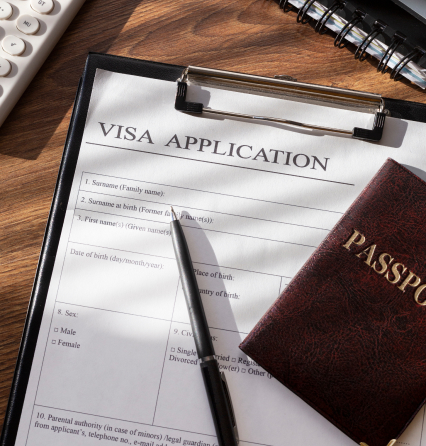
- Ensure Travel Insurance: Cuban authorities require all travelers to have valid travel health insurance that covers any potential medical expenses or medical evacuation during their stay in Cuba. Make sure to carry proof of your insurance coverage.
- Obtain a Green Tourist Card: If you're not a U.S. citizen and are traveling from a country outside the United States, you'll typically need to obtain a Green Tourist Card, also known as a Cuban Tourist Card or Visa. You can acquire it online with us or through airlines, travel agencies, or the Cuban Embassy in your home country.
- Complete the Application : Fill out the necessary application forms for the Green Tourist Card, and ensure you have all required documentation, such as a valid passport and travel insurance.
- Pay the Fee: Pay the fee associated with the Green Tourist Card application. The cost may vary depending on your location and issuing authority.
- Receive Your Green Tourist Card: Once your application is approved, you will receive your Green Tourist Card, which is typically valid for a single entry and allows for a stay of up to 90 days in Cuba.
- Travel to Cuba: Finally, embark on your journey to Cuba and enjoy your trip. Make sure to adhere to the permitted duration of your stay to avoid any legal issues.
These steps provide a general overview of the process for non-U.S. citizens to travel to Cuba for tourism or other permitted purposes. Be sure to check with the Cuban Embassy or relevant authorities in your home country for the most up-to-date information and requirements.
Whether you are traveling from the United States or another country, Easy Tourist Card was born to simplify the Cuba visa application process and ensure compliance with requirements.
What are the Categories for Travel to Cuba and How do I Qualify?
Foreign nationals can visit Cuba for tourism, but the rules and restrictions vary for American citizens. Until 2014, Cuba’s travel restrictions posed challenges for Americans, but President Obama initiated significant changes.
The objective was to eliminate the need for specific licenses, replacing them with more accessible general licenses. The Department of Treasury’s Office of Foreign Assets Control (OFAC) created general licenses for 12 categories of travel.
The 12 categories of U.S.-approved travel to Cuba encompass a broad spectrum of purposes:
- Visiting Family: Travel to Cuba is permitted for visits to close relatives, including blood relatives, relatives by marriage, or adopted family members, within specific generational limits.
- Official Government Business: Individuals engaged in official business for the U.S. government, foreign governments, or intergovernmental organizations involving the U.S. government can travel to Cuba under this category.
- Journalism: Access is granted for journalistic activities, supporting both experienced journalists and technical personnel.
- Research and Meetings: Travelers can engage in research within their field of expertise or attend professional meetings and conferences.
- Educational Purposes: While not for attending universities, this category allows participation in educational activities, catering to both students and professors.
- Public Performances, Workshops, Clinics, Exhibits, and Athletic Competitions: Artists, performers, and sports enthusiasts can visit Cuba for their respective activities.
- Religious Purposes: Religious organizations, along with their staff and members, are eligible if engaged in full-time religious activities.
- Support for the Cuban People: Independent organizations promoting democracy transition and individuals/non-governmental organizations aiding Cuban civil society’s interests are included.
- Humanitarian Projects: This category encompasses a range of sub-categories, including medical care, environmental projects, educational training, adult literacy, and small-scale enterprise development, among others.
- Private Foundations Activities or Research for Educational Institutes: Travelers can collect non-commercial information in Cuba for educational purposes.
- Exportation, Importation, and Transmission of Information or Informational Materials: Pertaining to the publishing, music, and film industries.
- Export: Limited to authorized export transactions.
Most US citizens visit Cuba under the “Support for the Cuban People” license and use their taxi and restaurant receipts as proof of their support. If your travel purpose doesn’t align with these categories, a separate Cuban visa will be required to cross into Cuba. It’s best to work with a knowledgeable Cuba visa online agency who can make sure you’ve chosen the correct category and that all your paperwork has been completed appropriately.

Knowing the Difference: Which Cuba Tourist Card Do I Need?
When it comes to planning your trip to Cuba, understanding the distinction between the two types of Cuba Tourist Cards is essential.
These cards, known as the Green Cuba Tourist Card and the Pink Cuba Tourist Card, cater to different categories of travelers.
Let’s delve into the details of each, ensuring you select the right one for your journey.
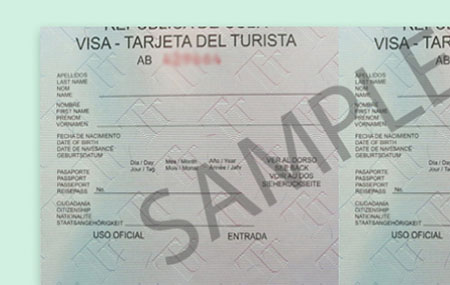
The Green Cuba Tourist Card:
This variant of the Cuba Tourist Card is designated for U.S. citizens and non-U.S. citizens who are flying from outside the United States.
If you’re not an American citizen and your travel originates outside the U.S., the Green Tourist Card is the one you’ll need.
It grants you access to Cuba and facilitates your stay, allowing you to explore the island’s rich culture and landscapes.
The Pink Cuba Tourist Card:
If you are a U.S. citizen or anyone who is traveling from the United States, the Pink Cuba Tourist Card is the appropriate choice.
This card is specifically designed to accommodate those who are traveling to Cuba from United States soil as well as for Americans, regardless of where their travel originates.
It plays a crucial role in ensuring compliance with U.S. regulations while enabling you to experience the unique charm of Cuba.
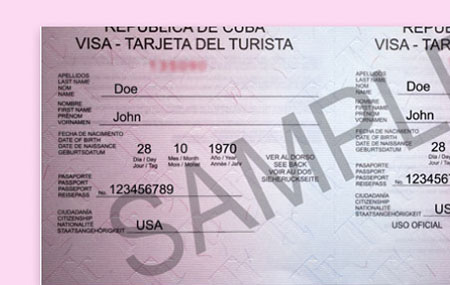
The Nuts and Bolts: What is the Cost of a Cuba Tourist Card and When Will I Receive It?
Now that you understand a bit more about why you need a Cuba tourist visa and which type you need to apply for, let’s look at a few more important details that will be part of your overall Cuba visa process:
The Cost of a Cuban Visa
The cost of a Cuban visa can vary depending on several factors, including your nationality, the method of application, and the specific travel agency or airline you choose.
If you choose to apply for a visa through our website at Easy Tourist Card, the fees are as follows:
Pink Tourist Card – 100 USD
Green Tourist Card – 40 USD
(Note: Shipping your tourist card can range in price from 30 USD to 60 USD depending on your country of residence.)
It’s important to note that while the visa fee itself is a significant part of the cost, there may be additional fees associated with the application process, such as insurance fees or rush delivery charges, depending on the method you choose.
If you elect to use us as your Cuba visa online processing site, your total price will be clear before you checkout.
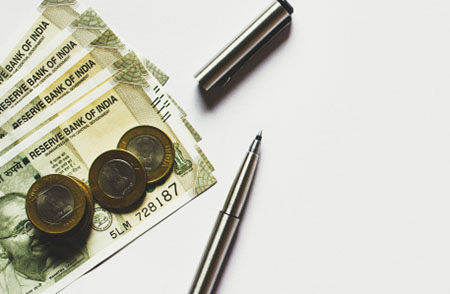
The Processing Time for a Cuban Visa
The processing time for a Cuba Visa can also vary, depending on what route you take to get your tourist card.
However, if you choose to use us to process your visa, you might have the option to expedite the process and receive your Cuba Visa sooner, possibly even in one day, depending on where you’re traveling from or your nationality.
As with most travel plans, it’s advisable to apply for your Cuba Visa well in advance of your travel date to allow for any unexpected delays.
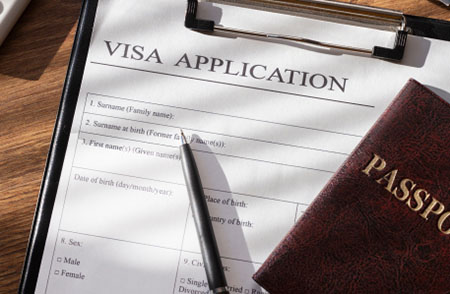
How Long Can I Stay in Cuba with a Cuba Tourist Card?
The duration of your stay in Cuba with a Cuba tourist card depends on several factors, including your nationality and the type of tourist card you hold.
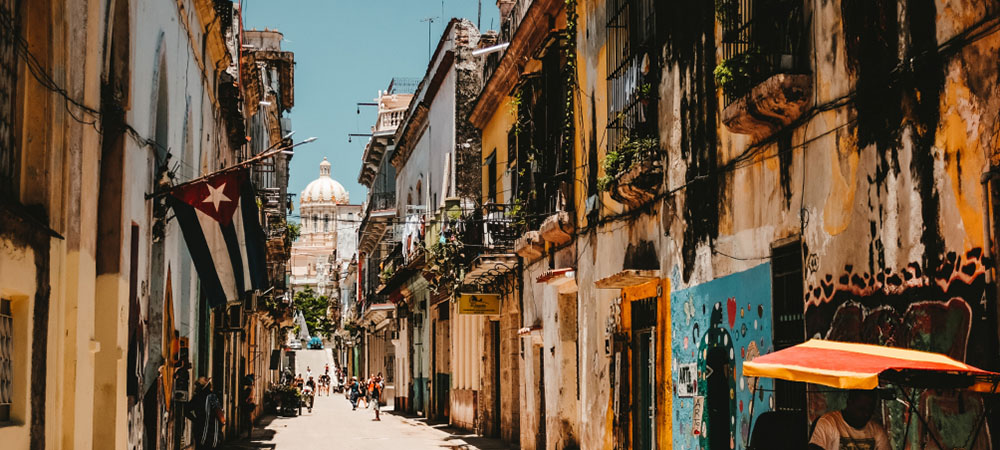
In most cases, travelers can stay in Cuba for up to 90 days with a standard Cuba tourist card.
It’s essential to note that Cuban authorities have made it clear that the clock starts ticking from the moment you enter Cuba. You must depart Cuba before your authorized stay expires to avoid any overstay complications.
Additionally, your Cuba tourist card is typically valid for a single-entry trip.
If you plan to leave Cuba during your visit and return, you will need to obtain a new tourist card upon re-entry.
If your travel plans involve a more extended stay or you are planning to conduct certain types of business, you may need to explore alternative visa options beyond the standard tourist card.
Regardless of your intended duration in Cuba, it’s advisable to check the latest visa requirements and regulations before traveling to ensure a trouble-free visit to this vibrant island nation.
Easy Tourist Card: Your One-Stop Shop for All Your Cuba Travel Needs
In the realm of Cuba travel, navigating visa requirements and regulations can be somewhat complex, but we can help alleviate that.
With comprehensive support, guidance, and a user-friendly online platform , Easy Tourist Card offers a convenient one-stop solution for all your Cuba travel needs.
From securing the right Cuba tourist card to providing essential insights and assistance, we are a committed partner in making sure your Cuban adventure is memorable for all the right reasons.
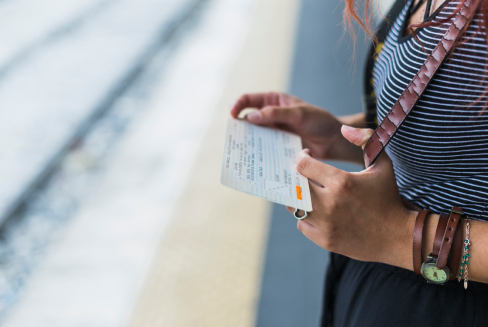
Whether you’re a first-time traveler or a seasoned explorer, Easy Tourist Card is here to ensure that your experience in Cuba is filled with cultural discoveries, breathtaking landscapes, and unforgettable moments.
Leave the complexities behind and embrace the allure of Cuba with confidence, knowing that Easy Tourist Card has your back at every step of your journey.
Please Choose Your Country & Currency Preferences

Yes, Americans Can Still Travel to Cuba. Here’s How
Is it legal for u.s. citizens to travel to cuba what types of travel can they take and what are cuba tourist cards here’s what you need to know about visiting cuba..
- Copy Link copied

Havana, Cuba’s capital city, is known for its vintage cars and historic architecture.
Courtesy of Spencer Everett/Unsplash
Cuba is a beautiful Caribbean island with a complex history and rich culture. But for decades, it’s been just beyond the reach of many Americans. In addition to several difficult years involving devastating hurricanes, pandemic-era travel restrictions, ever-changing U.S. State Department travel advisories, and frequently updated trade and tourism regulations , it’s not surprising that many Americans may be confused about whether and how U.S. travelers can legally visit Cuba .
As of early 2024, the short answer is: Yes, you can travel to Cuba as a U.S. citizen. There are, however, some hoops you’ll need to jump through, because (technically speaking) travel to Cuba for pure vacationing isn’t allowed. For U.S. citizens interested in planning a trip to Cuba, here’s what you need to know before you go.
Can you travel to Cuba?
The relationship between the United States and Cuba has been tumultuous, to say the least. Following the Cuban Revolution during the 1950s and the subsequent rise of Fidel Castro’s regime, diplomatic ties between the two nations deteriorated rapidly. In 1960, the United States imposed a trade embargo on Cuba, effectively severing most economic and political connections.
In the time since, travel between the two countries has been heavily restricted by the U.S. government, which has implemented various policies to discourage or prohibit its citizens from visiting Cuba. Making matters more complex, those policies often changed with each presidential administration. The island nation was more accessible during the Carter, Clinton, and Obama years and more closed off during the G.W. Bush and Trump years.
In 2014, it became significantly easier for Americans to visit Cuba after President Obama announced a series of measures aimed at normalizing diplomatic ties and loosening travel restrictions to allow Americans to visit for certain purposes (more on that later). Additionally, in 2016, commercial flights between the United States and Cuba resumed for the first time in more than half a century.
However, the Trump administration made it significantly harder to visit Cuba. During his time in office, President Trump enacted more than 200 measures against Cuba , which included limiting what Cuban airports flights from the U.S. could fly into, banning cruises from stopping in Cuba, and eliminating the most common visa category under which U.S. citizens planned legal visits to Cuba (known as “people-to-people” travel).
Then in May 2022, President Biden’s administration announced it would undo many of the Cuba-related restrictions enacted under Trump and would work on expanding authorized travel. Under the new order, regular passenger and charter airplanes are again allowed to fly to any Cuban airport (and airlines announced new flight paths ). And officials said that the “people-to-people” category of travel, under which many tours and organized travel companies bring U.S. travelers to Cuba, will ultimately return, though there is no timeline on when that will happen.

Cuba’s music scene is also a big draw.
Photo by Shutterstock
How to travel to Cuba as an American citizen
U.S. law states that those who want to go to Cuba need to qualify for a “general license” based on one of 12 approved categories.
The 12 categories currently authorized by U.S. government, for travel to Cuba are:
- Family visits
- Official business of the U.S. government, foreign governments, and certain intergovernmental organizations
- Journalistic activity
- Professional research and professional meetings
- Educational activities
- Religious activities
- Public performances, clinics, workshops, athletic and other competitions, and exhibitions
- Support for the Cuban people
- Humanitarian projects
- Activities of private foundations or research or educational institutes
- Exportation, importation, or transmission of information or informational materials
- Certain authorized export transactions
Licenses are self-qualifying, meaning that when you purchase your airline ticket, you’ll be asked to state your category in a signed affidavit before checkout.
When former President Obama first eased travel restrictions to Cuba , the move allowed leisure travelers to pursue self-led trips under the “people-to-people” educational activities category. Today, the “support for the Cuban people” category is the most popular because it’s the broadest.
What the “support for the Cuban people” license entails
To adhere to the requirements for independent travel under “support for the Cuban people,” travelers must first declare the category (when prompted) while booking flights and lodging. As part of the license, travelers are also expected to prepare an itinerary outlining how their trip will fulfill the category’s terms and contribute to Cuba’s local economy. (This itinerary could be—but isn’t always—requested on arrival to the country.)
An appropriate “support for the Cuban people” itinerary could including staying in casa particulares (locally run guesthouses), visiting Cuban-owned businesses, going on tours (like classic car rides or architecture walking tours) run by Cubans, visiting independent museums and galleries, partaking in cultural dance and music classes, and eating at locally owned restaurants and markets. (For specific recommendations and local resources, check out AFAR’s Cuba Travel Guide .)
Travelers can visit independently under that category, though it’s important you keep a record of your itinerary and your receipts: The U.S. government can ask for them up to five years after the trip.
Can you still travel to Cuba with organized tour operators?
Even though the Trump administration’s tightened restrictions on travel to Cuba prohibited organized “people-to-people” tours entirely, many tour companies have switched their approach to adhere to the “support for the Cuban people” license, according to Tom Popper, president of U.S.-based tour operator InsightCuba . Other tour providers that offer “people-to-people” trips, such as GeoEx Adventure Travel , Flash Pack , Intrepid Travel, and G Adventures, have similarly transitioned their program itineraries in order to offer legal trips to Cuba that comply with the regulations.
Challenges and considerations for travel to Cuba
Despite the easing of restrictions, traveling to Cuba as an American still presents some challenges. For example, there are limited banking services available to U.S. visitors, and American credit and debit cards are not typically accepted (as noted on the website for the U.S. embassy in Cuba ), so it’s important to bring plenty of cash. Similarly, internet access in Cuba is limited —expect connections to be patchy .
How to get a Cuba Tourist Card

The terms Cuba Tourist Cards and Cuban visas are sometimes used interchangeably.
Courtesy of Easy Tourist Card
Regardless of the license under which you travel to Cuba, you’ll still need to organize a few important documents before you go.
The Cuban government requires that all travelers entering the country provide a valid passport and proof of travel insurance that covers medical emergencies and evacuation by air. In addition, all U.S. travelers—adults, children, and infants—must purchase a Cuba Tourist Card , which grants visitors a maximum stay of 30 days on the island. Tourist Cards are valid for 180 days after purchase, which means you will need to travel within six months of obtaining the document. Note that the terms Cuba Tourist Card and Cuban visa are sometimes used interchangeably; they’re the same thing.
There are several ways to buy a Cuba Tourist Card: Many U.S. airlines with direct service to Havana—among them United Airlines , JetBlue , American Airlines , Delta , and Southwest —offer Tourist Cards either online or at the gate; prices and purchase locations vary among carriers, so it’s important to check in advance.
Websites like Easy Tourist Card allow travelers to apply for and purchase Tourist Cards online with two-day international shipping. Those who plan to fly to Havana directly from the United States will need to purchase a pink Tourist Card at a rate of $100, while those departing from non-U.S. airports can purchase a green Tourist Card for $37, even with a U.S. passport.
“U.S. travelers should note that travel to Cuba has been regulated since 1963 and has changed under each presidential administration since that time,” states Popper of InsightCuba. “Cuba travel has always been a hot political topic, and you never know when the rules are going to change. I always tell people to go now—while you can.”
This article was originally published in 2018. It was most recently updated on March 21, 2024, to include current information.


WORLD'S BEST PROVIDER OF OFFICIAL CUBAN VISAS

SELECT A TYPE OF VISA
Select the type of visa you will need. Pink visas are required for those travellers beginning their journey in the US to Cuba . For those who travel from the Rest of the World to Cuba , they must opt for a green visa .
Choose this option if you are arriving from any country, except the USA

Choose this option if you are travelling to Cuba from or via any US airport
Trusted Customer (Anonymous)
Apr 17, 2024
Very easy and straightforward. Very fast service arrived with 20h. Very much impressed 10/10
Martin Pinnick
Apr 15, 2024
Frequently Asked Questions
What is the difference between a Cuban tourist visa and a Cuban tourist card?
There is no difference, it is the same document. Tourist cards act as visas to enter the country for tourism purposes only. Some people call them tourist visas or just “visas” and others call them tourist cards.
Who requires a Cuban tourist visa?
Everyone going to Cuba for the purpose of tourism requires a tourist visa/card. Airlines will not allow you to board your flight to Cuba if you do not have one. Please note that all persons, including infants, will need to apply for a tourist card before their trip. The only exception is Cuban citizens who do not require them. The Cuban Immigration Service published a list exempting citizen of the following countries from tourist visa requirements. However, we cannot guarantee its accuracy or updating, so if you are a citizen of one of these countries you should contact your nearest Cuban Embassy/Consulate to confirm: Antigua & Barbuda, Armenia, Azerbaijan, Barbados, Belarus, Bosnia & Herzegovina, Dominica, Georgia, Grenada, Liechtenstein, Macedonia, Malaysia, Moldova, Namibia, Russia, Saint Lucia, Saint Kitts & Nevis, Tajikistan, and Turkmenistan. Also keep in mind that there are restricted nationalities that cannot enter the country, with a tourist card. These nationalities will not be able to place an order on our website and the service for them will not be available.
Once I have my visa, are there any other requirements for my entry to Cuba as a tourist?
Please note that you must complete the Health Declaration (Advance Passenger Information) online. You can do it up to 72 hours before your flight. Also be aware that this is not the same form for a Cuba visa, but the traveller's declaration forms that you had to complete on paper before arriving in Cuba will now need to be completed electronically here: DViajeros (gob.cu)
Recommended by
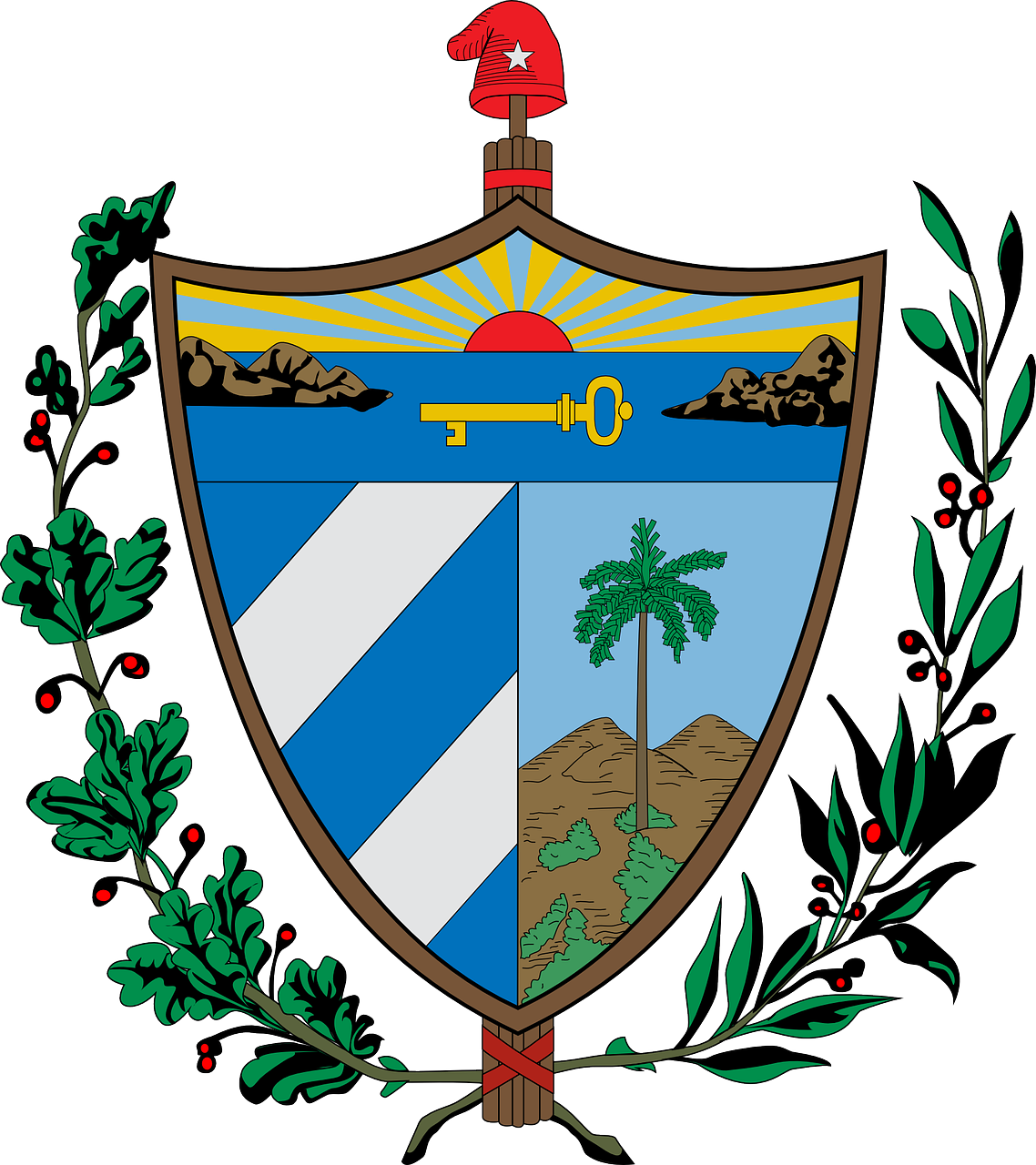
Cuban Consulate
Lonely Planet
Latest from our Blog
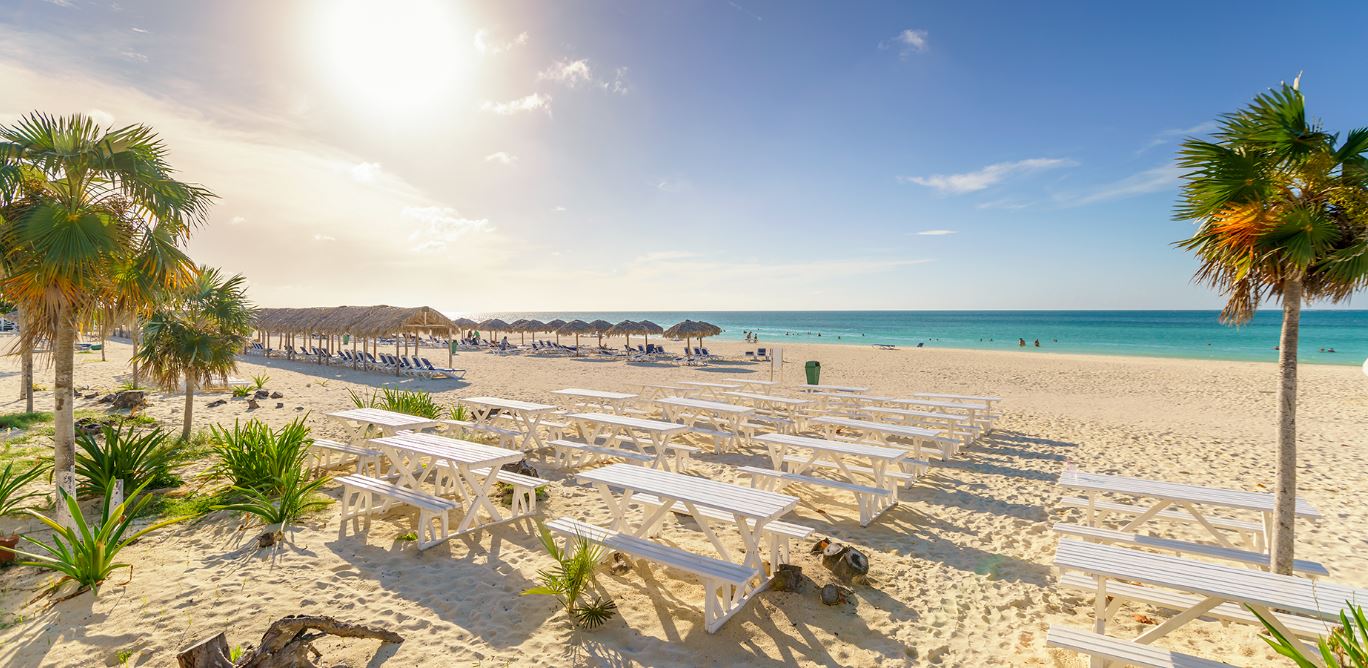
New charter flights to Cuba in May, from Gatwick and Manchester.
Apr 19, 2024
The agreement enables direct connections between the cities of London (Gatwick) and Manchester with Holguín and Cayo Coco, respectively.
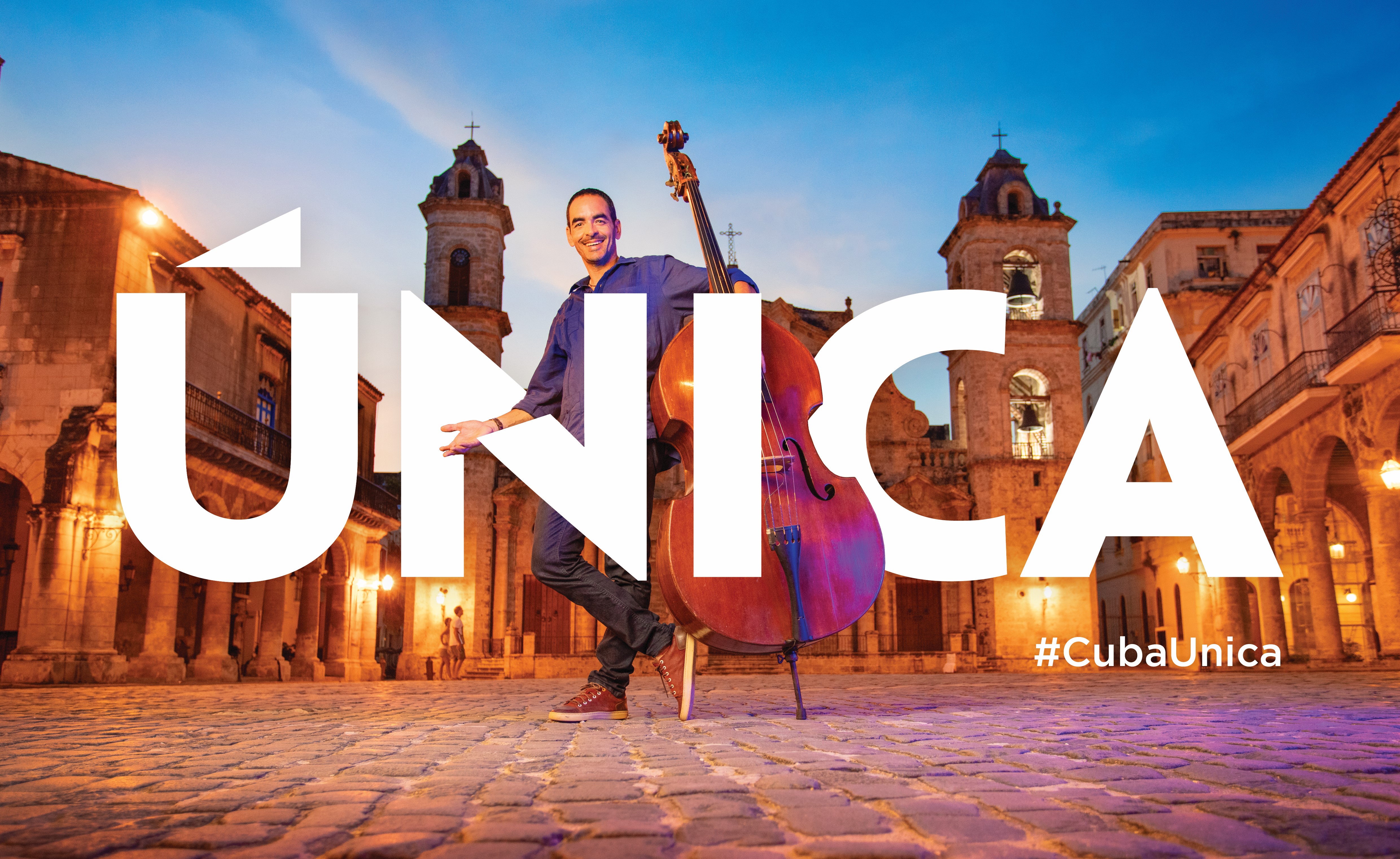
FITCuba 2024 aims to aid in the revival of the travel industry.
Apr 18, 2024
This Tourist Fair represents the pinnacle of the Cuban tourism sector, with this year's focus being on Latin America and the Caribbean.
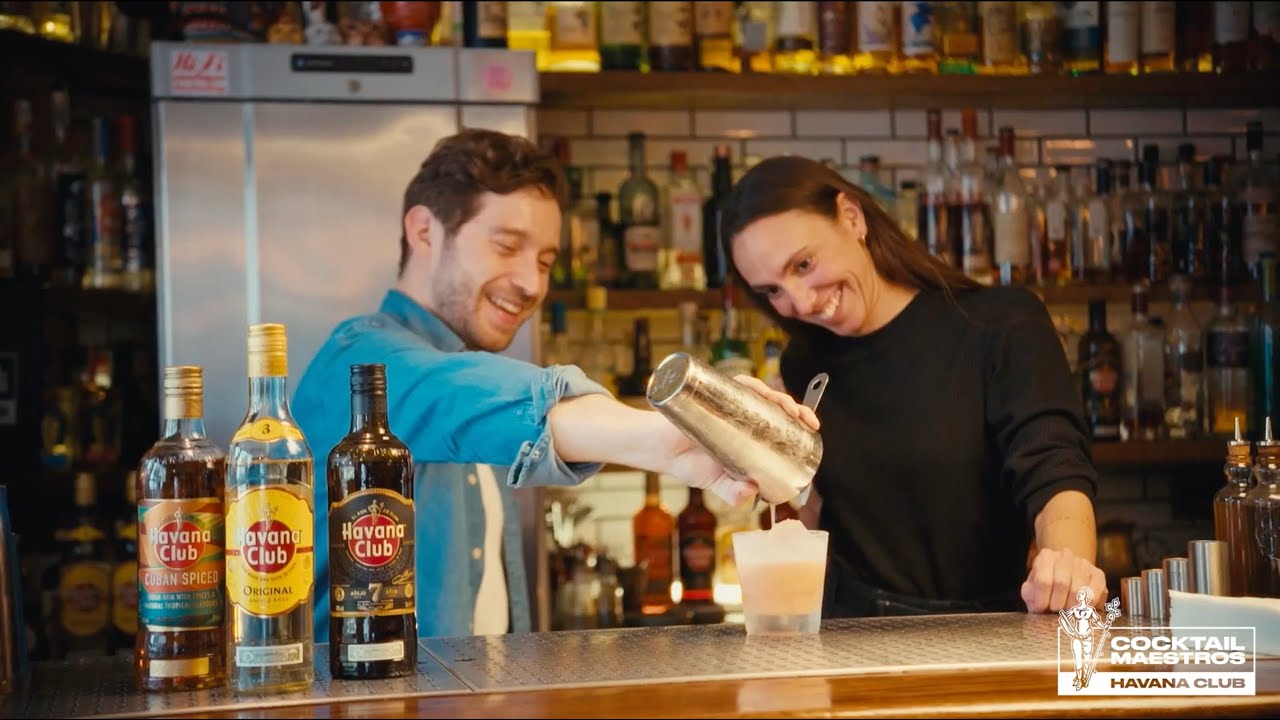
Havana Club Cocktail Maestros: Embracing creativity, teamwork, and Cuban heritage.
The prestigious global cocktail competition's final is held in April at the iconic Hotel Nacional de Cuba.
WHY CHOOSE VISA CUBA?
Great value for money, we are proud to offer the best price in the uk and most of the world. with our transparent pricing policy, you cannot go wrong., no. 1 for over 20 years, we believe in going above and beyond. that is why many customers believe our services are the best out there. just read our reviews ., pink, green and worldwide, we process all kinds of cuba tourist visas (green and pink), which are sent all over the world. we are the only company offering these services..
- Process and Delivery
- Terms of Use
- Privacy Policy
Cookies on GOV.UK
We use some essential cookies to make this website work.
We’d like to set additional cookies to understand how you use GOV.UK, remember your settings and improve government services.
We also use cookies set by other sites to help us deliver content from their services.
You have accepted additional cookies. You can change your cookie settings at any time.
You have rejected additional cookies. You can change your cookie settings at any time.
- Passports, travel and living abroad
- Travel abroad
- Foreign travel advice
Entry requirements
This advice reflects the UK government’s understanding of current rules for people travelling on a full ‘British citizen’ passport from the UK, for the most common types of travel.
The authorities in Cuba set and enforce entry rules. If you’re not sure how these requirements apply to you, contact the Cuban Embassy in the UK .
COVID-19 rules
There are no COVID-19 testing or vaccination requirements for travellers entering Cuba.
Passport validity requirements
To enter Cuba, your passport must have an ‘expiry date’ at least 6 months after the date you arrive and 3 months after your planned departure date.
Check with your travel provider that your passport and other travel documents meet requirements. Renew your passport if you need to.
You will be denied entry if you do not have a valid travel document or try to use a passport that has been reported lost or stolen.
Visa requirements
If you’re visiting Cuba as a tourist, you need to get a tourist card before you travel. Apply through the Cuban Embassy in the UK or check with your travel agent or tour operator.
You must also show proof of onward or return travel. See Cuba’s consular services information for details.
For more information and advice about other types of visas, contact the Cuban Embassy in the UK .
Overstaying your visa
The authorities take any breach of immigration rules seriously. You could be detained if you overstay your visa.
Checks at border control
You must complete the arrival form on the D’Viajeros traveller information portal at least 72 hours before you arrive. You’ll get a QR code to show to the authorities on arrival.
Travelling from the USA to Cuba
Under US law, you are not allowed to travel directly from the USA to Cuba for tourism.
There are 12 reasons or categories for which the USA authorities will approve direct travel from the USA to Cuba. For more information see the US Department of the Treasury website , the US State Department’s travel advice for Cuba and the Code of Federal Regulations .
Travelling from Cuba to the USA
You cannot travel from Cuba to the USA without a US visa.
Vaccine requirements
You must have a certificate to prove you’ve had a yellow fever vaccination if you’re coming from a country listed as a transmission risk .
For full details about medical entry requirements and recommended vaccinations, see TravelHealthPro’s Cuba guide .
Customs rules
There are strict rules about goods you can take into and out of Cuba . You must declare anything that may be prohibited or subject to tax or duty.
Art and antiques
Some art and antiques require an export permit from the Country Heritage Office (‘Bienes Culturales’). Ask the vendor if they have the required permit for the item you are buying. At the airport, you may need to show the receipt.
Photography equipment
You may need an import licence for photography equipment, as well as the appropriate journalism visa.
You are not allowed to bring drones into Cuba. They will be confiscated on arrival and not returned until your departure. The process for getting your drone back could be lengthy.
You cannot take meat products, milk, fresh fruit, vegetables, seeds or organic matter into Cuba, with some exceptions .
Electrical items and GPS on mobiles
Some electrical items with heavy power consumption may be confiscated on entry to Cuba.
Global Positioning Systems ( GPS ) are subject to import requirements. Mobile phones, tablets and laptops can be taken to Cuba, but you must turn off any inbuilt GPS .
Complete a customs form if items are confiscated on your arrival so you can collect them on your departure date.
Taking money into Cuba
The Cuban national peso (CUP – ‘moneda nacional’) is the official currency and cannot be exchanged outside of Cuba. Declare foreign currency you’re taking into Cuba if the value is more than 5,000 US dollars.
You must only exchange money at the Cadeca exchange houses. It is illegal to exchange money anywhere else. See Money .
Related content
Is this page useful.
- Yes this page is useful
- No this page is not useful
Help us improve GOV.UK
Don’t include personal or financial information like your National Insurance number or credit card details.
To help us improve GOV.UK, we’d like to know more about your visit today. We’ll send you a link to a feedback form. It will take only 2 minutes to fill in. Don’t worry we won’t send you spam or share your email address with anyone.
Welcome to the Online Visa Application System of the Republic of Cuba.
Please, find the country where you are to fill out your application
Copyright © 2024. All rights reserved.
Designed By Zymphonies
- Skip to main content
- Skip to "About this site"
Language selection
Search travel.gc.ca.
Help us to improve our website. Take our survey !
COVID-19: travel health notice for all travellers
Cuba travel advice
Latest updates: The Need help? section was updated.
Last updated: March 25, 2024 10:25 ET
On this page
Safety and security, entry and exit requirements, laws and culture, natural disasters and climate, cuba - exercise a high degree of caution.
Exercise a high degree of caution in Cuba due to shortages of basic necessities including food, medicine and fuel.
Resort areas - Take normal security precautions
- Cayo Largo del Sur
- Cayo Santa Maria
Guardalavaca
Back to top
Petty crime
Petty crime, such as pickpocketing and purse snatching, occurs.
Theft generally occurs in crowded places such as:
- tourist areas
- public buses
- night clubs
It can also occur in isolated areas.
Theft from hotel rooms, particularly in private accommodations ( casas particulares ), and from cars is common.
- Ensure that your personal belongings, including your passport and other travel documents, are secure at all times
- Don’t pack valuables in your checked luggage
- Avoid showing signs of affluence
- Keep electronic devices out of sight
- Carry valid identification at all times
- Keep a digital and a hard copy of your ID and travel documents
- Avoid carrying large amounts of cash
- Never leave belongings unattended in a vehicle, even in the trunk
Violent crime
Incidents of violent crime are not frequent, but assaults may occur. They mainly occur during a burglary or robbery.
- Stay in accommodations with good security
- Keep your windows and doors locked at all times
- If threatened by robbers, don't resist
Credit card and ATM fraud may occur.
Be cautious when using debit or credit cards:
- pay careful attention when your cards are being handled by others
- use ATMs located in well-lit public areas or inside a bank or business
- avoid using card readers with an irregular or unusual feature
- cover the keypad with one hand when entering your PIN
- check for any unauthorized transactions on your account statements
Some businesses may try to charge exorbitant prices, namely taxis and classic car rentals. Disputes about overcharging may lead to violence.
- Always confirm prices before consuming or taking up a service
- Avoid running a tab
- Avoid leaving your credit card with bar or restaurant staff
- Check your bill to make sure it’s exact
Some hustlers specialize in defrauding tourists. Most of them speak some English or French and go out of their way to appear friendly. They may offer to serve as tour guides or to facilitate the purchase of cigars. Some have used violence in their efforts to steal tourists.
Fraudulent tour agents and taxi drivers also operate throughout the country, including at Havana’s international airport. Thefts of luggage from taxi trunks have occurred.
In bars, sex workers, including minors, may be very persistent and intrusive with tourists who refuse their advances. Foreigners, including Canadians, have been the victim of theft after engaging in sexual relations, and some of them have faced child sex accusations.
- Use reputable tour operators and registered taxis only
- Avoid independent street vendors
- Be wary of strangers who seem too friendly
Overseas fraud
Cuba faces chronic and severe shortages of basic necessities, including:
- bottled water
- public water supply
- hard-currency
Fuel shortages are currently critical and affect a wide range of services. Travelling across the island is extremely challenging. Public transportation services, including taxis, are often disrupted, leaving tourists with few options to travel. Some travellers have been temporarily stranded with a rental car. Intermittent shortages of tap water provided by municipalities happen, including in Havana and in resorts.
Hotels and resorts, that often use generators during power outages, may not be able to maintain their services. Fuel shortages may also affect government services.
Local authorities enforce the rationing of food and medications, which could also affect travellers.
Shortages may lead to disruptions to other essential services. There are often long line-ups at gas stations that have led to altercations.
- Plan accordingly
- Bring some basic necessities with you such as toiletries and medication
- Keep a supply of water, food and fuel on hand
- Make sure you always have access to a complete emergency kit
Power outages
Power outages occur regularly outside of Havana and touristic areas.
Obtaining services during an outage is challenging.
Women’s safety
Women travelling alone may be subject to some forms of sexual harassment
Incidents of sexual assault against Canadian women have occurred, including at beach resorts.
If you’re the victim of a sexual assault, you should report it immediately to the nearest Canadian consulate or embassy and seek medical assistance. You should also report the incident to Cuban authorities and ensure that local police provide you with a Comprobante de Denuncia. This document confirms that a report has been filed.
A criminal investigation will likely not be possible if no formal complaint is made to Cuban authorities before you depart the country.
Police officers may speak only Spanish.
Advice for women travellers
Spiked food and drinks
Snacks, beverages, gum and cigarettes may contain drugs that could put you at risk of sexual assault and robbery.
- Be wary of accepting these items from new acquaintances
- Never leave food or drinks unattended or in the care of strangers
Telecommunications
The telecommunications network in Cuba is poor. Connections are unreliable and may be intermittent.
Some Canadian cell phones may not work, even in large cities. Internet access is limited across the island.
Local authorities control telecommunications. They may block access to mobile phone and Internet in case of civil unrest or before demonstrations.
- Don’t rely on your mobile phone for emergencies, especially outside major cities
- Subscribe to and install a VPN service before leaving Canada
- Avoid travelling alone
- Inform a family member or friend of your itinerary
Online transactions
Online banking or shopping may be challenging in Cuba, if at all possible. Most Cuban websites are unsecure. Many are inaccessible.
Some travellers, who bought their travel package online on a travel website in Canada, found out on arrival in Cuba that their hotel received no reservation or payment.
- Avoid online shopping
- Check with the hotel if they accept online reservations and payments if you plan to book online
Demonstrations
Demonstrations sometimes occur, even if taking part in them may be illegal. Local authorities will break up political demonstrations or gatherings not sanctioned by the government. They may also block access to the Internet, including social media, without notice.
Even peaceful demonstrations can turn violent at any time. They can also lead to disruptions to traffic, public transportation.
- Don’t participate in demonstrations
- Avoid areas where demonstrations and large gatherings are taking place
- Follow the instructions of local authorities
- Monitor local media for information on ongoing demonstrations
Mass gatherings (large-scale events)
Water activities
Rescue services may not be consistent with international standards. Tidal changes can cause powerful currents, and riptides are common. Not all beaches have lifeguards or warning flags to warn of hazardous conditions.
- Never swim alone or after hours
- Don’t swim outside marked areas
- Monitor weather warnings
- Avoid visiting beaches or coastal areas during periods of severe weather warnings
- Don’t dive into unknown water, as hidden rocks or shallow depths can cause serious injury or death
- Consult residents and tour operators for information on possible hazards and safe swimming areas
Tour operators and diving centres may not adhere to international standards.
If you undertake adventure sports, such as diving:
- choose a reputable company that has insurance
- ensure that your travel insurance covers the recreational activities you choose
- don’t use the equipment if you have any doubts about its safety
Recreational boating
If you are planning to go boating:
- know the navigation rules
- make sure life jackets are available for all passengers
- follow safe practices for all water activities such as jet-skiing, water-skiing or fishing
- don’t overload your boat capacity
- carry a VHF marine radio that will generate your position in case of emergency
- be prepared for emergencies
Water safety abroad
Road safety
Road safety standards are poor throughout the country. Accidents causing fatalities are common.
Road conditions
Road conditions are poor throughout the island, with the exception of the Central Highway, which runs west to east across the country. Driving may be dangerous due to:
- poorly maintained roads
- lack of signage
- Inadequate lighting
- roaming livestock
- horse-drawn carts
- pedestrians
- slow-moving traffic
Most Cuban cars are old and in poor condition. They often lack standard safety equipment. Some cars and most bicycles don’t have functioning lights.
Driving habits
Some drivers don’t respect traffic laws. Many of them, driving an electric vehicle for which licence and registration are not required, are inexperienced and unqualified. Drinking and driving is also common.
If you choose to drive in Cuba:
- do so defensively at all times
- avoid travelling at night
- travel in groups when possible
- never pick up hitchhikers, who have been known to assault drivers
Public transportation
City buses are scarce, overcrowded and poorly maintained. Bus service is not reliable.
Incidents of pickpocketing are frequent.
Tour companies offer good bus service between airports and the all-inclusive resorts. Buses used for organized day trips from hotels are usually in good condition.
Official taxis are generally reliable.
Old-model private vehicles offered as taxis are not equipped with standard safety features. They have no insurance coverage for passengers in case of an accident.
- Use only registered taxis
- Avoid flagging a taxi down on the street
- Never share a taxi with strangers
- Agree on a fare before departure, as taxis are not equipped with meters
The rail network is comprehensive, connecting most of the island, but it’s unreliable and slow. Train service is limited to Cuban nationals only.
Health incidents
The Government of Canada continues to investigate the potential causes of unexplained health incidents reported by some Canadian diplomatic staff and dependents posted to Havana.
There is no evidence that Canadian travellers to Cuba are at risk.
We do not make assessments on the compliance of foreign domestic airlines with international safety standards.
Information about foreign domestic airlines
Every country or territory decides who can enter or exit through its borders. The Government of Canada cannot intervene on your behalf if you do not meet your destination’s entry or exit requirements.
We have obtained the information on this page from the Cuban authorities. It can, however, change at any time.
Verify this information with the Foreign Representatives in Canada .
Entry requirements vary depending on the type of passport you use for travel.
Before you travel, check with your transportation company about passport requirements. Its rules on passport validity may be more stringent than the country’s entry rules.
Regular Canadian passport
Your passport must be valid for the expected duration of your stay in Cuba.
Passport for official travel
Different entry rules may apply.
Official travel
Passport with “X” gender identifier
While the Government of Canada issues passports with an “X” gender identifier, it cannot guarantee your entry or transit through other countries. You might face entry restrictions in countries that do not recognize the “X” gender identifier. Before you leave, check with the closest foreign representative for your destination.
Other travel documents
Different entry rules may apply when travelling with a temporary passport or an emergency travel document. Before you leave, check with the closest foreign representative for your destination.
Useful links
- Foreign Representatives in Canada
- Canadian passports
Tourist visa: required Family visa: required Business visa: required
Tourist card
Canadian tourists travelling to Cuba need a visa, known as tourist card. The tourist card allows you to stay in Cuba for up to 90 days. The tourist card is generally included in holiday packages provided by tour operators or airlines providing direct flights from Canada. If you go to Cuba on your own or transit via another country, you are responsible for obtaining the tourist card from a Cuban government office in Canada. You may also buy it at some airports in Canada and in the United States.
Length of stay
As a Canadian tourist, you may stay in Cuba for up to 6 months.
However, you must obtain an extension of stay if you intend to stay longer than the initial 90-day period allowed by the standard tourist card.
D’Viajeros traveller information portal – Government of Cuba
Arrival form
You must provide information on your arrival in Cuba via an online form within 72 hours before entering the country.
Once done, you will receive a QR code by email.
You must show an electronic or printed version of the QR code to authorities upon arrival.
Health insurance
You must show proof of valid health insurance to enter Cuba.
All health insurance policies are recognized in Cuba, except those issued by U.S. insurance companies. However, the Cuban immigration authorities will decide which proof of health insurance is acceptable.
Proof of health insurance may be:
- an insurance policy
- an insurance certificate
- a Canadian provincial health insurance card
If you don’t have proof of health insurance or if the proof you present doesn’t satisfy the Cuban immigration authorities, you may have to obtain health insurance from a Cuban insurance company upon arrival. This insurance may have limited coverage. Local authorities may refuse your entry to the country.
Canadian provincial health care coverage provides very limited coverage outside Canada. It won’t pay for medical bills up-front. It does not include air evacuation, and neither does Cuban health insurance.
Cuban authorities won’t let you leave the country with outstanding medical bills, which are payable by credit card only. You will need to remain in Cuba until all debts are paid.
- Make sure you purchase the best health insurance you can afford
- Ensure the insurance includes medical evacuation and hospital stays
More on Travel insurance
Other entry requirements
Customs officials will ask you to show them:
- a return or onward ticket
- proof of sufficient funds to cover your stay
- proof that you have a place to stay if arriving with “air only” tickets
Dual citizenship
If you’re both a Canadian and Cuban citizen, you must:
- present your valid Cuban passport to the immigration authorities to enter Cuba
- have a valid Canadian passport to return to Canada
If you were born in Cuba, you should contact a Cuban government office in Canada before you leave to ensure compliance with Cuban regulations, regardless of your current citizenship. Failure to do so may result in your being refused entry into Cuba or being detained upon entry.
Canadian permanent residents
You will not be able to leave Cuba if you are a Canadian permanent resident and are without a valid permanent resident card. If your card is lost or stolen, you must contact the Canadian Embassy in Havana to obtain a travel document that will allow you to leave the country. This procedure can take up to 10 working days. Once the document is ready, you'll need to make an appointment with the immigration section of the Canadian Embassy in Havana to collect it before returning to Canada.
Permanent resident travel document: How to apply
Health screening
You may be subjected to a medical screening or interrogation by public health authorities when you enter or exit Cuba, or when reporting for domestic flights.
You may be subject to a mandatory quarantine for medical observation for up to 7 days if local authorities believe that:
- you have come in contact with a suspected carrier of one of these viruses
- you’re arriving from a country with a known epidemic
Children and travel
- Travelling with children
Yellow fever
Learn about potential entry requirements related to yellow fever (vaccines section).
Relevant Travel Health Notices
- Global Measles Notice - 13 March, 2024
- Zika virus: Advice for travellers - 31 August, 2023
- COVID-19 and International Travel - 13 March, 2024
This section contains information on possible health risks and restrictions regularly found or ongoing in the destination. Follow this advice to lower your risk of becoming ill while travelling. Not all risks are listed below.
Consult a health care professional or visit a travel health clinic preferably 6 weeks before you travel to get personalized health advice and recommendations.
Routine vaccines
Be sure that your routine vaccinations , as per your province or territory , are up-to-date before travelling, regardless of your destination.
Some of these vaccinations include measles-mumps-rubella (MMR), diphtheria, tetanus, pertussis, polio, varicella (chickenpox), influenza and others.
Pre-travel vaccines and medications
You may be at risk for preventable diseases while travelling in this destination. Talk to a travel health professional about which medications or vaccines may be right for you, based on your destination and itinerary.
Yellow fever is a disease caused by a flavivirus from the bite of an infected mosquito.
Travellers get vaccinated either because it is required to enter a country or because it is recommended for their protection.
- There is no risk of yellow fever in this country.
Country Entry Requirement*
- Proof of vaccination is required if you are coming from or have transited through an airport of a country where yellow fever occurs.
Recommendation
- Vaccination is not recommended.
- Discuss travel plans, activities, and destinations with a health care professional.
- Contact a designated Yellow Fever Vaccination Centre well in advance of your trip to arrange for vaccination.
About Yellow Fever
Yellow Fever Vaccination Centres in Canada * It is important to note that country entry requirements may not reflect your risk of yellow fever at your destination. It is recommended that you contact the nearest diplomatic or consular office of the destination(s) you will be visiting to verify any additional entry requirements.
There is a risk of hepatitis A in this destination. It is a disease of the liver. People can get hepatitis A if they ingest contaminated food or water, eat foods prepared by an infectious person, or if they have close physical contact (such as oral-anal sex) with an infectious person, although casual contact among people does not spread the virus.
Practise safe food and water precautions and wash your hands often. Vaccination is recommended for all travellers to areas where hepatitis A is present.
Measles is a highly contagious viral disease. It can spread quickly from person to person by direct contact and through droplets in the air.
Anyone who is not protected against measles is at risk of being infected with it when travelling internationally.
Regardless of where you are going, talk to a health care professional before travelling to make sure you are fully protected against measles.
Hepatitis B is a risk in every destination. It is a viral liver disease that is easily transmitted from one person to another through exposure to blood and body fluids containing the hepatitis B virus. Travellers who may be exposed to blood or other bodily fluids (e.g., through sexual contact, medical treatment, sharing needles, tattooing, acupuncture or occupational exposure) are at higher risk of getting hepatitis B.
Hepatitis B vaccination is recommended for all travellers. Prevent hepatitis B infection by practicing safe sex, only using new and sterile drug equipment, and only getting tattoos and piercings in settings that follow public health regulations and standards.
The best way to protect yourself from seasonal influenza (flu) is to get vaccinated every year. Get the flu shot at least 2 weeks before travelling.
The flu occurs worldwide.
- In the Northern Hemisphere, the flu season usually runs from November to April.
- In the Southern Hemisphere, the flu season usually runs between April and October.
- In the tropics, there is flu activity year round.
The flu vaccine available in one hemisphere may only offer partial protection against the flu in the other hemisphere.
The flu virus spreads from person to person when they cough or sneeze or by touching objects and surfaces that have been contaminated with the virus. Clean your hands often and wear a mask if you have a fever or respiratory symptoms.
In this destination, rabies is carried by dogs and some wildlife, including bats. Rabies is a deadly disease that spreads to humans primarily through bites or scratches from an infected animal. While travelling, take precautions , including keeping your distance from animals (including free-roaming dogs), and closely supervising children.
If you are bitten or scratched by an animal while travelling, immediately wash the wound with soap and clean water and see a health care professional. Rabies treatment is often available in this destination.
Before travel, discuss rabies vaccination with a health care professional. It may be recommended for travellers who are at high risk of exposure (e.g., occupational risk such as veterinarians and wildlife workers, children, adventure travellers and spelunkers, and others in close contact with animals).
Coronavirus disease (COVID-19) is an infectious viral disease. It can spread from person to person by direct contact and through droplets in the air.
It is recommended that all eligible travellers complete a COVID-19 vaccine series along with any additional recommended doses in Canada before travelling. Evidence shows that vaccines are very effective at preventing severe illness, hospitalization and death from COVID-19. While vaccination provides better protection against serious illness, you may still be at risk of infection from the virus that causes COVID-19. Anyone who has not completed a vaccine series is at increased risk of being infected with the virus that causes COVID-19 and is at greater risk for severe disease when travelling internationally.
Before travelling, verify your destination’s COVID-19 vaccination entry/exit requirements. Regardless of where you are going, talk to a health care professional before travelling to make sure you are adequately protected against COVID-19.
Safe food and water precautions
Many illnesses can be caused by eating food or drinking beverages contaminated by bacteria, parasites, toxins, or viruses, or by swimming or bathing in contaminated water.
- Learn more about food and water precautions to take to avoid getting sick by visiting our eat and drink safely abroad page. Remember: Boil it, cook it, peel it, or leave it!
- Avoid getting water into your eyes, mouth or nose when swimming or participating in activities in freshwater (streams, canals, lakes), particularly after flooding or heavy rain. Water may look clean but could still be polluted or contaminated.
- Avoid inhaling or swallowing water while bathing, showering, or swimming in pools or hot tubs.
Travellers' diarrhea is the most common illness affecting travellers. It is spread from eating or drinking contaminated food or water.
Risk of developing travellers' diarrhea increases when travelling in regions with poor standards of hygiene and sanitation. Practise safe food and water precautions.
The most important treatment for travellers' diarrhea is rehydration (drinking lots of fluids). Carry oral rehydration salts when travelling.
Typhoid is a bacterial infection spread by contaminated food or water. Risk is higher among children, travellers going to rural areas, travellers visiting friends and relatives or those travelling for a long period of time.
Travellers visiting regions with a risk of typhoid, especially those exposed to places with poor sanitation, should speak to a health care professional about vaccination.
Salmonellosis is a common illness among travellers to this country. It can be spread through contaminated food or beverages, such as raw or undercooked poultry and eggs, as well as fruits or vegetables.
Practice safe food and water precautions . This includes only eating food that is properly cooked and still hot when served.
Pregnant women, children under 5 years of age, those over 60 years of age, and those with weakened immune systems are at greater risk of becoming seriously ill.
Most people recover on their own without medical treatment and from proper rehydration (drinking lots of fluids).
- Carry oral rehydration salts when travelling.
Travellers with severe symptoms should consult a health care professional as soon as possible.
Insect bite prevention
Many diseases are spread by the bites of infected insects such as mosquitoes, ticks, fleas or flies. When travelling to areas where infected insects may be present:
- Use insect repellent (bug spray) on exposed skin
- Cover up with light-coloured, loose clothes made of tightly woven materials such as nylon or polyester
- Minimize exposure to insects
- Use mosquito netting when sleeping outdoors or in buildings that are not fully enclosed
To learn more about how you can reduce your risk of infection and disease caused by bites, both at home and abroad, visit our insect bite prevention page.
Find out what types of insects are present where you’re travelling, when they’re most active, and the symptoms of the diseases they spread.
There is a risk of chikungunya in this country. The risk may vary between regions of a country. Chikungunya is a virus spread through the bite of an infected mosquito. Chikungunya can cause a viral disease that typically causes fever and pain in the joints. In some cases, the joint pain can be severe and last for months or years.
Protect yourself from mosquito bites at all times. There is no vaccine available for chikungunya.
- In this country, dengue is a risk to travellers. It is a viral disease spread to humans by mosquito bites.
- Dengue can cause flu-like symptoms. In some cases, it can lead to severe dengue, which can be fatal.
- The level of risk of dengue changes seasonally, and varies from year to year. The level of risk also varies between regions in a country and can depend on the elevation in the region.
- Mosquitoes carrying dengue typically bite during the daytime, particularly around sunrise and sunset.
- Protect yourself from mosquito bites . There is no vaccine or medication that protects against dengue.
Zika virus is a risk in this country.
Zika virus is primarily spread through the bite of an infected mosquito. It can also be sexually transmitted. Zika virus can cause serious birth defects.
During your trip:
- Prevent mosquito bites at all times.
- Use condoms correctly or avoid sexual contact, particularly if you are pregnant.
If you are pregnant or planning a pregnancy, you should discuss the potential risks of travelling to this destination with your health care provider. You may choose to avoid or postpone travel.
For more information, see Zika virus: Pregnant or planning a pregnancy.
Animal precautions
Some infections, such as rabies and influenza, can be shared between humans and animals. Certain types of activities may increase your chance of contact with animals, such as travelling in rural or forested areas, camping, hiking, and visiting wet markets (places where live animals are slaughtered and sold) or caves.
Travellers are cautioned to avoid contact with animals, including dogs, livestock (pigs, cows), monkeys, snakes, rodents, birds, and bats, and to avoid eating undercooked wild game.
Closely supervise children, as they are more likely to come in contact with animals.
Person-to-person infections
Stay home if you’re sick and practise proper cough and sneeze etiquette , which includes coughing or sneezing into a tissue or the bend of your arm, not your hand. Reduce your risk of colds, the flu and other illnesses by:
- washing your hands often
- avoiding or limiting the amount of time spent in closed spaces, crowded places, or at large-scale events (concerts, sporting events, rallies)
- avoiding close physical contact with people who may be showing symptoms of illness
Sexually transmitted infections (STIs) , HIV , and mpox are spread through blood and bodily fluids; use condoms, practise safe sex, and limit your number of sexual partners. Check with your local public health authority pre-travel to determine your eligibility for mpox vaccine.
Medical services and facilities
Good health care is limited in availability.
The health system is government-owned. The Cuban government operates hospitals and clinics throughout the island.
Medical professionals are generally adequately trained. However, facilities are in poor condition. They lack basic drugs, medical supplies and equipment. Hygiene practices may be inadequate.
Medical services are also available at most hotels and international clinics located in resort areas, where doctors and nurses provide initial emergency medical care reserved for foreigners. Health care provided in those clinics is usually better than services offered in public facilities.
Mental health care facilities are extremely limited. There are no hotlines available for this type of care in the country.
Emergency and ambulance services are limited. Response times may be slow, especially outside tourist areas.
Make sure you get travel insurance that includes coverage for medical evacuation and hospital stays.
Travel health and safety
Many prescription medications may not be available in Cuba.
If you take prescription medication, you’re responsible for determining their legality in the country.
- Bring enough of your medication with you
- Always keep your medication in the original container
- Pack your medication in your carry-on luggage
- Carry a paper and an electronic copy of your prescriptions
Cuba faces severe medicine shortages, including antibiotics and common pain killers. In addition of your prescription medication, you should also bring your own basic medicine in sufficient quantities to last beyond the length of your intended stay.
Public health authorities implement insect control measures including periodic fumigation and aerial spraying.
- Consult your doctor before traveling to see if the situation could affect you, especially if you suffer from respiratory ailments
- Stay away from a nearby fumigation process
Death abroad
Standards of mortuary services in Cuba differ from those in Canada. Cultural and religious beliefs are not taken into consideration. Autopsies are mandatory.
There is one funeral home and one morgue in the country which cater to foreigners. Both are located in Havana. Only these facilities have the authorization to issue appropriate documentation to accompany human remains. Timelines for the repatriation of human remains are long and costly.
The capacity for refrigeration is limited, as well as the availability of coffins and urns. Embalming materials and techniques are unlike those in Canada. Embalming may not be an option in some circumstances.
Ensure your insurance includes coverage for the repatriation of human remains.
Death Abroad Factsheet
Keep in Mind...
The decision to travel is the sole responsibility of the traveller. The traveller is also responsible for his or her own personal safety.
Be prepared. Do not expect medical services to be the same as in Canada. Pack a travel health kit , especially if you will be travelling away from major city centres.
You must abide by local laws.
Learn about what you should do and how we can help if you are arrested or detained abroad .
Transfer to a Canadian prison
Canada and Cuba accede the Treaty between the Government of Canada and the Government of the Republic of Cuba on the Serving of Penal Sentences. This enables a Canadian imprisoned in Cuba to request a transfer to a Canadian prison to complete a sentence. The transfer requires the agreement of both Canadian and Cuban authorities. This process can take a long time, and there is no guarantee that the transfer will be approved by either or both sides.
Cuban criminal justice
The criminal justice system in Cuba differs significantly from that in Canada. Charges are not laid until the investigation is complete. If you’re arrested in Cuba, you will likely be detained during the entire period of investigation. You should expect long delays to resolve your case. You will not be allowed to leave the country during this period.
Cuba’s constitution allows the death penalty, but since 2003, the country has effectively had a moratorium on carrying out death sentences.
Investments
Private property rights in Cuba are strictly controlled. Only Cubans and permanent residents can buy a property in Cuba or register a privately owned vehicle. Be wary of strangers or acquaintances offering to purchase these items on your behalf. If you plan on making investments in Cuba, seek legal advice in Canada and Cuba. Do so before making commitments. Related disputes could take time and be costly to resolve.
Penalties for possession, use or trafficking of illegal drugs are severe. Convicted offenders can expect lengthy prison sentences.
- Pack your own luggage and monitor it closely at all times
- Don’t transport other people’s packages, bags or suitcases
Drugs, alcohol and travel
Child sex tourism
It's a serious criminal offence to have sex with minors in Cuba.
Local authorities are actively working to prevent child sex tourism. Tourists, including Canadians, have been convicted of offences related to the corruption of minors aged 16 and under.
Prison sentences for this type of crime range from 7 to 25 years. Release on bail before trial is unlikely.
Child Sex Tourism: It’s a Crime
To get married in Cuba, you must provide several documents including:
- your birth certificate
- a copy of your passport
- your decree absolute certificate if divorced
- a death certificate for your spouse and a marriage certificate if widowed
- an affidavit of your single status if you have never been married before
All documents must be translated into Spanish, certified, authenticated and legalised by the Embassy of Cuba in Canada.
Consult the Embassy of Cuba in Canada if you wish to marry in Cuba, including to a Cuban national.
- Foreign diplomatic missions and consulates in Canada
- Marriage overseas factsheet
Drones are prohibited.
They will be confiscated by the authorities upon entry.
Photography
Professional photographers require a visa to work in Cuba. They may also need a permit to import their equipment.
It’s forbidden to photograph, including with drones:
- military and police installations or personnel
- harbour, rail and airport facilities
Military zones and any other restricted or heavily guarded areas are not always identified.
Identification
Authorities may request to see your ID at any time.
- Keep a photocopy of your passport in case it’s lost or seized
- Keep a digital copy of your ID and travel documents
Dual citizenship is not legally recognized in Cuba.
If local authorities consider you a citizen of Cuba, they may refuse to grant you access to Canadian consular services. This will prevent us from providing you with those services.
Travellers with dual citizenship
International Child Abduction
The Hague Convention on the Civil Aspects of International Child Abduction is an international treaty. It can help parents with the return of children who have been removed to or retained in certain countries in violation of custody rights. It does not apply between Canada and Cuba.
If your child was wrongfully taken to, or is being held in Cuba by an abducting parent:
- act as quickly as you can
- consult a lawyer in Canada and in Cuba to explore all the legal options for the return of your child
- report the situation to the nearest Canadian government office abroad or to the Vulnerable Children’s Consular Unit at Global Affairs Canada by calling the Emergency Watch and Response Centre.
If your child was removed from a country other than Canada, consult a lawyer to determine if The Hague Convention applies.
Be aware that Canadian consular officials cannot interfere in private legal matters or in another country’s judicial affairs.
- International Child Abduction: A Guidebook for Left-Behind Parents
- Canadian embassies and consulates by destination
- Emergency Watch and Response Centre
Imports and exports
Personal effects and medicine.
Tourists are allowed to enter Cuba with personal effects but items entering the country for donations may be subject to import rules. They could be seized and taxed in accordance with local legislation. This includes:
- new or used material goods
- personal care products
- medications
Cuban customs officials have the authority to decide what they deem to be for the tourist's personal use. They may apply steep tariffs for personal baggage exceeding the allowable weight.
You may export:
- up to 20 cigars without documentation
- up to 50 cigars if they are in their original container, closed and sealed with the official hologram
If exceeding these amounts, you must provide a guarantee of origin certificate.
Failure to comply with this regulation will lead to the seizure of the cigars without compensation.
Art objects
Art objects, including artifacts and paintings purchased in Cuba, must be accompanied by an export permit. It’s usually provided by state-owned galleries.
In the absence of such a permit, items must be registered with the Registro Nacional de Bienes Culturales.
Ministry of Culture – Government of Cuba
Electronic devices
Electronic devices with GPS technology may be confiscated upon entry and returned upon departure.
Satellite telephones are forbidden.
Electronic cigarettes and personal vaporizers
You cannot bring electronic cigarettes or personal vaporizers to Cuba.
Customs officials will seize these items upon arrival.
Black market
Street vendors may offer you black-market goods, such as cigars, or ask to change dollars for Cuban currency.
Engaging in black-market transactions is illegal and can lead to difficulties with the Cuban authorities.
Cuban Customs Administration – Government of Cuba
Boat traffic
The U.S. government closely monitors boat traffic in the Straits of Florida. It will seize any vessel not bearing a licence from the Office of Foreign Assets Control (OFAC) if it believes it’s headed for Cuba.
You’re subject to these measures if you dock your Canadian-registered boat in Florida. You’ll be exempted if you are simply en route to Cuba via the U.S.
If travelling by boat to Cuba from the US:
- Make sure to know the regulation related to docking and port controls
- Expect thorough search and interrogations
You should carry an international driving permit.
International Driving Permit
Traffic accidents
Traffic accidents have led to arrest and detentions of Canadians in the past.
Accidents resulting in death or injury are treated as crimes. The onus is on the driver to prove innocence. If you’re found to bear responsibility in a traffic accident resulting in serious injury or death, you may face up to 10 years in prison.
If you’re involved in an accident:
- don’t leave the scene
- don’t move your vehicle
- call the police
While car insurance is mandatory for foreign drivers and foreign-registered vehicles, it's not for Cuban citizens. As a result, most local drivers don't carry a car insurance. You shouldn’t expect compensation for vehicle damage or personal injury from a Cuban driver following a car accident.
Vehicle rentals
Car insurance coverage in Cuba differs from that in Canada.
Rental agencies are government-controlled. If you’re found to be at fault in an accident, the rental agency will nullify your coverage and seek compensation to cover the cost of repairs.
Cuban authorities can prohibit you from leaving the country unless the rental agency receives payment or until all claims associated with an accident are settled.
Contract agreements don’t cover occasional drivers. As a result, the signatory is responsible for all people driving the vehicle.
- Be cautious if you rent a vehicle in Cuba
- Avoid renting a scooter; thieves target them and you may be responsible for the cost of its replacement
- Make sure to obtain a receipt when returning a rental vehicle
The currency of Cuba is the Cuban peso (CUP).
Credit cards issued by U.S. financial institutions or affiliated with U.S. banks are not accepted in Cuba.
Canadian credit cards are increasingly accepted at restaurants and hotels. However, the system is unreliable and bank cards may not work or may stop working without notice.
ATMs are rare and also unreliable. Each withdrawal is limited to 5 000 CUP, when possible.
You may obtain credit card cash advances at banks, hotels or a state-run exchange bureau, but in CUP only.
When travelling to Cuba, you should plan to bring enough currency to cover the duration of your stay. You should also plan for small bank notes to facilitate daily transactions such as, street food, taxis and tips.
You can easily exchange Canadian and American dollars, as well as euros for CUP at:
- the money exchange bureaus in Cuba’s international airports
- major hotels
- official exchange bureaus
It’s illegal to change money on the street or anywhere else other than authorized entities.
You cannot go through Cuban customs with more than 5 000 CUP.
Hurricane season
Hurricanes usually occur from mid-May to the end of November. During this period, even small tropical storms can quickly develop into major hurricanes.
These severe storms can put you at risk and hamper the provision of essential services.
If you decide to travel to a coastal area during the hurricane season:
- know that you expose yourself to serious safety risks
- be prepared to change your travel plans on short notice, including cutting short or cancelling your trip
- stay informed of the latest regional weather forecasts
- carry emergency contact information for your airline or tour operator
- follow the advice and instructions of local authorities
- Tornadoes, cyclones, hurricanes, typhoons and monsoons
- Large-scale emergencies abroad
- Active storm tracking and hurricane watches and warnings - United States’ National Hurricane Center
Rainy season
The rainy season extends from April to October.
Seasonal flooding can hamper overland travel and reduce the delivery of essential services. Roads may become impassable due to mudslides and landslides. Bridges, buildings, and infrastructure may be damaged.
Earthquakes
Cuba is located in an active seismic zone.
Earthquakes may occur. Even minor earthquakes can cause significant damage.
In the event of an earthquake:
- monitor local media to stay informed of the evolving situation
- follow the instructions of local authorities, including evacuation orders
- Earthquakes – What to Do?
- Latest earthquakes - U.S. Geological Survey
Local services
In case of emergency, dial:
- police: 106
- medical assistance: 104
- firefighters: 105
Consular assistance
For emergency consular assistance, call the Embassy of Canada to Cuba, in Havana, and follow the instructions. At any time, you may also contact the Emergency Watch and Response Centre in Ottawa.
The decision to travel is your choice and you are responsible for your personal safety abroad. We take the safety and security of Canadians abroad very seriously and provide credible and timely information in our Travel Advice to enable you to make well-informed decisions regarding your travel abroad.
The content on this page is provided for information only. While we make every effort to give you correct information, it is provided on an "as is" basis without warranty of any kind, expressed or implied. The Government of Canada does not assume responsibility and will not be liable for any damages in connection to the information provided.
If you need consular assistance while abroad, we will make every effort to help you. However, there may be constraints that will limit the ability of the Government of Canada to provide services.
Learn more about consular services .
Risk Levels
take normal security precautions.
Take similar precautions to those you would take in Canada.
Exercise a high degree of caution
There are certain safety and security concerns or the situation could change quickly. Be very cautious at all times, monitor local media and follow the instructions of local authorities.
IMPORTANT: The two levels below are official Government of Canada Travel Advisories and are issued when the safety and security of Canadians travelling or living in the country or region may be at risk.
Avoid non-essential travel
Your safety and security could be at risk. You should think about your need to travel to this country, territory or region based on family or business requirements, knowledge of or familiarity with the region, and other factors. If you are already there, think about whether you really need to be there. If you do not need to be there, you should think about leaving.
Avoid all travel
You should not travel to this country, territory or region. Your personal safety and security are at great risk. If you are already there, you should think about leaving if it is safe to do so.

What You Need To Be Aware Of As A Tourist Visiting Cuba
B eaches with white sand as fine as sugar, vintage American cars cruising down streets lined by colorful aging buildings, and the chance to puff on a fine cigar while watching people dance the salsa in the warm night air: It's not hard to understand the picture-postcard allure of Cuba. It's a country in the throes of rapid change as it emerges back onto the world stage after decades of stagnation following the 1959 revolution. So now is a wonderful time to pack your dancing shoes and visit the Caribbean's largest island.
However, Cuba isn't an uncomplicated tropical paradise and there are several things you need to be aware of before you visit as a tourist. Like, as an American, is it even legal for you to visit Cuba as a tourist? What's with the money situation? And can you access the internet or are you going back to the Stone Age (also known as the early 1990s)?
Can Americans Visit Cuba?
Cuba is just 103 miles from the tip of Florida making it the ideal winter getaway for sun-seeking Americans. However, the U.S. imposed restrictions on travel to Cuba in 1963 and while the level of restrictions has varied over the years, as of July 2023, Americans can't visit Cuba purely for tourism purposes.
That said, there are 12 categories of authorized travel to Cuba, and the one that most Americans visiting the island use is the "support for the Cuban people" category. You'll need a passport with six months validity at the time of entry and two blank pages. You also need a Cuban Tourist Card, which you can usually get from your airline for as little as $50.
Speaking of airlines, you can fly direct to Cuba from several U.S. cities, including Miami, Tampa, New York City , and Houston. Most direct flights from the U.S. land in the Cuban capital of Havana, though there are several nonstop flights from Miami to other destinations in the country, including Santiago de Cuba and the popular beach resort of Varadero.
Cuban Currency
There's good news and, let's say, tricky news when it comes to paying for things in Cuba. The good news is that there is now one currency used by residents and visitors alike in the country: the Cuban peso (CUP). The Cuban convertible peso (CUC), which used to be the currency used by tourists, was eliminated in 2021.
The only official place you can exchange currency in Cuba is at Cadeca exchange houses. You cannot get CUP outside of Cuba, nor should you take the currency home with you. Spend or exchange anything you have left over before you go to the airport (after security, you should pay in foreign currency).
What about credit cards? U.S. credit and debit cards won't work in Cuba. Credit cards from major financial institutions like Visa and Mastercard from other countries should be accepted by certain businesses and ATMs. However, cash is king in the country and it's always a good idea to keep some with you for tips to service workers.
The Internet In Cuba
Cuba is the perfect place to go on a digital detox. We're going to be honest: Getting online isn't as easy as in the U.S. and internet speeds can be sluggish. However, if you need to connect to the internet, you can. The most common way to access the internet in Cuba is via hotspots in places like public parks and on the Malécon in Havana. (They are also perfect for people-watching, so embrace the experience!) Many hotels and some other businesses also have Wi-Fi.
To access the internet in most places you're going to need a NAUTA card, which you can purchase from ETECSA offices around Cuba. Be prepared to stand in line to buy the card and take your passport along with you. Our advice? Be patient and make the most of your offline moments to fully immerse yourself in the Cuban experience. And plan to latergram your posts on Insta.
Sleeping And Eating
When it comes to accommodation in Cuba, you'll find a range of options. From all-inclusive beach resorts to cozy casas particulares, you'll find somewhere to suit your preferences and budget. Our pick for independent travelers is a casa particular, a privately owned guesthouse which offers a fantastic opportunity to experience Cuban hospitality firsthand. Many places offer breakfast and an evening meal, so you can taste home-cooked Cuban food. It's also an excellent way to support the Cuban people (this is likely the stated purpose of your visit, after all) as the money you pay goes directly to the guesthouse owners. In contrast, the Cuban government holds at least a 51% share in all hotels in Cuba. Hotel star ratings are often on the generous side, so be discerning.
As far as food goes in Cuba, your best bet is to go to a paladar, a privately run restaurant that serves excellent versions of classic Cuban dishes like roast pork, shredded beef, and suckling pig (the cuisine is pretty meat-forward). A note on cultural sensitivity: Many products that are widely available in the U.S. might not be in Cuba and even basic products often disappear from Cuban shops at short notice. Savor what's put on your plate and enjoy the often simple but tasty food.
How To Support And Respect The Cuban People
Staying in casas particulares and eating at paladares are just two ways that you can support the Cuban people on your trip. Consider taking a salsa class run by a local, buying locally made handicrafts, and whiling away the steamy nights sipping rum and listening to musicians put on a fabulous show. By patronizing local businesses, not only are you financially supporting the Cuban people, but you're also going to have an authentic Cuban experience.
We touched on the unavailability of some food items earlier, but shortages extend to many consumer products in Cuba. Bring everything you think you'll need for your trip, including medications. You may also want to bring a roll of toilet paper (glamorous, we know), as public bathrooms often don't have it. Power cuts are common; while they might be frustrating, remember that you're only there for a short time and, for Cubans, power cuts are infuriating, so keep your complaints to yourself. This goes for everything, really; if you're not prepared for some minor inconveniences, don't visit Cuba. If you want to take a memorable trip to a country steeped in history with a vibrant culture, stunning urban architecture, and beautiful natural landscapes, it'll all be worth it.
Read this next: The World's Best Places To Put On Your Travel Bucket List

Cultural News and Events

Cuba Tourist Board of Canada
- REQUIREMENTS FOR CANADIANS PASSENGERS TRAVELING TO CUBA (updated as of Nov 2, 2023)
- Travelling from Canada to Cuba, you just need a valid Canadian passport, if your passport is from another country, you need your Canadian resident card or a work or study permit that includes a multiple-entry permit attached to your passport. For Cuba, you need the tourist card (the tourist card is included in your plane ticket and is issued by the airline on board)
- All passengers arriving to Cuba from a direct flight from Canada, do not need to present a vaccination passport.
- Medical insurance is required for Cuba, medical insurance must cover any type of medical emergency including COVID-19, so in case of a medical emergency the tourist is responsible for paying the costs, for this reason, Cuba suggests having medical insurance for all types of medical emergencies including covid. If you are unable to obtain insurance in Canada, you can purchase medical insurance in Cuba at the airport or visit www.cubatravel.cu. For more information on what the insurance includes, contact the representative at the Insurance desk at the airport in Cuba.
- Since January 1, 2022, travelers must complete the customs and health declaration form, this is done online and the website to visit is: https://www.dviajeros.mitrans.gob.cu . All travelers must complete this information online 48 hours before traveling to Cuba. Once the form is completed, you will receive a QR code by email. You must show an electronic or printed version of the QR code to the authorities upon arrival. If you have any problems and you can't fill out the form online because you don't have internet access, the printed form will be available on arrival at the airport in Cuba to fill it out.
- CURRENCY: The local currency is the Cuban Peso (CUP). The convertible peso has been discontinued and is no longer accepted in Cuba. US and CAD dollars are accepted anywhere in Cuba. At tourist areas which includes hotels, restaurants and shopping malls, payment is only accepted with debit/visa cards or visa / mastercard credit cards from Canadian banks . Customers who do not have a credit card can buy a prepaid card in Cuba at the airport or at any money exchange kiosks at hotels . Payments outside the tourist areas are all in Cuban pesos (CUP); We recommend exchanging Canadian dollars for pesos as needed and only if you plan to travel OUTSIDE of tourist areas, since you will not be able to change the remaining pesos into Canadian dollars at the end of the holiday.
For additional information, please contact Cuba Tourist Board at:
E-mail: [email protected] TL : 416 362 0700

View all posts by:
Comments are closed.
Currency Exchange
Watch CBS News
Top Cuban official says country open to more U.S. deportations, blames embargo for migrant exodus
By Camilo Montoya-Galvez
April 18, 2024 / 4:22 PM EDT / CBS News
Washington — Cuba's government is willing to accept more deportation flights from the U.S. of Cuban migrants, who have traveled to the southern border in record numbers over the past three years, a top Cuban official told CBS News in an exclusive interview.
After a two-year pause, the U.S. restarted deportation flights to the island last year. Since then, the U.S. has been sending one flight with Cuban deportees to Havana each month.
But in an interview with CBS News this week, Cuba's Deputy Foreign Minister Carlos Fernández de Cossío said Cuban officials are willing to accommodate more than one flight per month.
"We're open to having more" deportation flights, said Fernández de Cossío, who visited Washington this week to meet with Biden administration officials for the latest round of migration talks between the two countries.
Since the 1959 Cuban Revolution, the U.S. and Cuba have had a deeply contentious relationship. The Cold War-era rivals still bitterly disagree on many issues, from Cuba's human rights record and its ties to China and Russia to the decades-long American embargo on Cuban imports and exports.
But Washington and Havana have worked together on immigration, including by signing the 1994 U.S.-Cuba Migration Accords, which officials from both nations are discussing this week. The two countries' work on immigration has intensified in recent years amid the record arrival of hundreds of thousands of Cubans to the U.S.-Mexico border.
Since the start of fiscal year 2021, the U.S. has processed more than 450,000 Cuban migrants at the southern border, according to Customs and Border Protection data. The flow of Cuban migrants to the U.S. border has slowed since last year, when the Biden administration created programs that have allowed some Cubans to fly into the U.S. legally or appear at an official border crossing.
In the interview this week, Fernández de Cossío blamed the exodus from Cuba in recent years on the U.S. embargo and other American policies, including the 1960s Cuban Adjustment Act, which created a special pathway to permanent U.S. residency for certain Cuban migrants. Only Congress can change that law.
Fernández de Cossío said the U.S. is "aiming at destroying the Cuban economy" through its sanctions. He did not concede that economic mismanagement and repressive policies by Havana have also driven Cubans to flee the island, as the U.S. government has argued.
"You can speak about other factors, but if you have a consistent policy by the most powerful economy in the world to try to destroy the livelihood of a whole population, 11 million Cubans, it is logical to expect people, a segment of the population, to want to leave the country," he said.
In 2023, the U.S. Department of Homeland Security assessed that "Cuba's deteriorating economic conditions and political repression continue to increasingly drive Cubans out of their country."
Fernández de Cossío also cited the lack of some legal channels for Cuban citizens to come to the U.S. for illegal crossings along the southern border by Cubans.
He urged the State Department to resume the processing of tourist and short-term visas in Havana. The Biden administration restarted immigrant visa processing in Cuba, but short-term visa seekers in Cuba still have to travel to a third country to have their cases processed.
Fernández de Cossío said U.S. officials informed him they would resume full visa processing in Cuba in the future.
Representatives for the State Department did not respond to requests to comment on Fernández de Cossío's remarks.
Fernández de Cossío expressed some concern about additional U.S. sanctions if former President Donald Trump is elected in November. During Trump's tenure, the U.S. had a more aggressive stance towards Cuba, reversing the Obama administration's attempt to normalize relations with Havana.
"Of course we're concerned if there are additional economic measures [against] Cuba, regardless of who wins the election. The Biden administration has very faithfully applied the policies put in place by the Trump administration and added some," he said. "So we would not [be] surprised they would do it. It would be unfair, and we believe it would be immoral, but we have to acknowledge that would happen and [it] gives us room for concern."

Camilo Montoya-Galvez is the immigration reporter at CBS News. Based in Washington, he covers immigration policy and politics.
More from CBS News

Bernhard Langer, 66, to return to PGA Tour 3 months after tearing Achilles
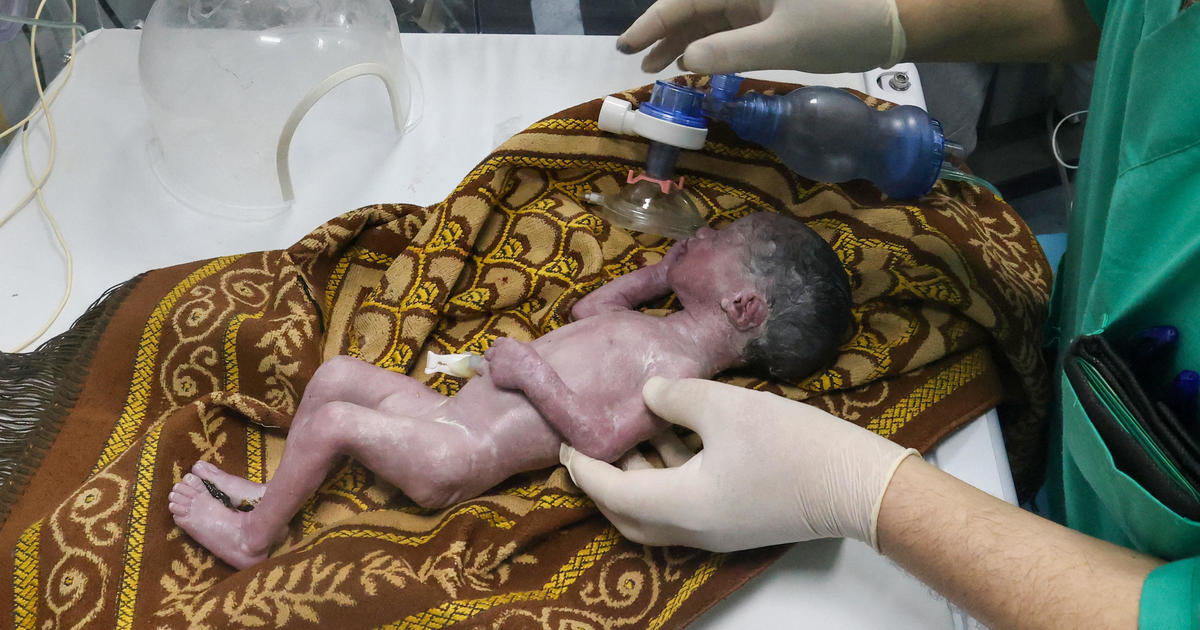
Baby girl saved from dying mother's womb dies just days later in Gaza

Attorneys for American imprisoned by Taliban file urgent petitions with U.N.

Grizzly bears to be restored to U.S. region where they were wiped out

IMAGES
VIDEO
COMMENTS
Locals Make Planning a Trip to Cuba Easy; More Tips for Cuba Travel in 2024; Who Needs A Cuban Tourist Card. Travelers from every country, including the United States, need a Cuban Tourist Card to visit the island. The Cuba Tourist Card allows travelers to remain in Cuba for 30 days, and after arrival can be renewed for an additional 30 days.
The tourist card for Cuba varies in cost. Pink tourist cards (for those traveling from the United States) generally cost $50-110 USD, and green tourist cards (for those traveling from any other country) generally cost $20-50. EasyTouristCard offers Cuban tourist cards that can be ordered online and sent to your home; pink tourist cards cost ...
Buy it From Your Country's Cuban Embassy or Consulate. This is the hardest way to buy the Cuba Tourist Visa since you have to go in person with the necessary paperwork. Price varies depending on the embassy, but you can expect to pay between $35 and $75 for the card. 4. Buy it from your travel agency.
Yes! Citizens of the United States need a tourist visa for Cuba. The government of Cuba requires that ALL non-Cuban visitors to the island have a tourist visa - also known as a tourist card - before arriving. There is no special Cuba visa for Americans; everyone needs the same tourist visa! Special regulations restricting the travel of ...
For Latin American citizens, a valid passport is required during your stay in Cuba. You'll also need to obtain a tourist visa or tourist card for your trip. This can be processed at tourism agencies or airlines, which usually handle its issuance. The visa is generally issued for about 90 days and can then be extended.
To enter Cuba, all visitors need to present a completed Tourist Card — which serves a similar function to a tourist visa. These are usually available through your airline (ask when booking). Alternatively, you can purchase one through a Cuban travel agency. Costs range from US$50 to US$85, including processing fees.
SIM cards with a data plan can be purchased at Havana-José Martí International Airport (HAV) and local ETESCA telecommunications offices. To ensure family and friends can reach you in Cuba, check with your mobile provider about roaming options and cost or purchase a Cuban SIM card. See the FCC Travel FAQs for more information.
Anyone who travels to Cuba for tourism purposes has to get a Cuba Tourist Visa, which is also known as a Cuba Tourist Card. As the name suggests, the Cuban Tourist Card (Tarjeta de Turismo) is a document which is separate from your passport.It is not affixed in your passport - it actually comes in the form of a card, either in a light green or pink color.
Valid visa, travel card or Cuban passport ; Cash ; You can buy a travel card online or at Miami (MIA) before departure. Buy travel card Opens another site in a new window that may not meet accessibility guidelines. Few U.S.-issued cards are accepted in Cuba and service isn't guaranteed. Contact your bank before traveling. Check-in . Online ...
Citizens of some Caribbean, Asian and European countries, including Russia, Montenegro, Serbia and Singapore, can travel visa-free to Cuba for up to 90 days with a passport that doesn't expire for at least six months. Passport holders from all other countries must purchase what is known officially as a Cuba Tourist Card, although it's often ...
Option 2: Obtain a Cuba Tourist Card through a Travel Agency: Another convenient option is to obtain a Cuba Tourist Card through a travel agency. Many agencies offer services to assist with visa applications and can provide you with a Tourist Card. You can either visit their office in person or apply online, depending on the agency's procedure.
2. Fill out your passenger information in advance. Cuba uses an online form called D'Viajeros to gather traveler information, including immigration and health data, in advance of travel. Fill out the form digitally up to 72 hours before your arrival in Cuba. 3.
The Cost of a Cuban Visa. The cost of a Cuban visa can vary depending on several factors, including your nationality, the method of application, and the specific travel agency or airline you choose. If you choose to apply for a visa through our website at Easy Tourist Card, the fees are as follows: Pink Tourist Card - 100 USD.
U.S. law states that those who want to go to Cuba need to qualify for a "general license" based on one of 12 approved categories. The 12 categories currently authorized by U.S. government, for travel to Cuba are: Family visits. Official business of the U.S. government, foreign governments, and certain intergovernmental organizations.
For those who travel from the Rest of the World to Cuba, they must opt for a green visa. GREENfrom £27 (Ordinary Visa) Choose ... Please note that all persons, including infants, will need to apply for a tourist card before their trip. The only exception is Cuban citizens who do not require them.
To enter Cuba, your passport must have an 'expiry date' at least 6 months after the date you arrive and 3 months after your planned departure date. Check with your travel provider that your ...
Welcome. Welcome to the Online Visa Application System of the Republic of Cuba. Please, find the country where you are to fill out your application. Country where you are. Algeria. Angola. Antigua and Barbuda. Argentina. Australia.
The tourist card allows you to stay in Cuba for up to 90 days. The tourist card is generally included in holiday packages provided by tour operators or airlines providing direct flights from Canada. If you go to Cuba on your own or transit via another country, you are responsible for obtaining the tourist card from a Cuban government office in ...
Cuba is just 103 miles from the tip of Florida making it the ideal winter getaway for sun-seeking Americans. However, the U.S. imposed restrictions on travel to Cuba in 1963 and while the level of ...
Generally speaking, credit cards originating in the United States will not work in Cuba. Although no prepaid travel cards currently support Cuban pesos, preloading a currency with a good history against the Cuban pesos could be beneficial. While there are travel cards that don't charge for currency conversion, it is important to consider the ...
Travelling from Canada to Cuba, you just need a valid Canadian passport, if your passport is from another country, you need your Canadian resident card or a work or study permit that includes a multiple-entry permit attached to your passport. For Cuba, you need the tourist card (the tourist card is included in your plane ticket and is issued by ...
Top Cuban diplomat weighs in on immigration, Havana Syndrome and more 26:19. Washington — Cuba's government is willing to accept more deportation flights from the U.S. of Cuban migrants, who ...